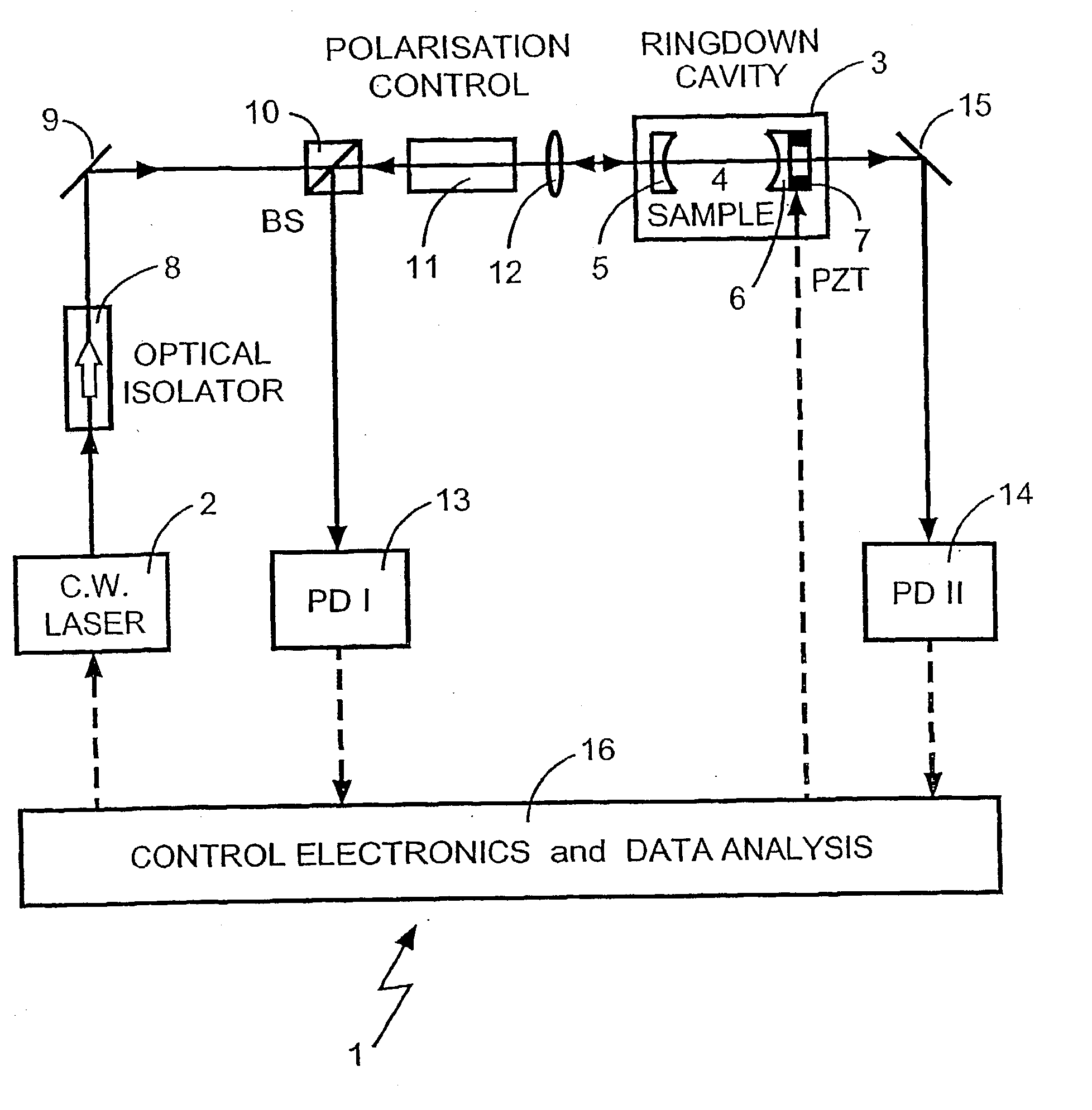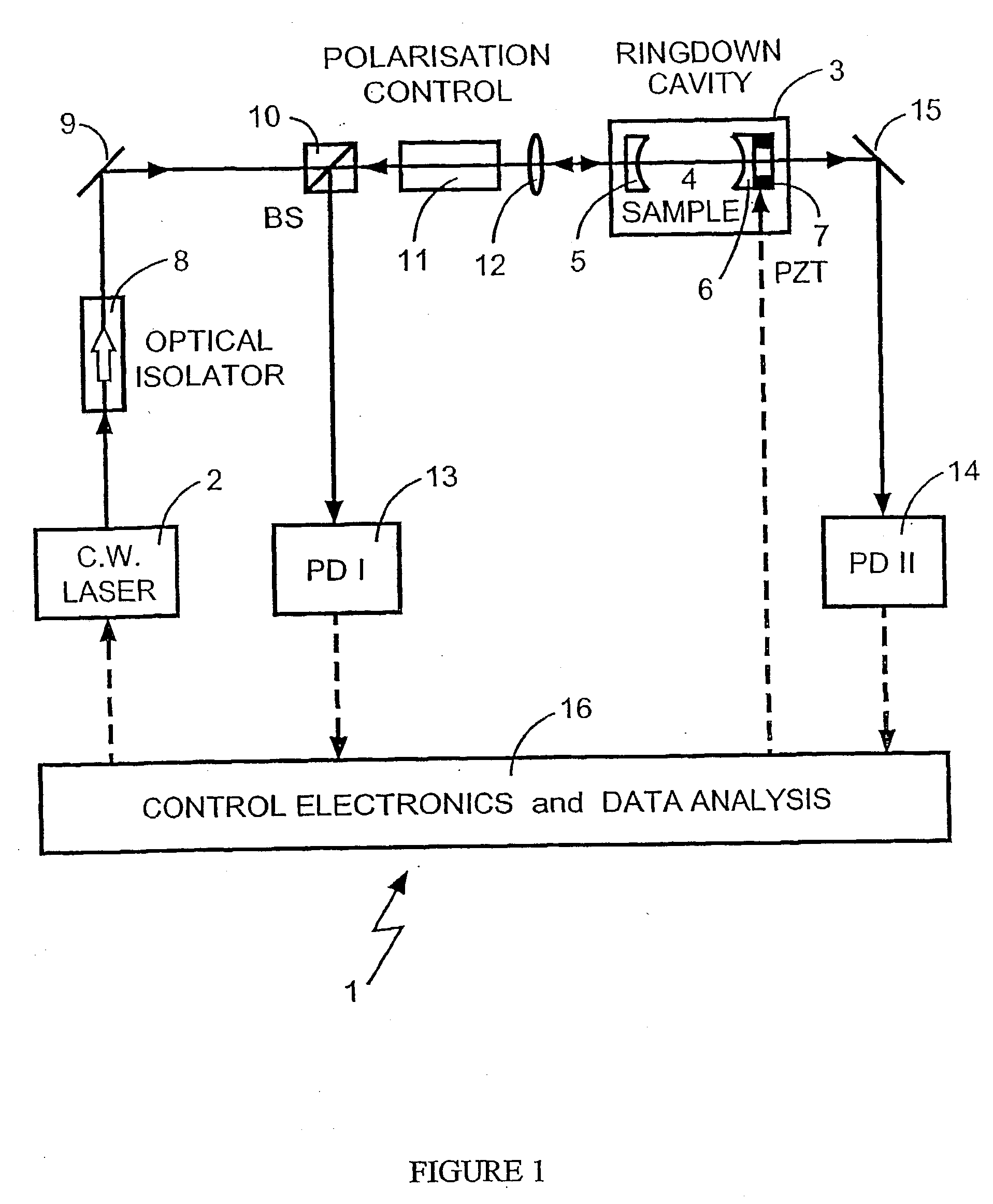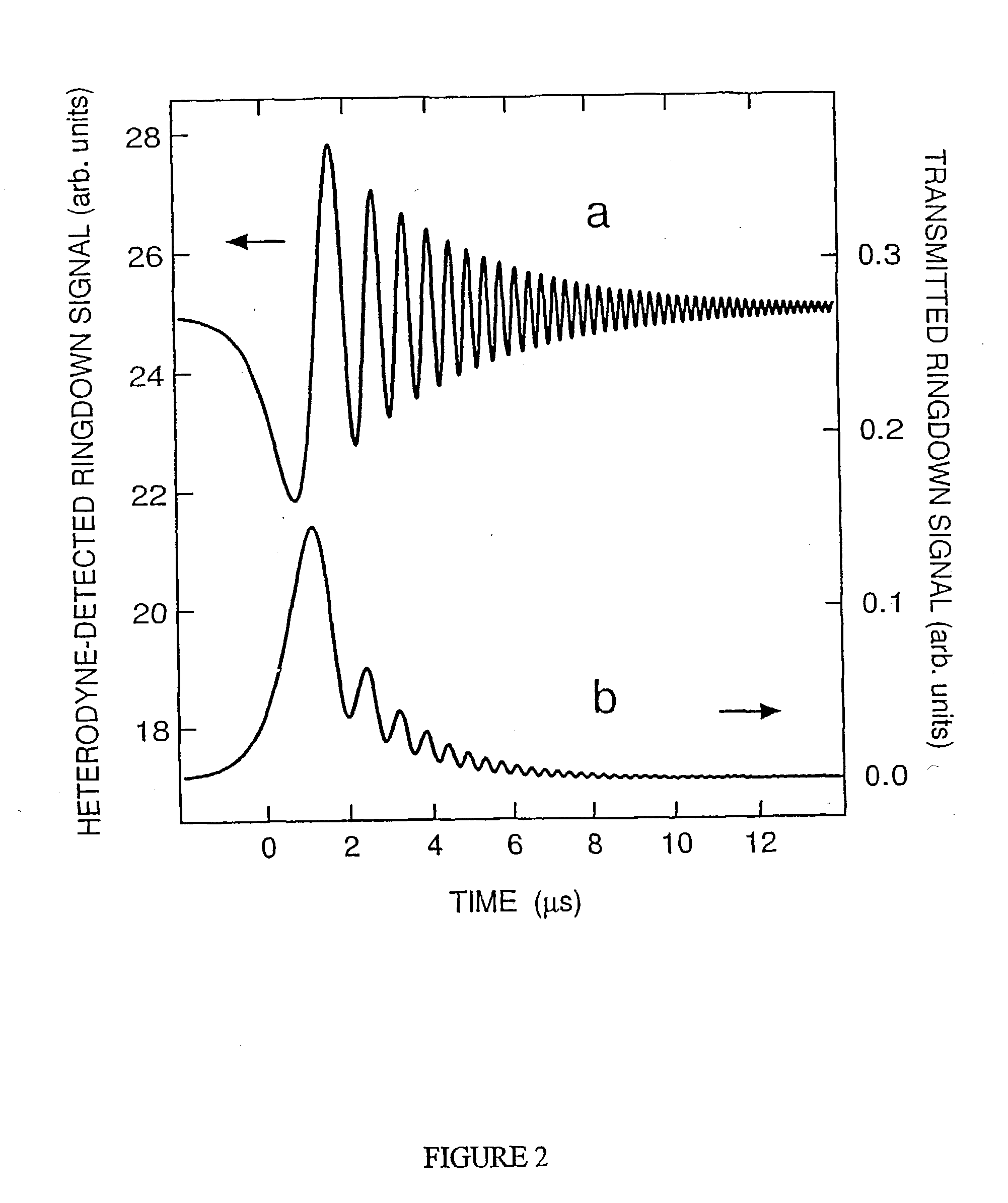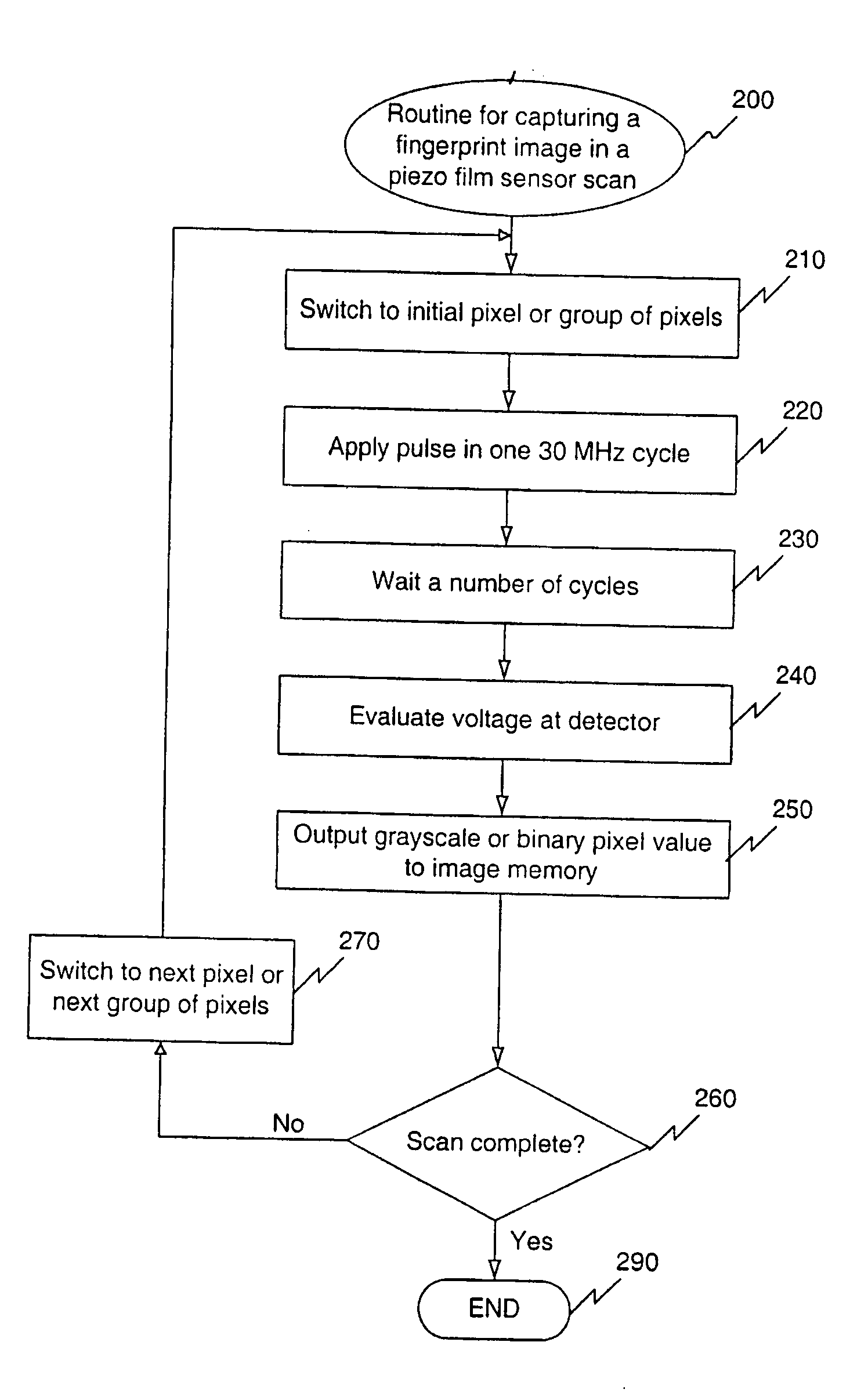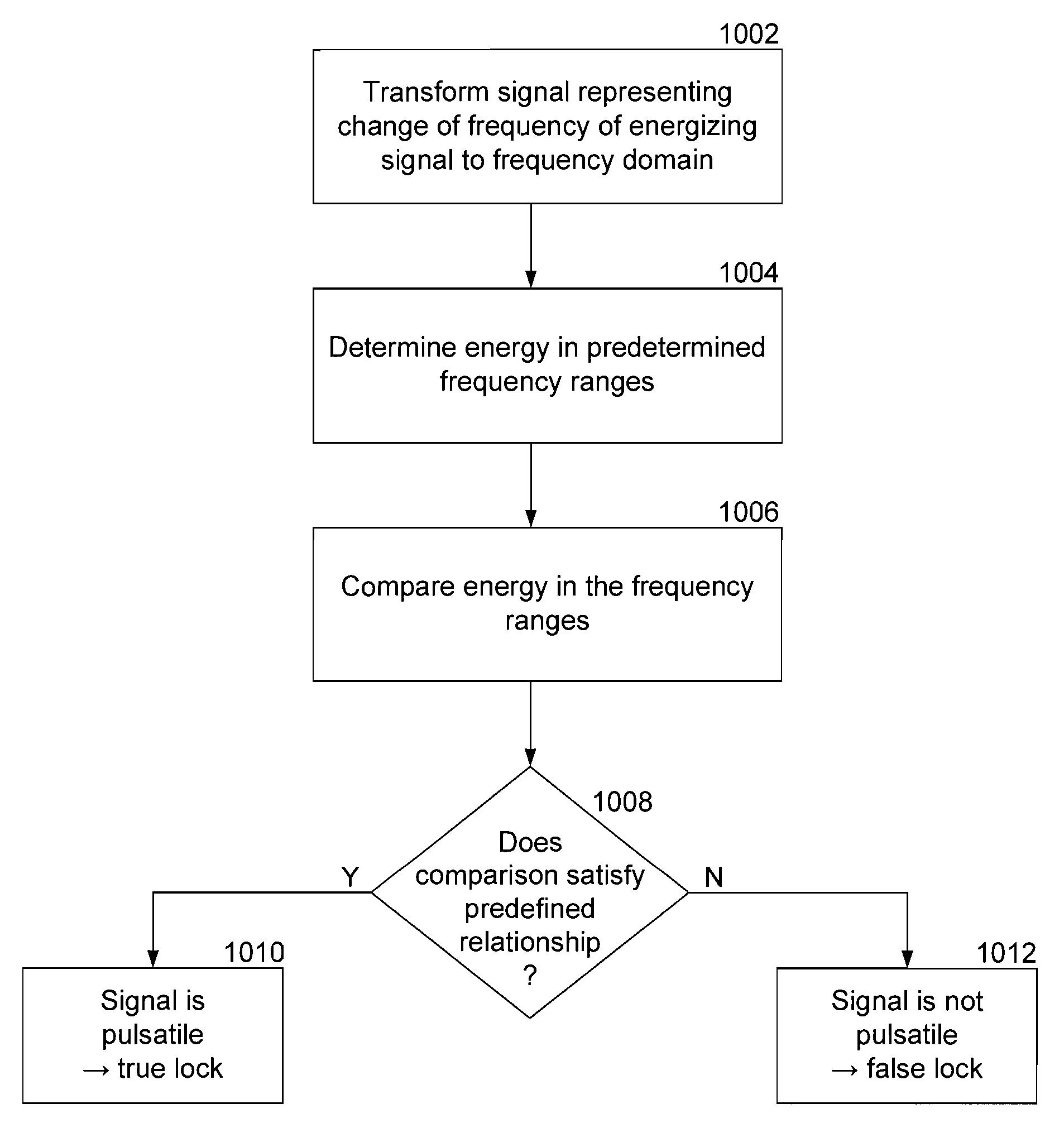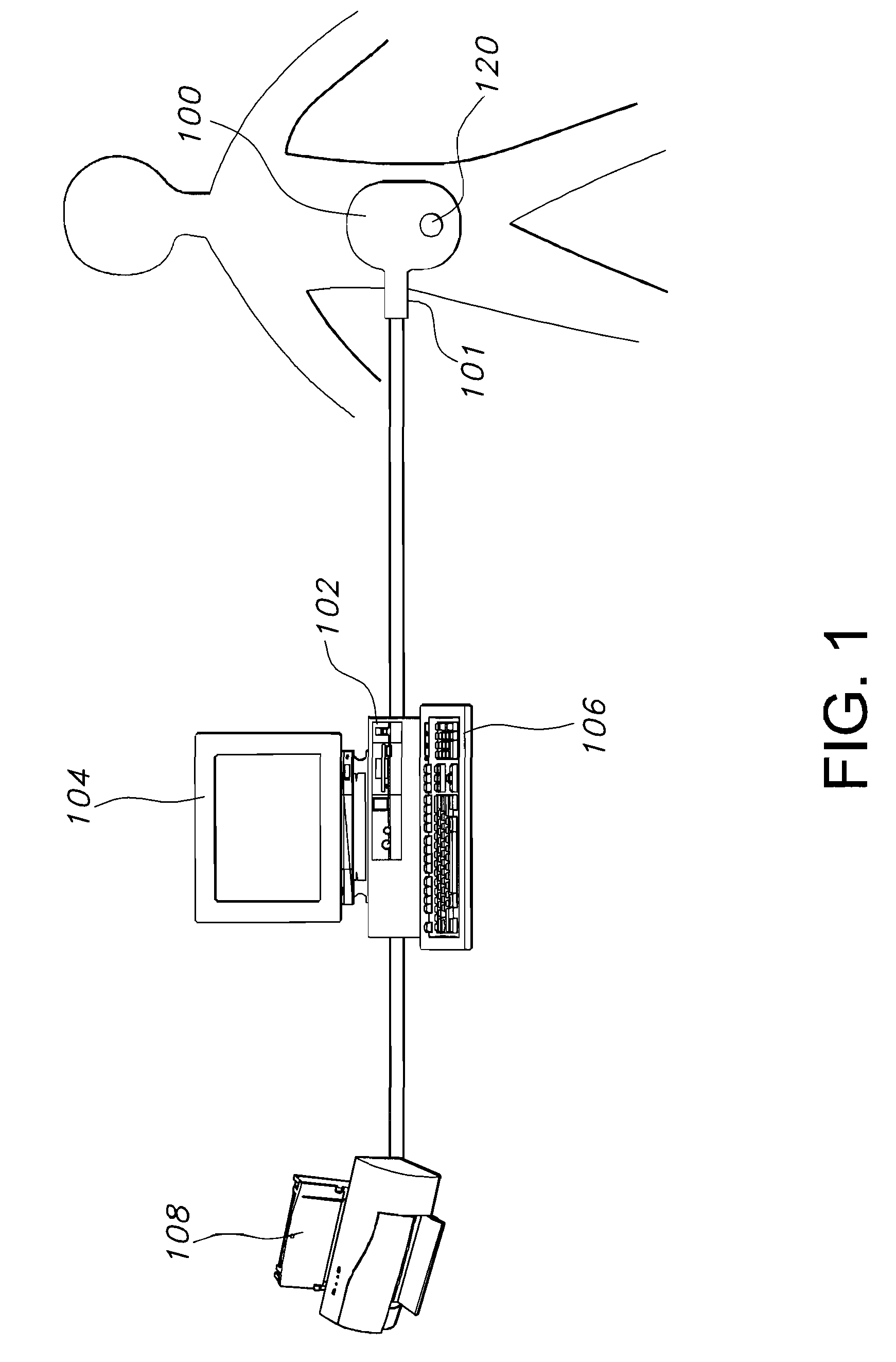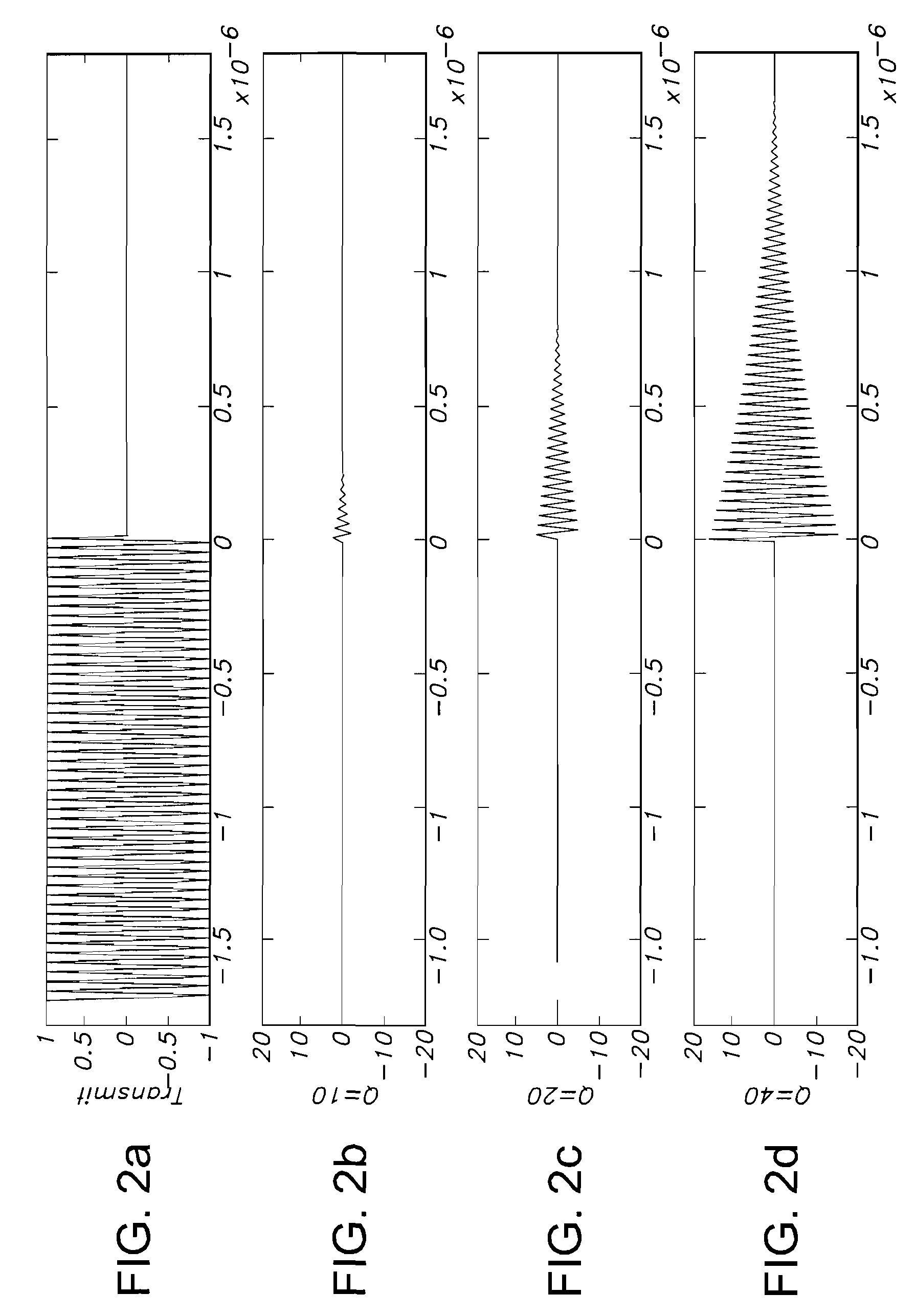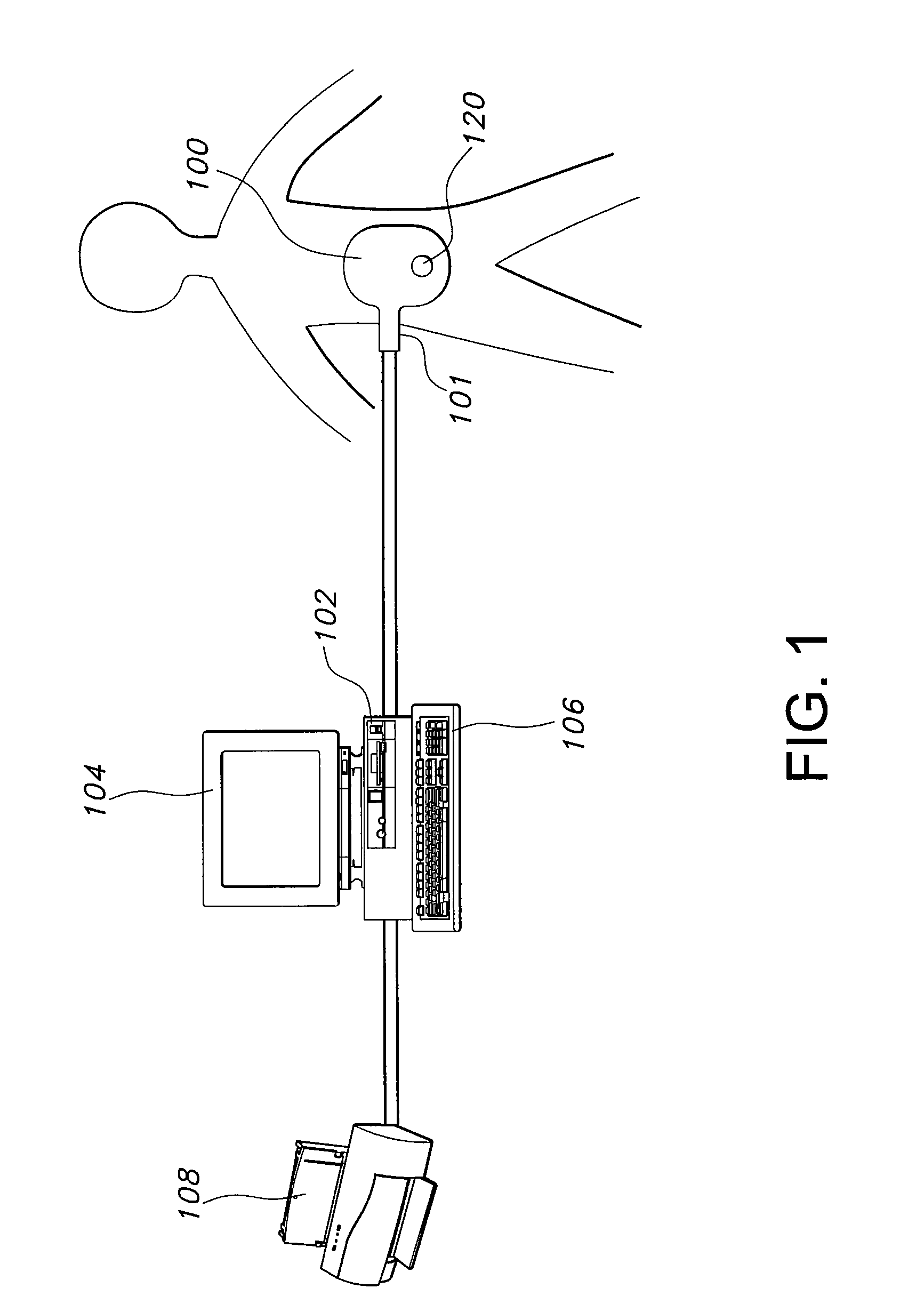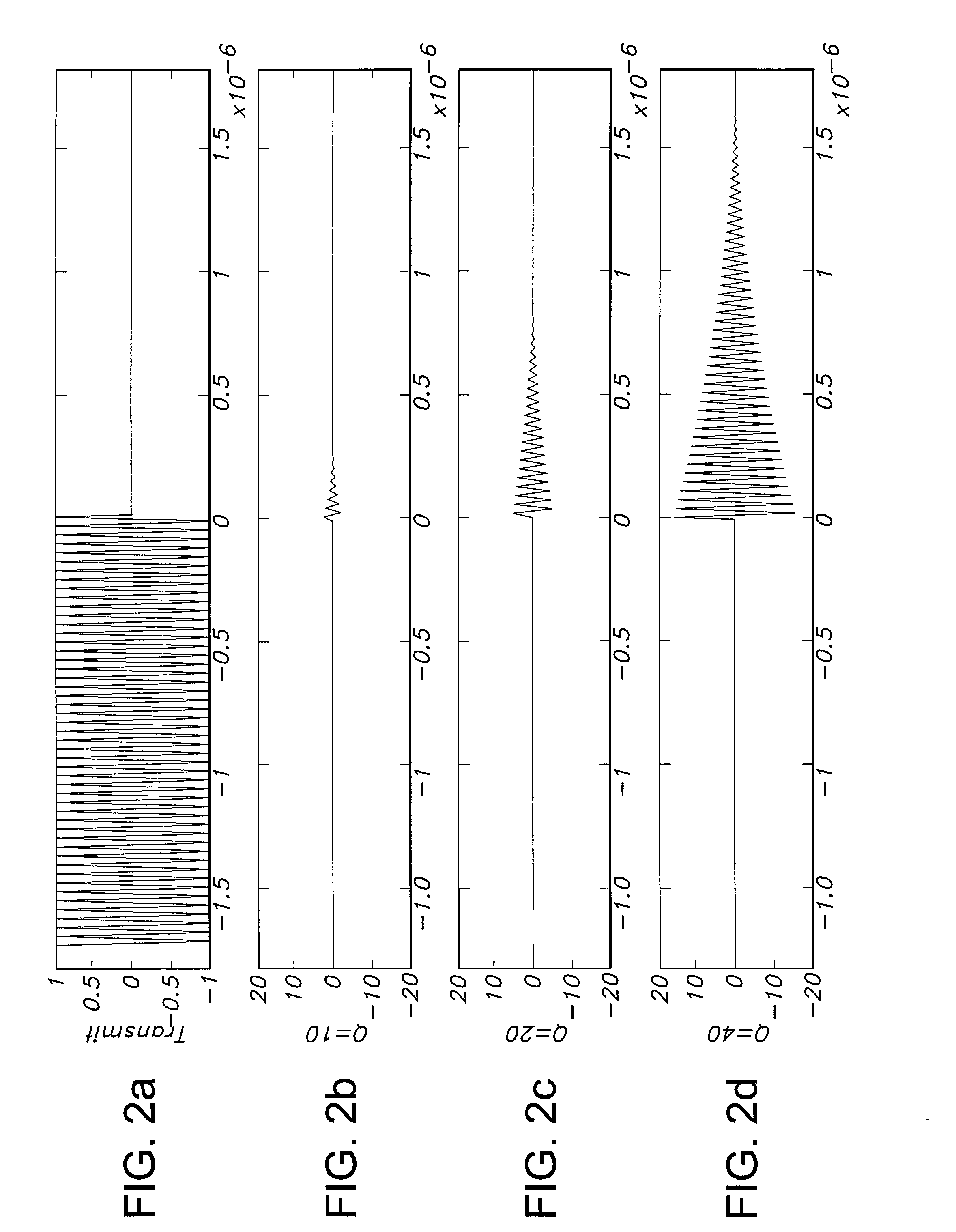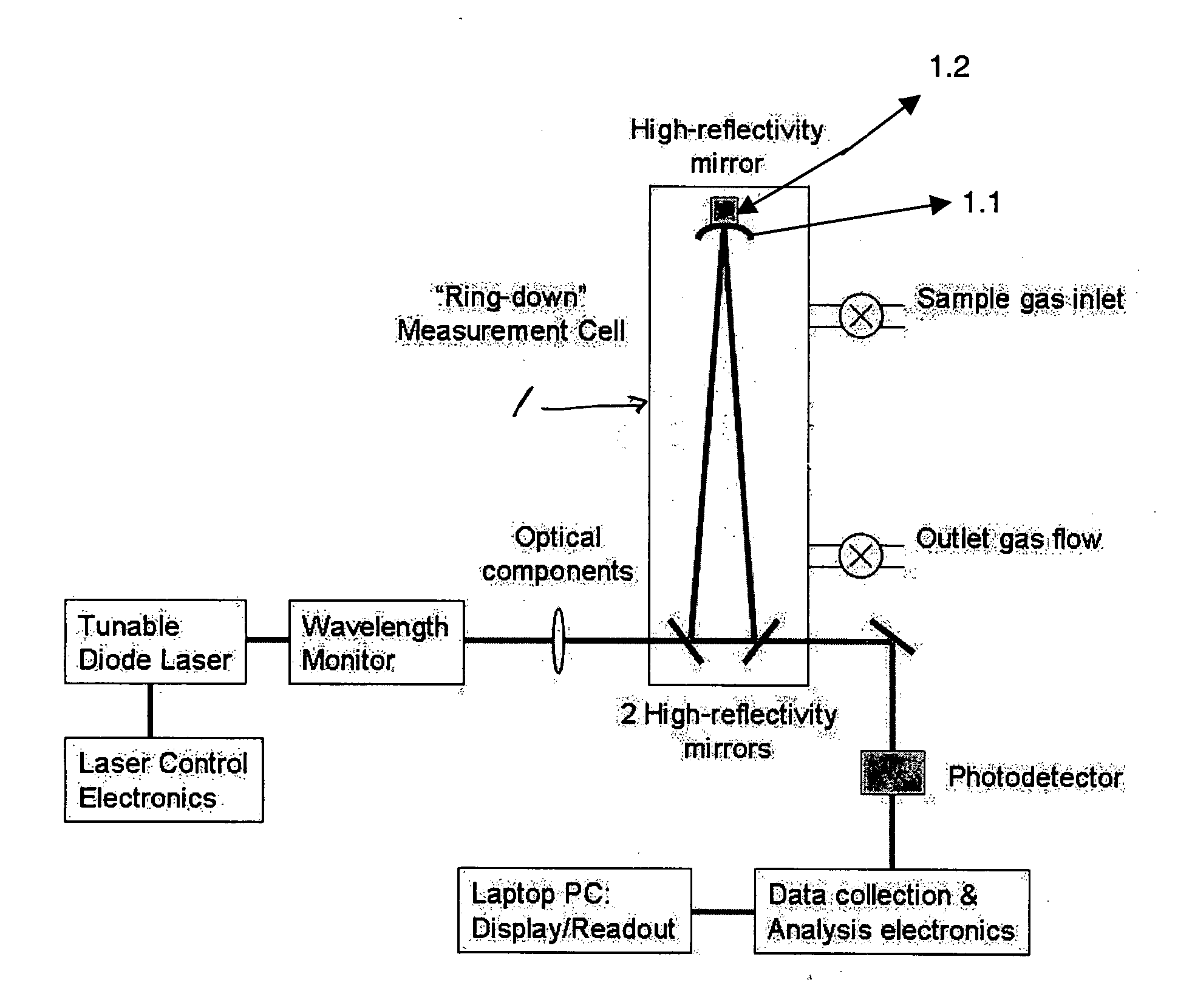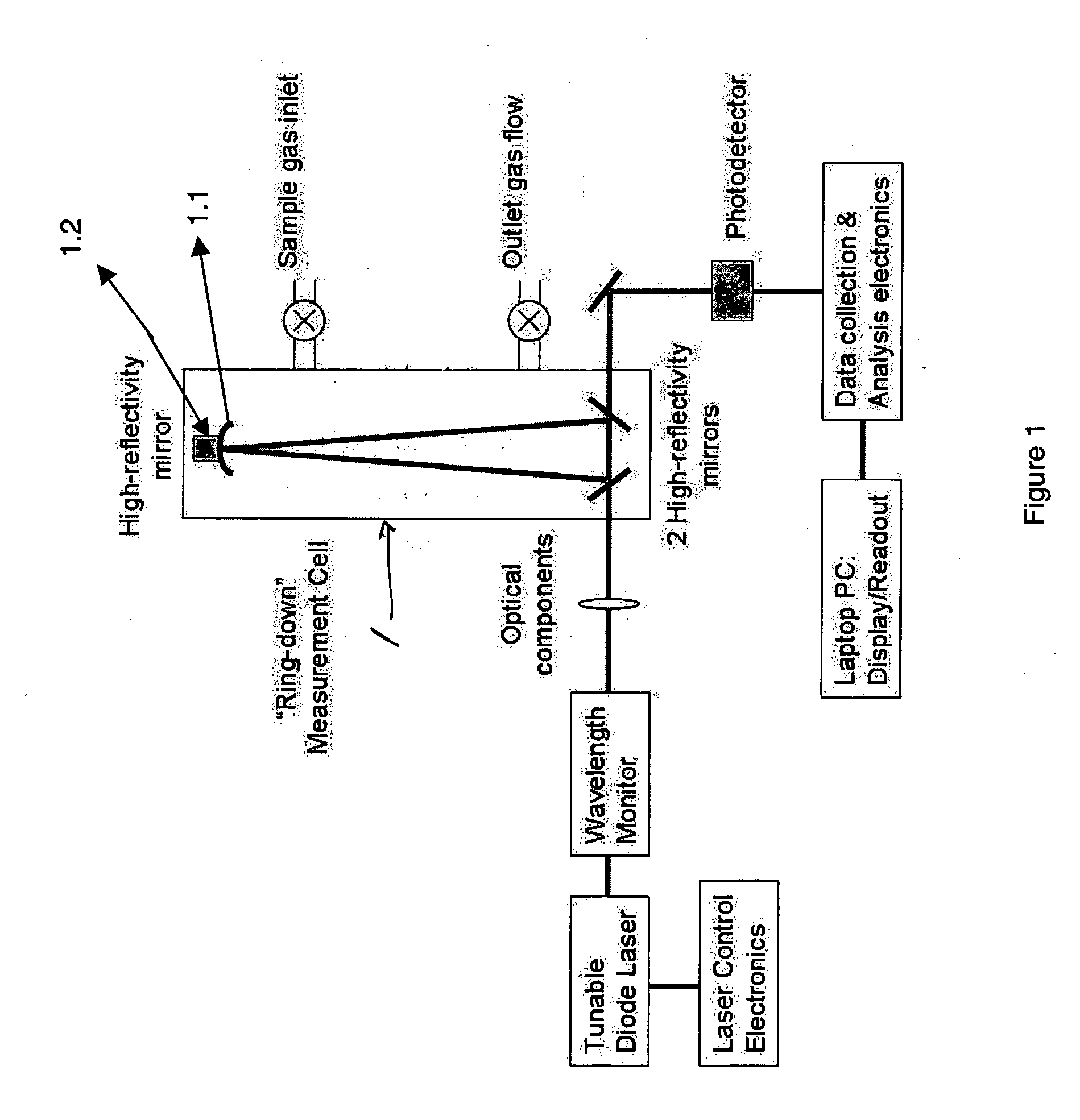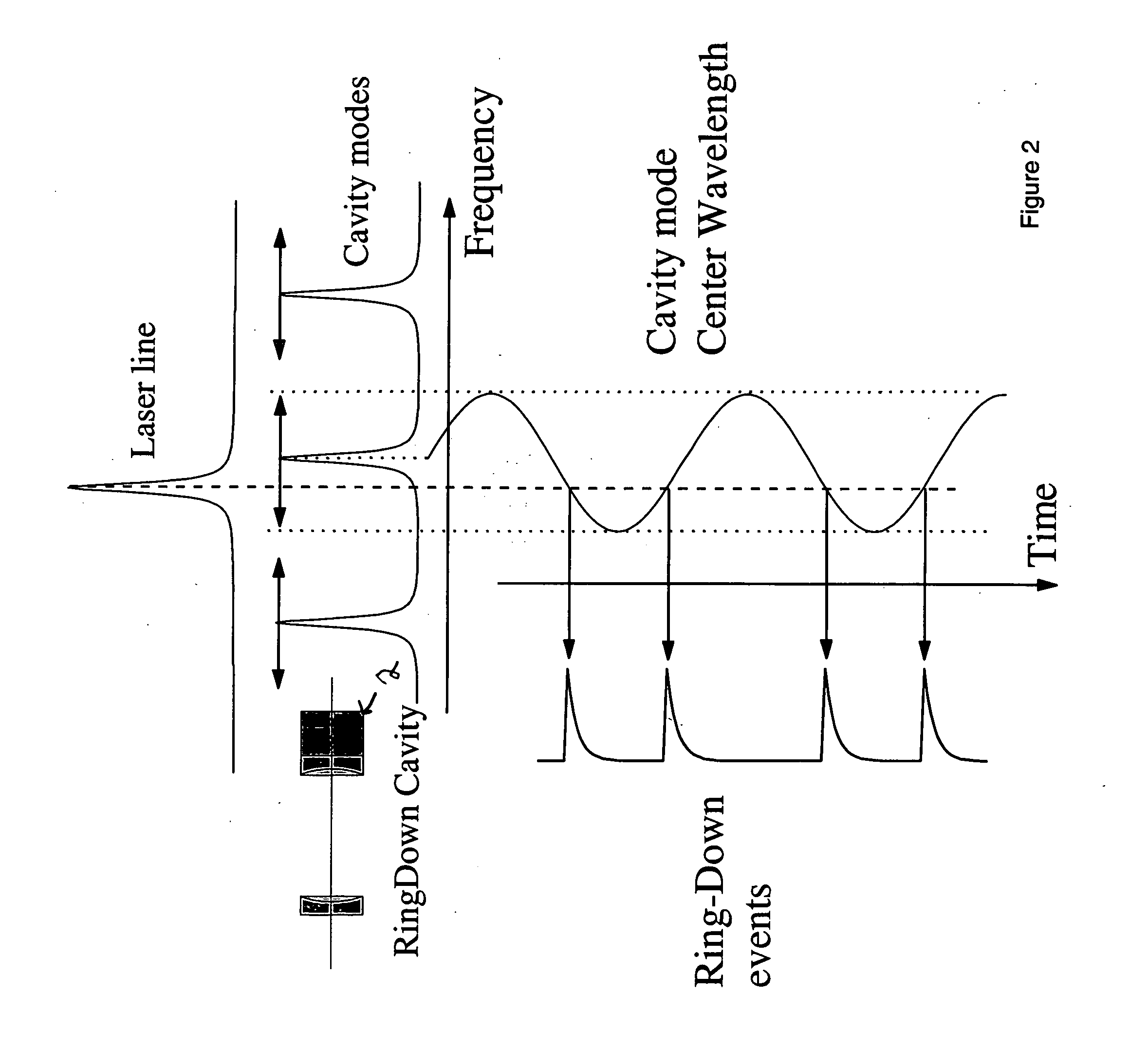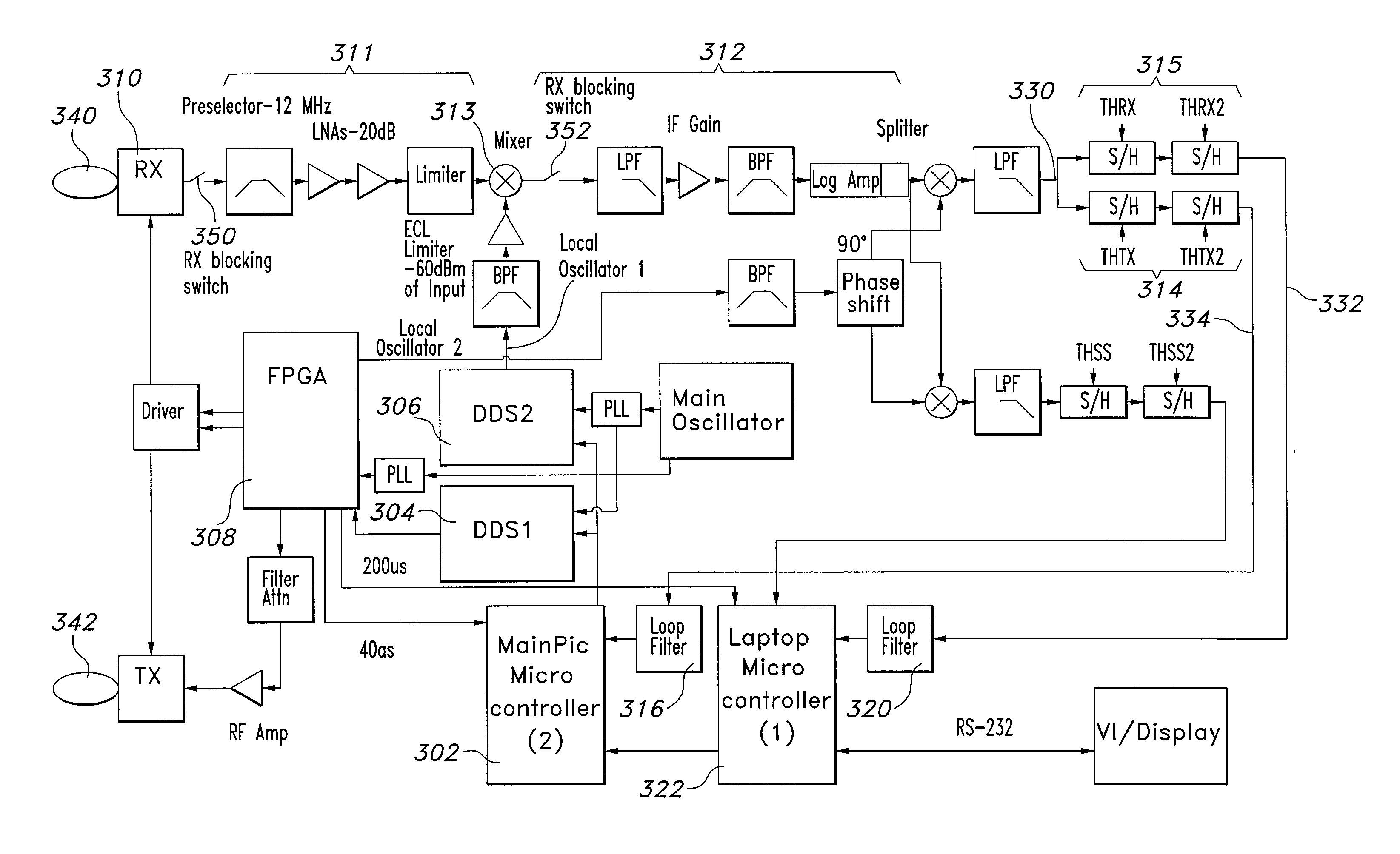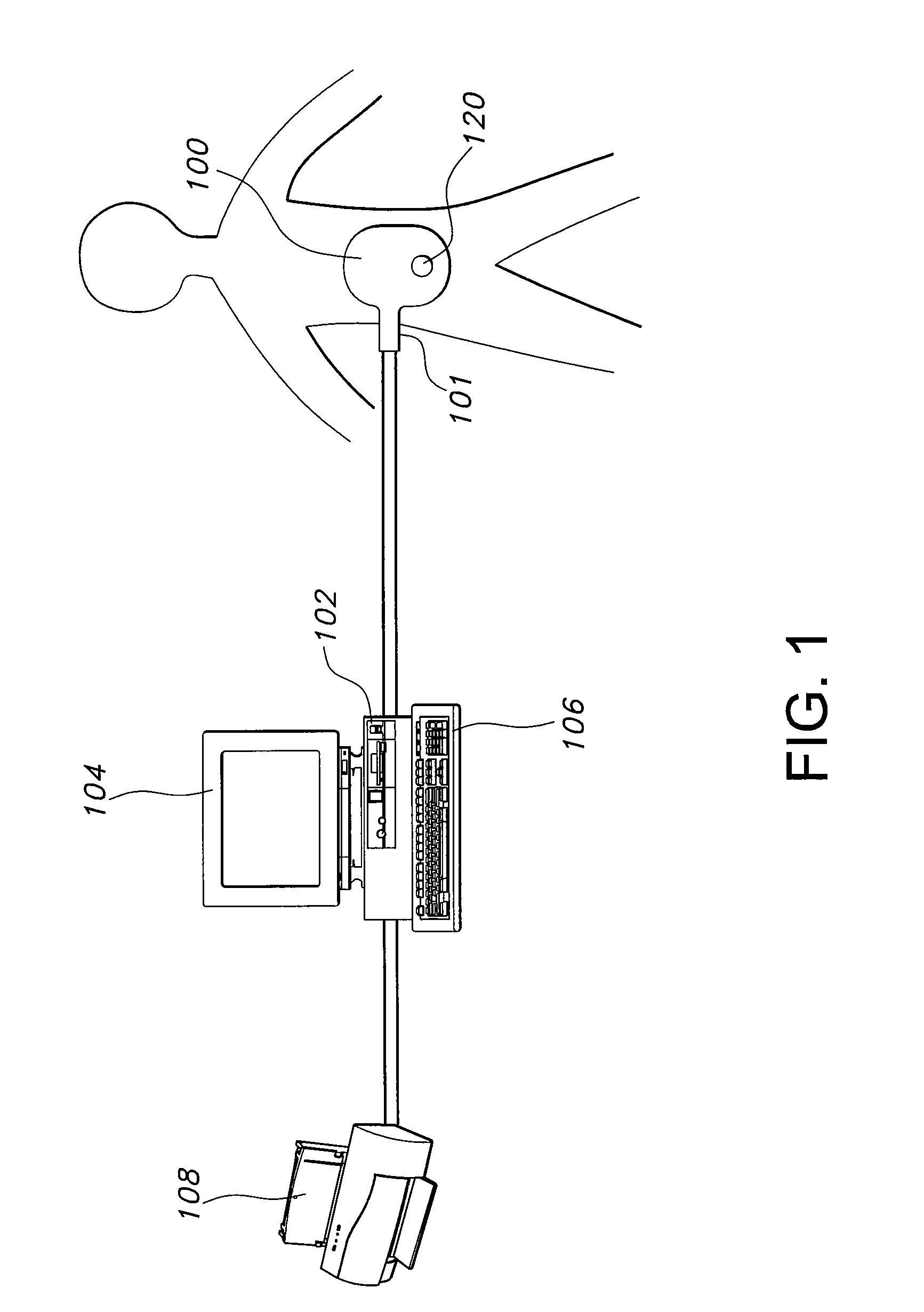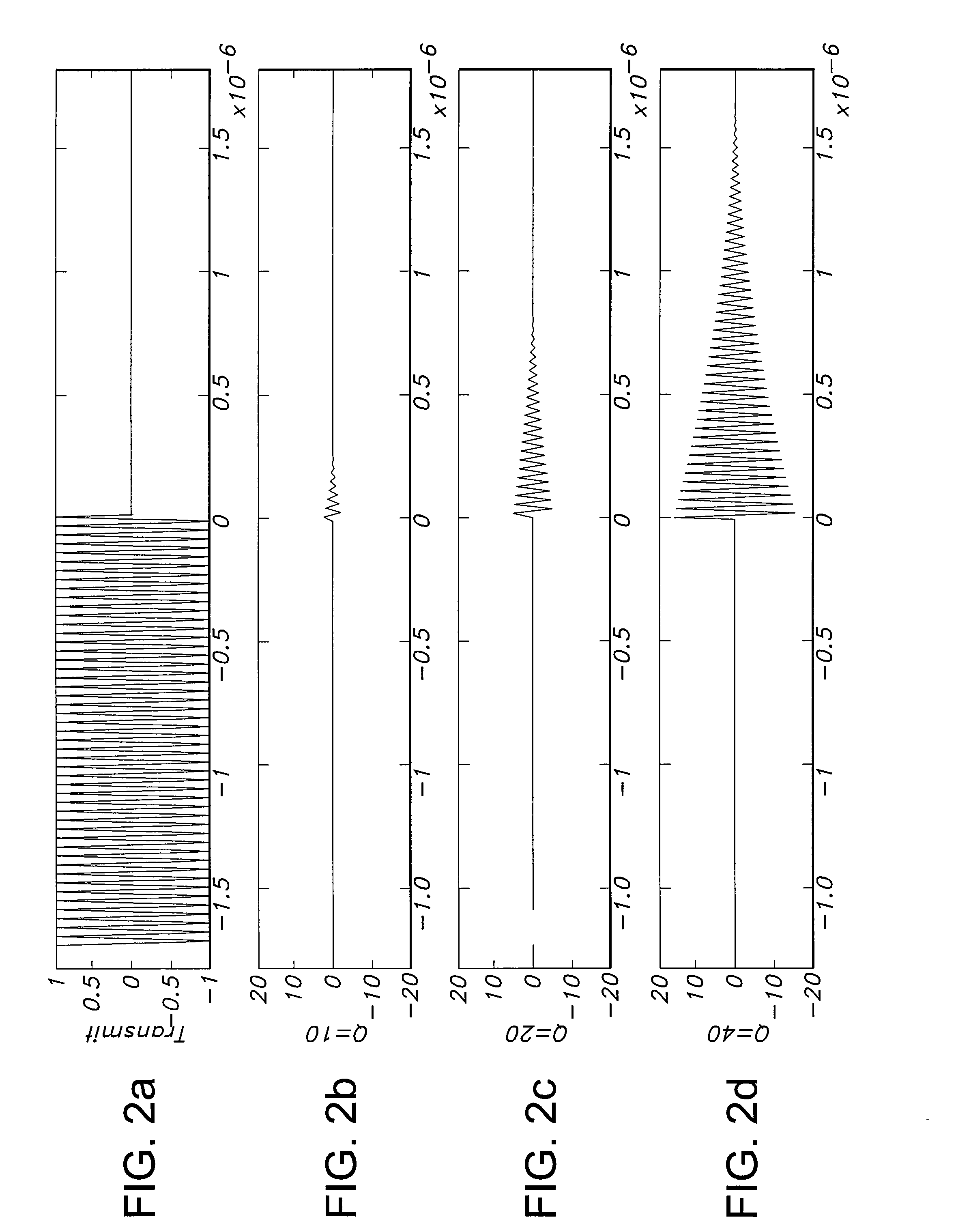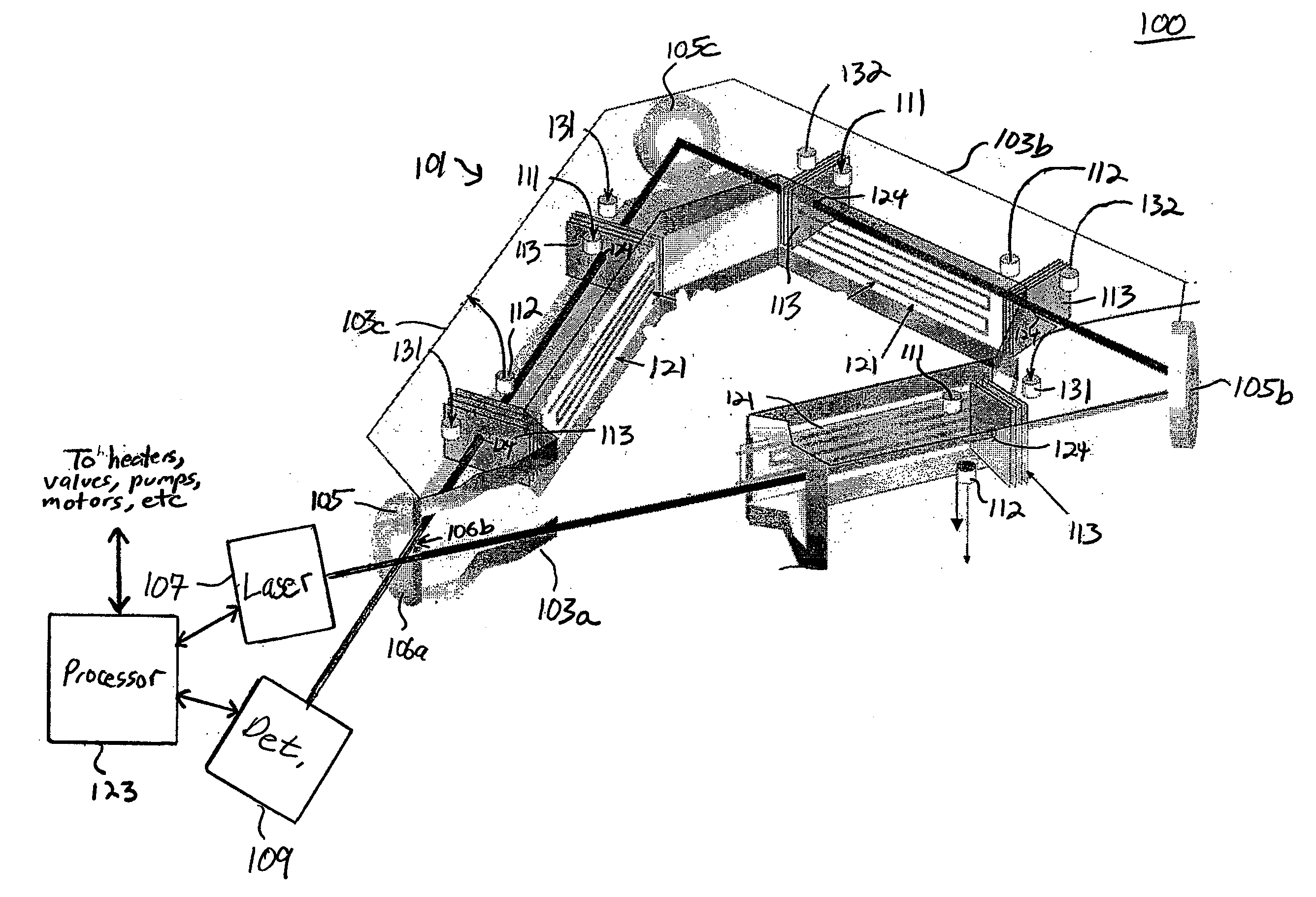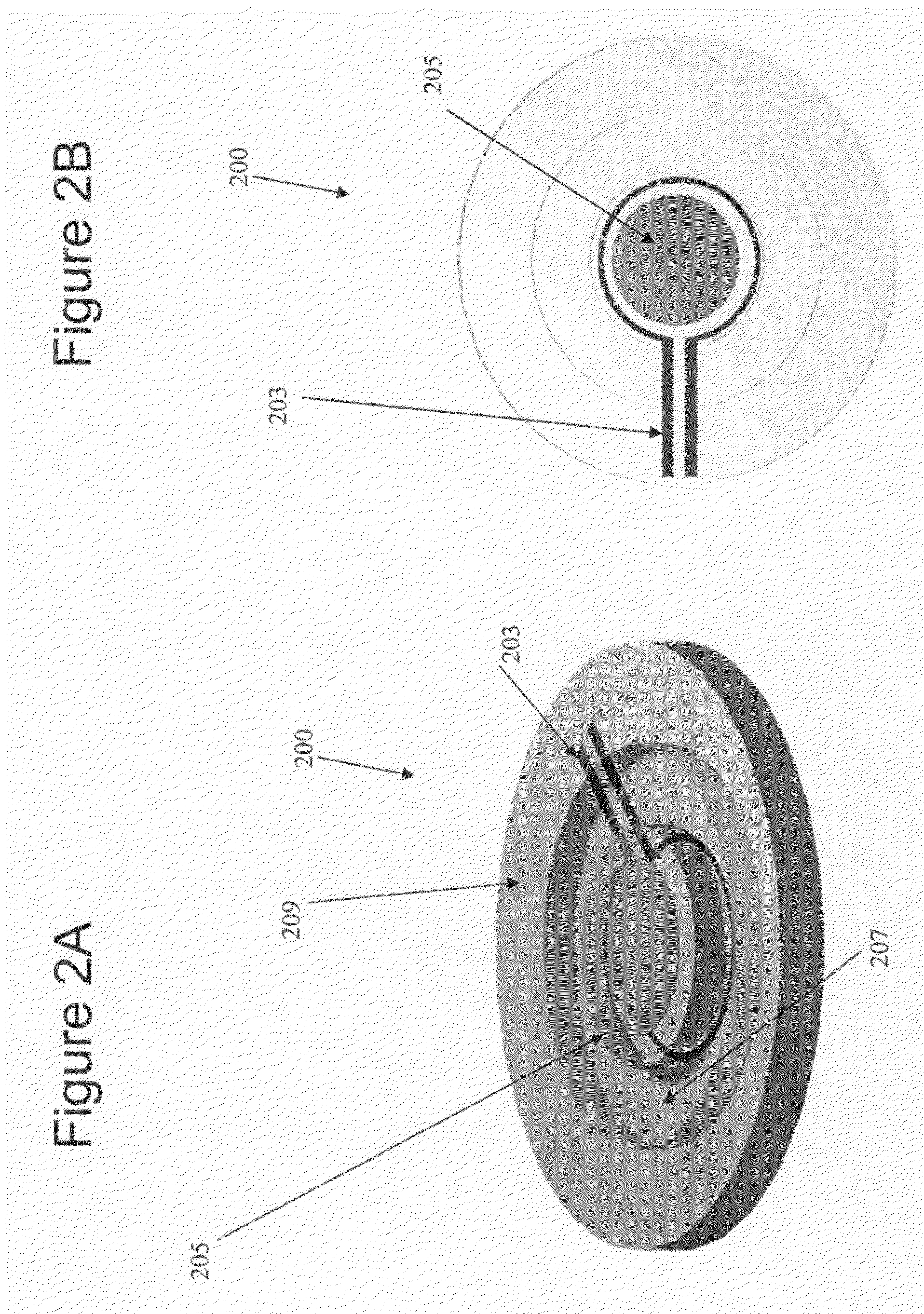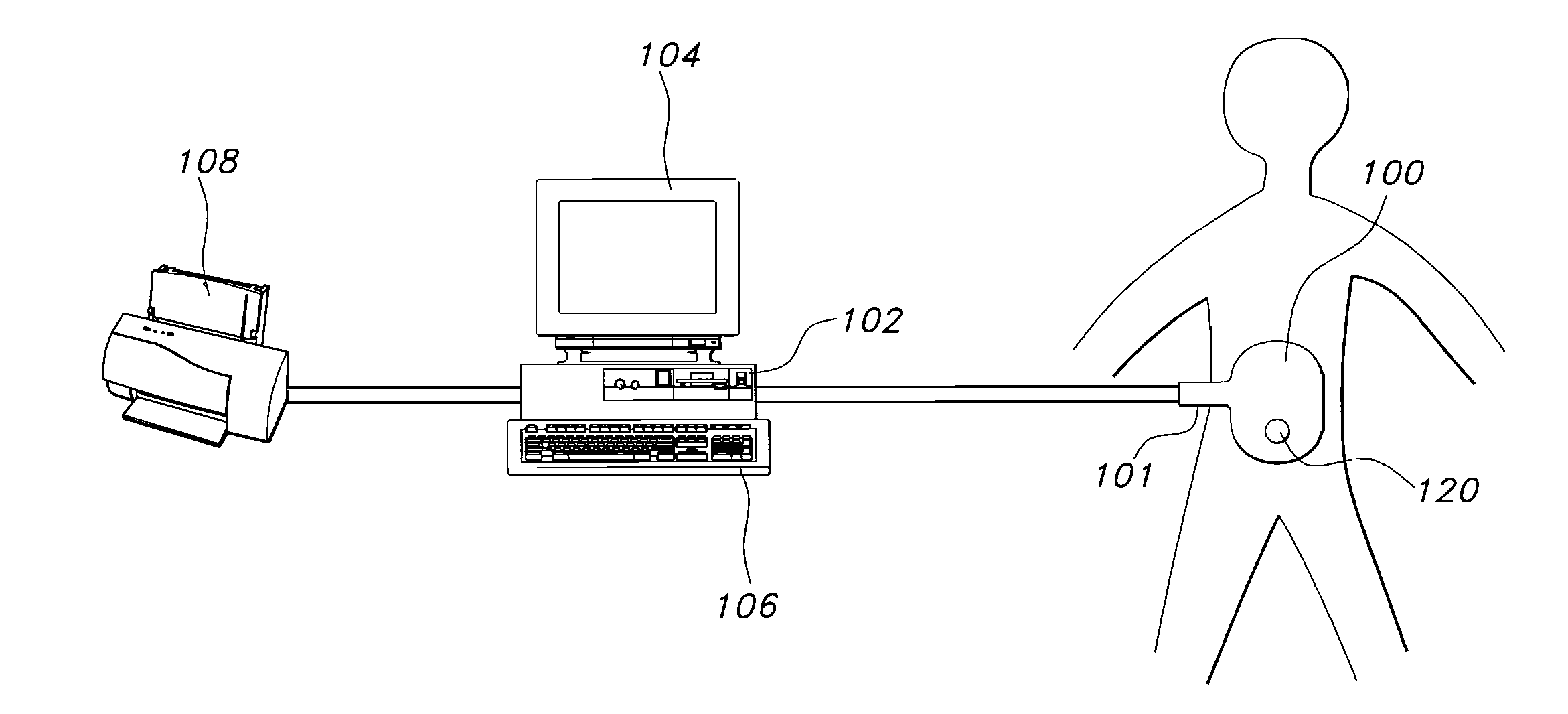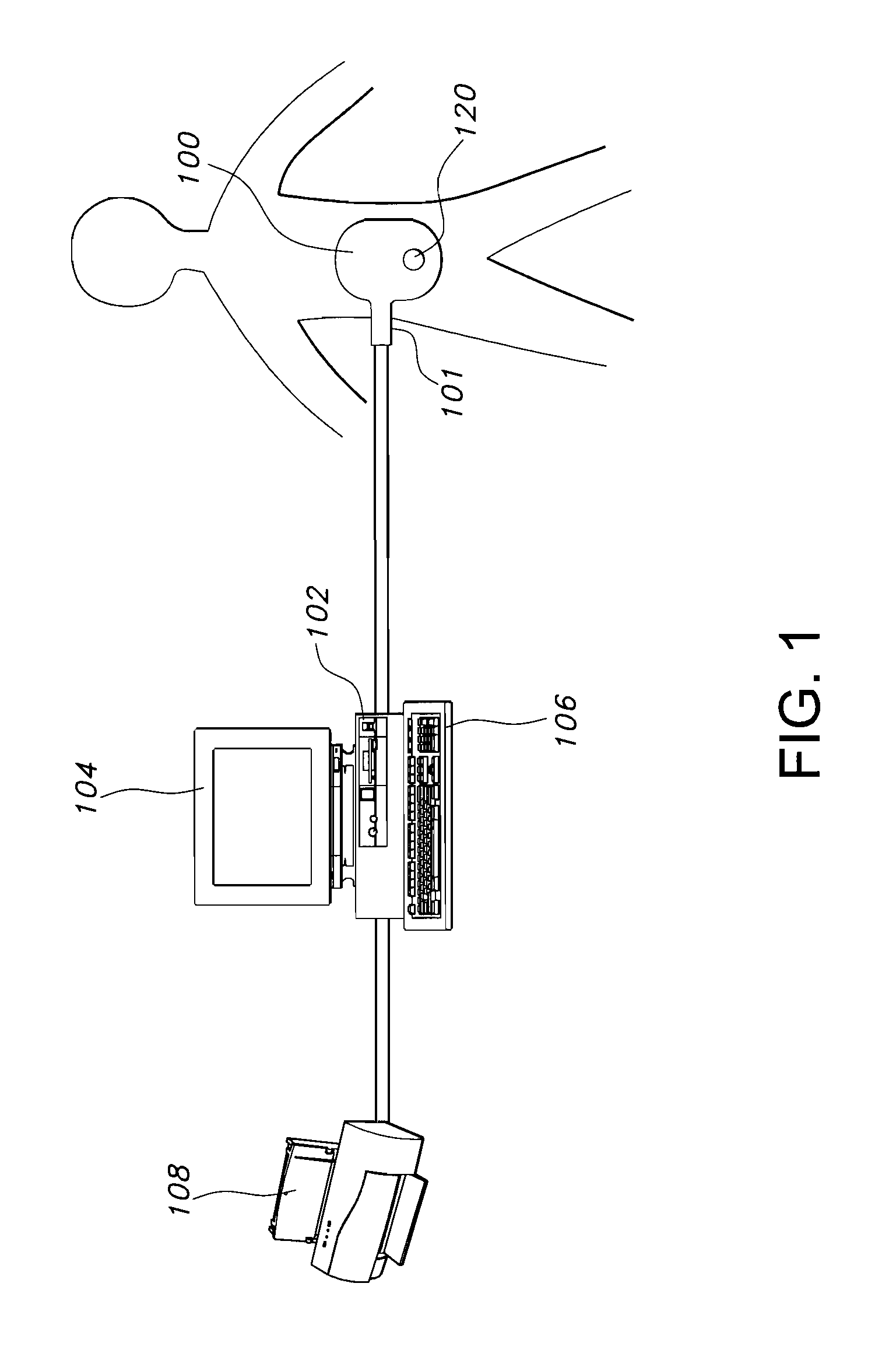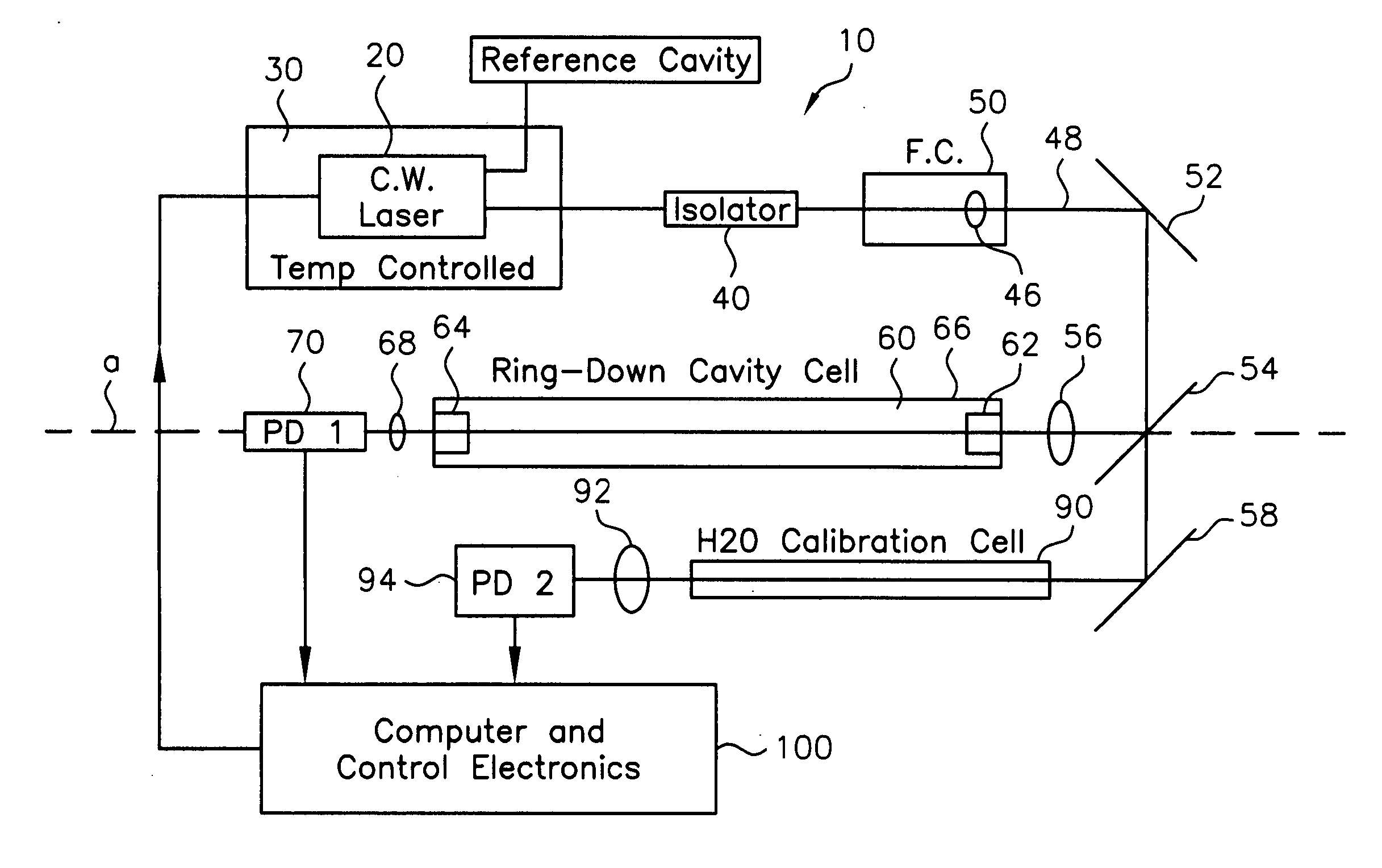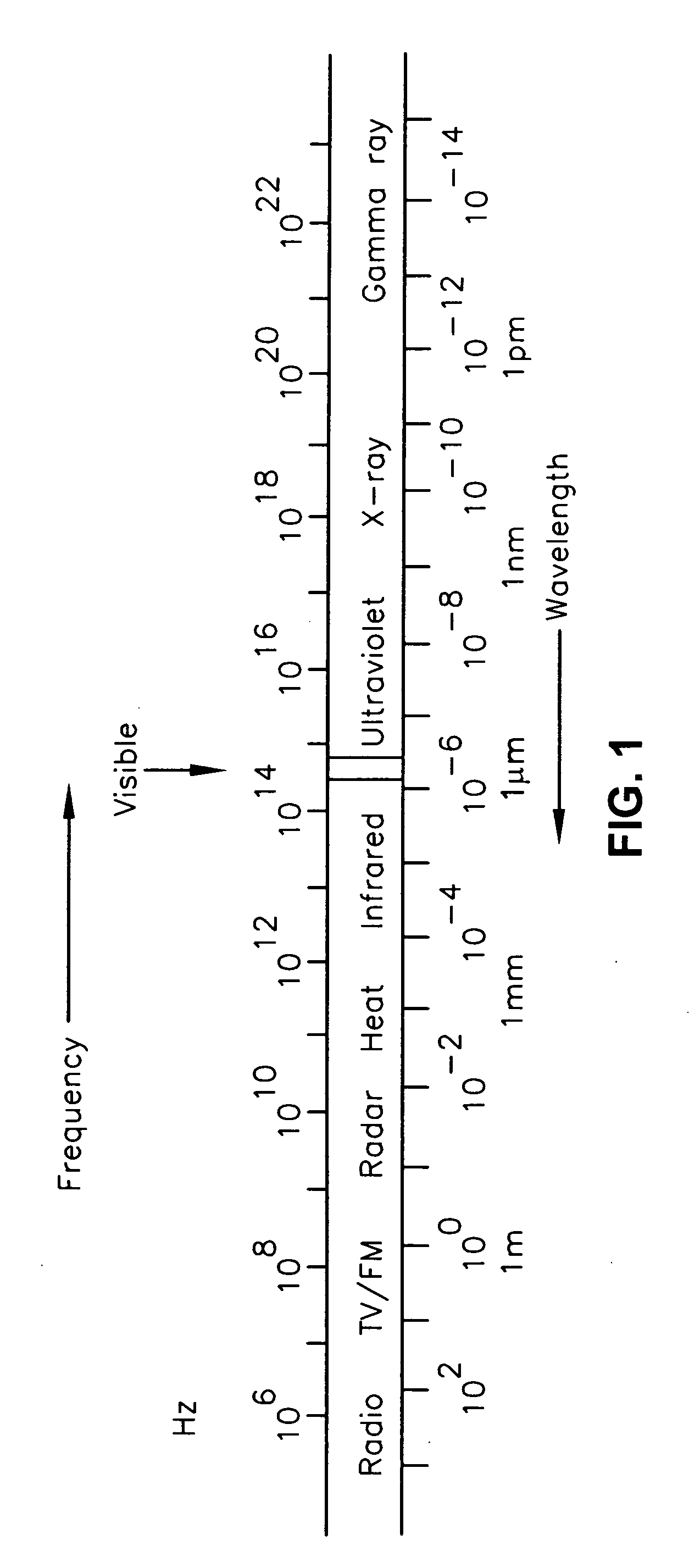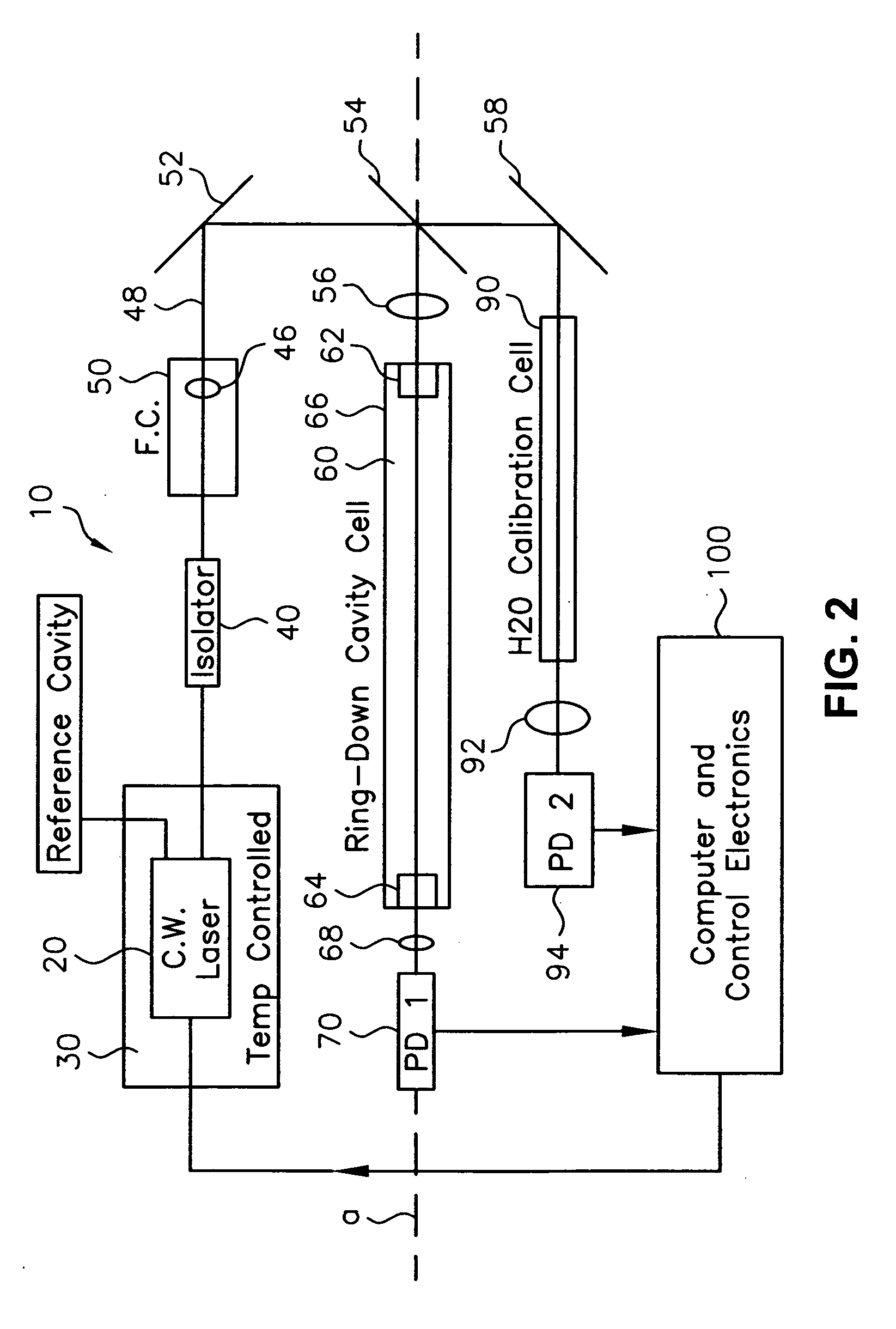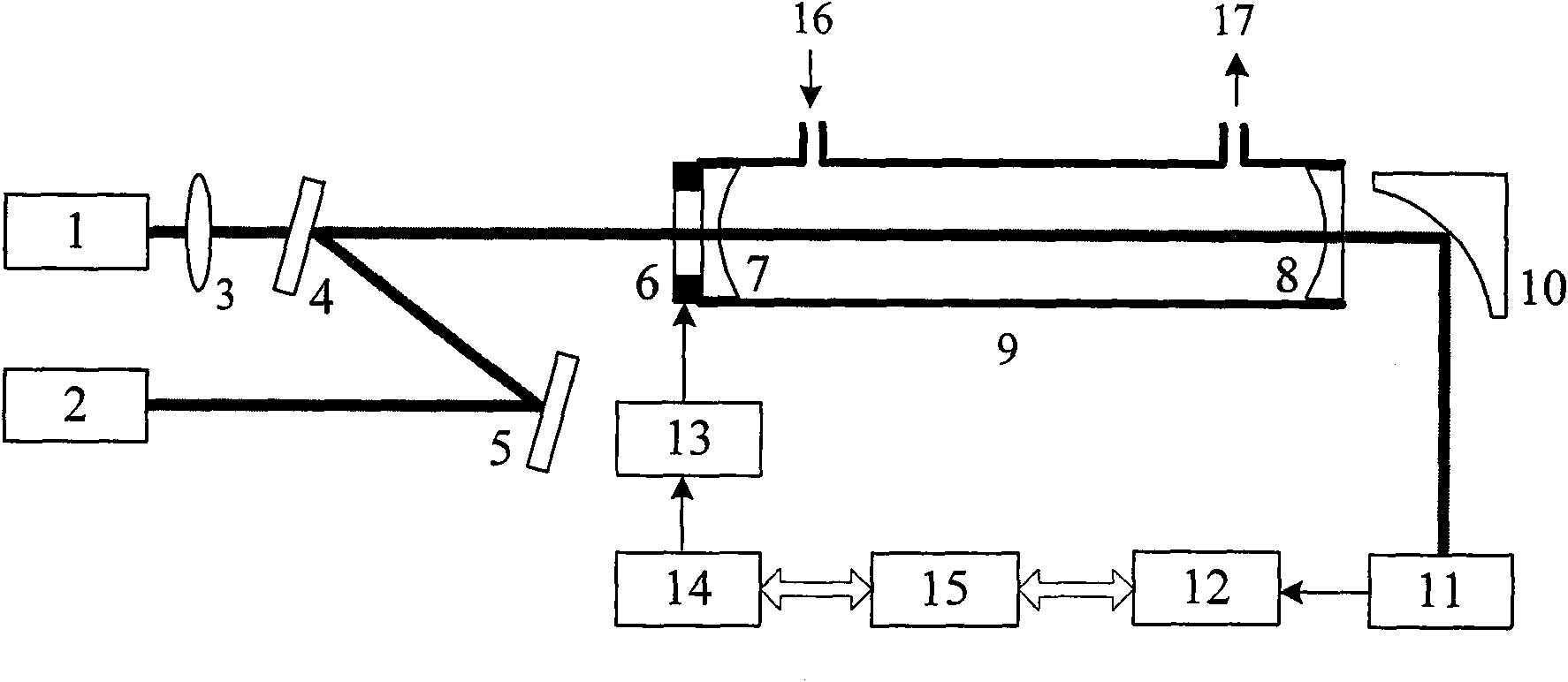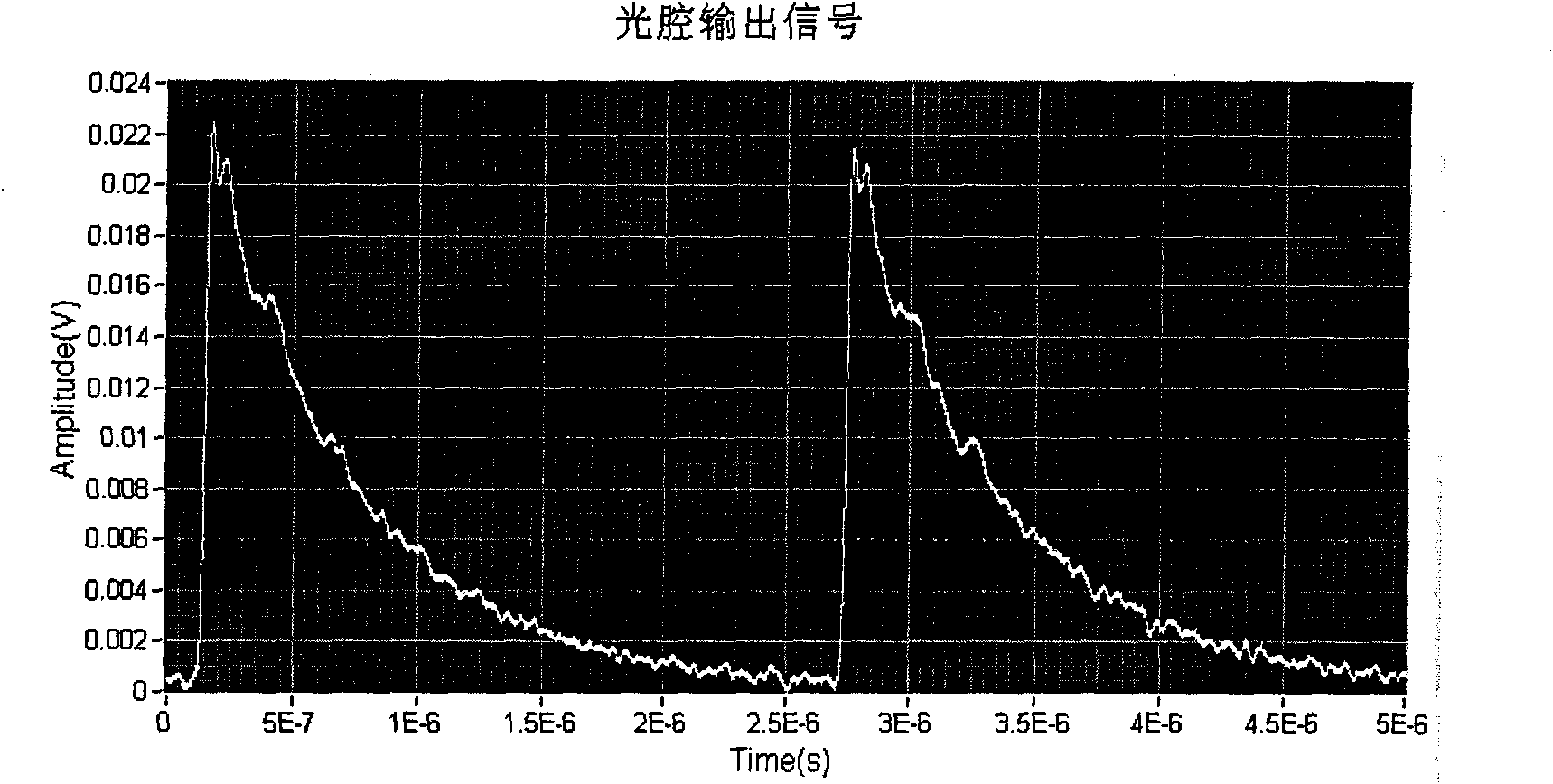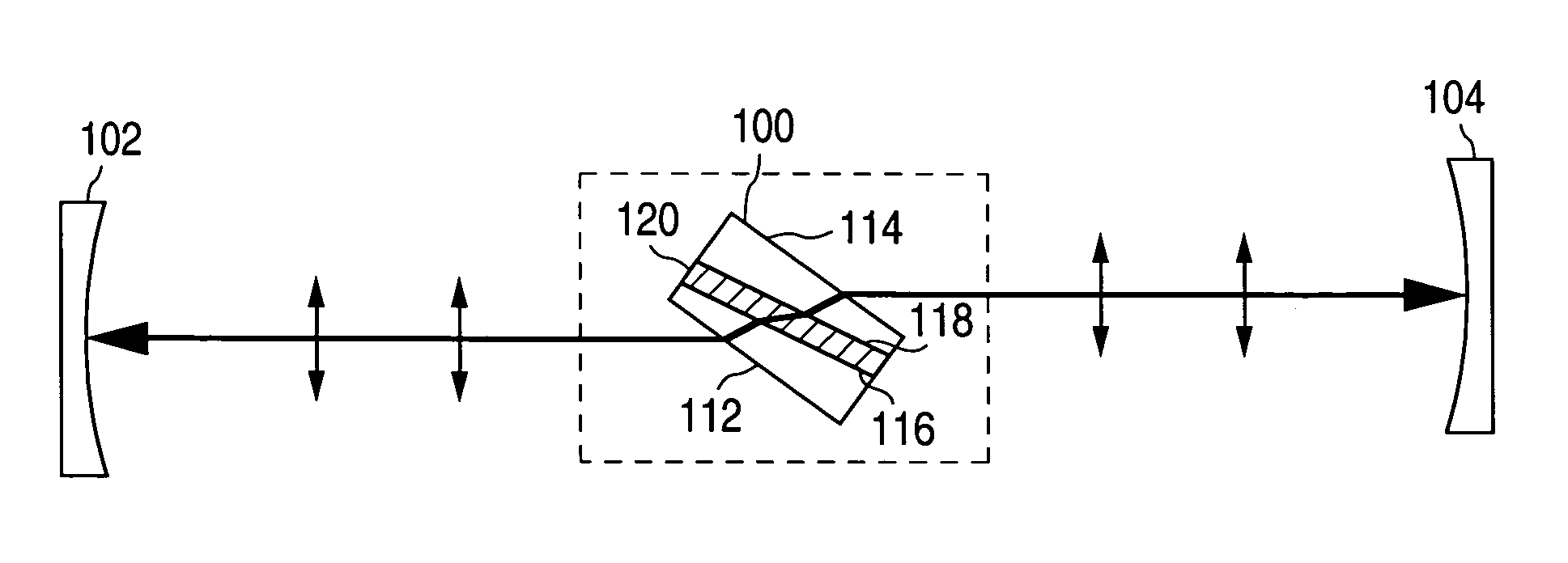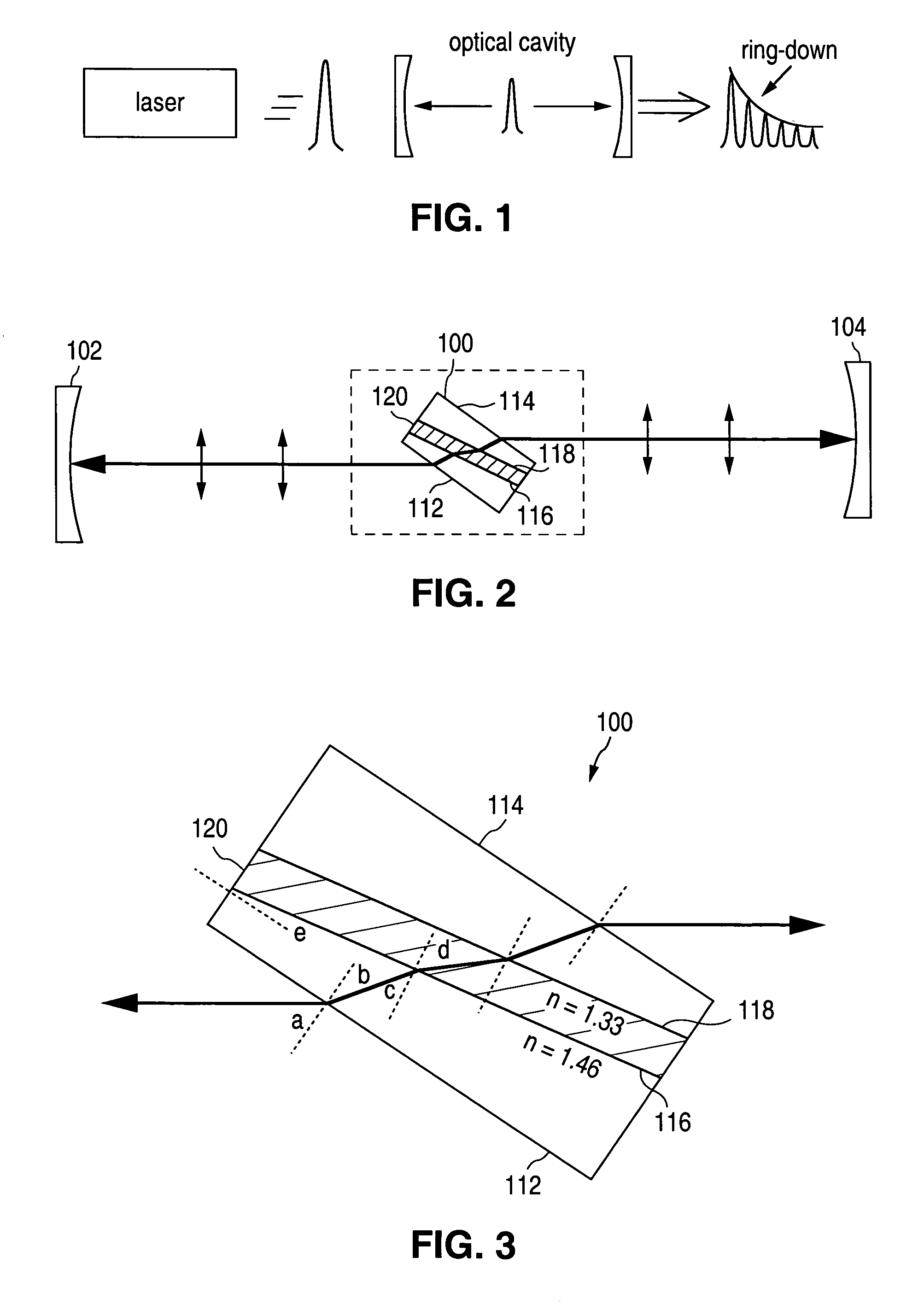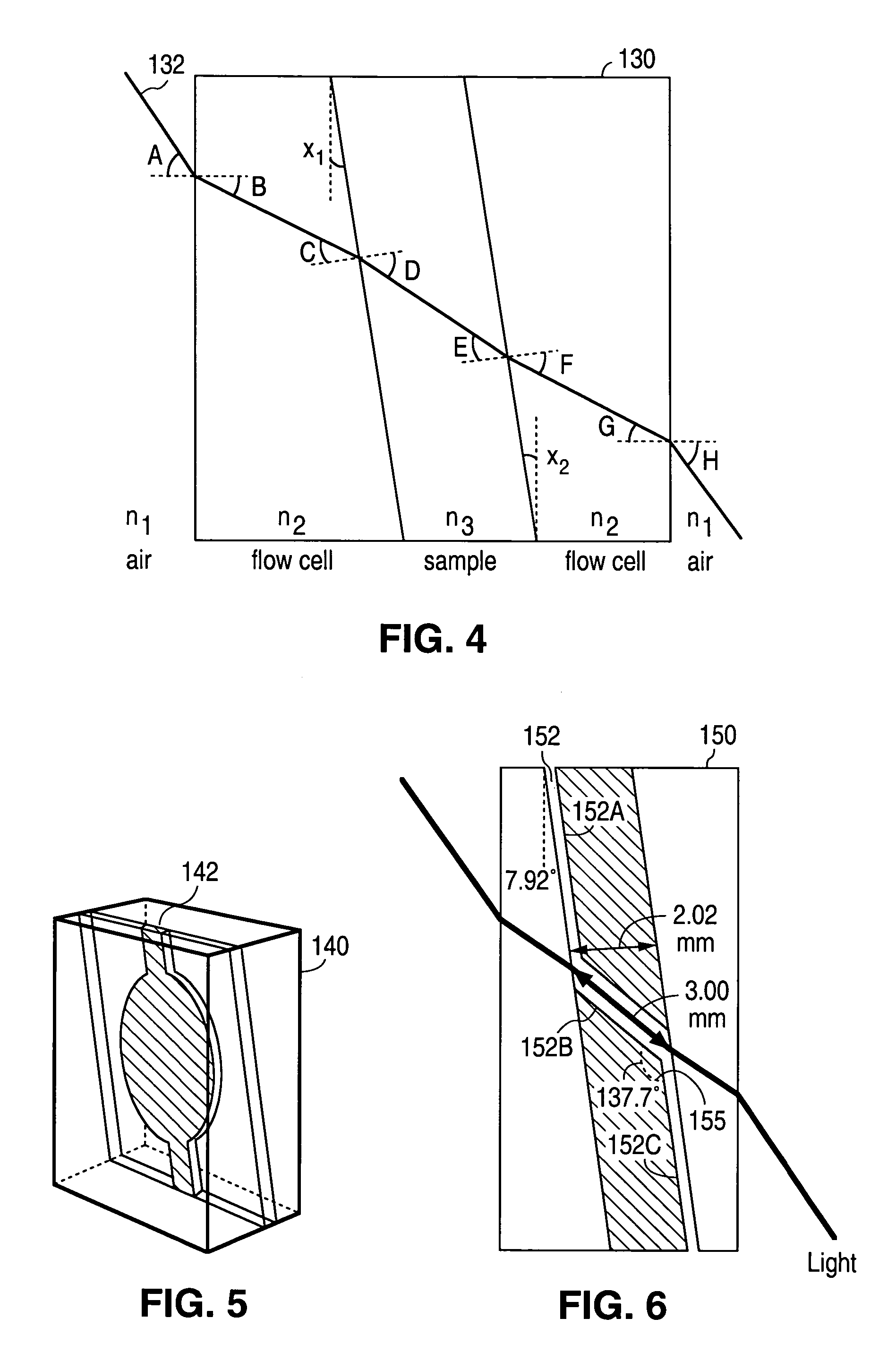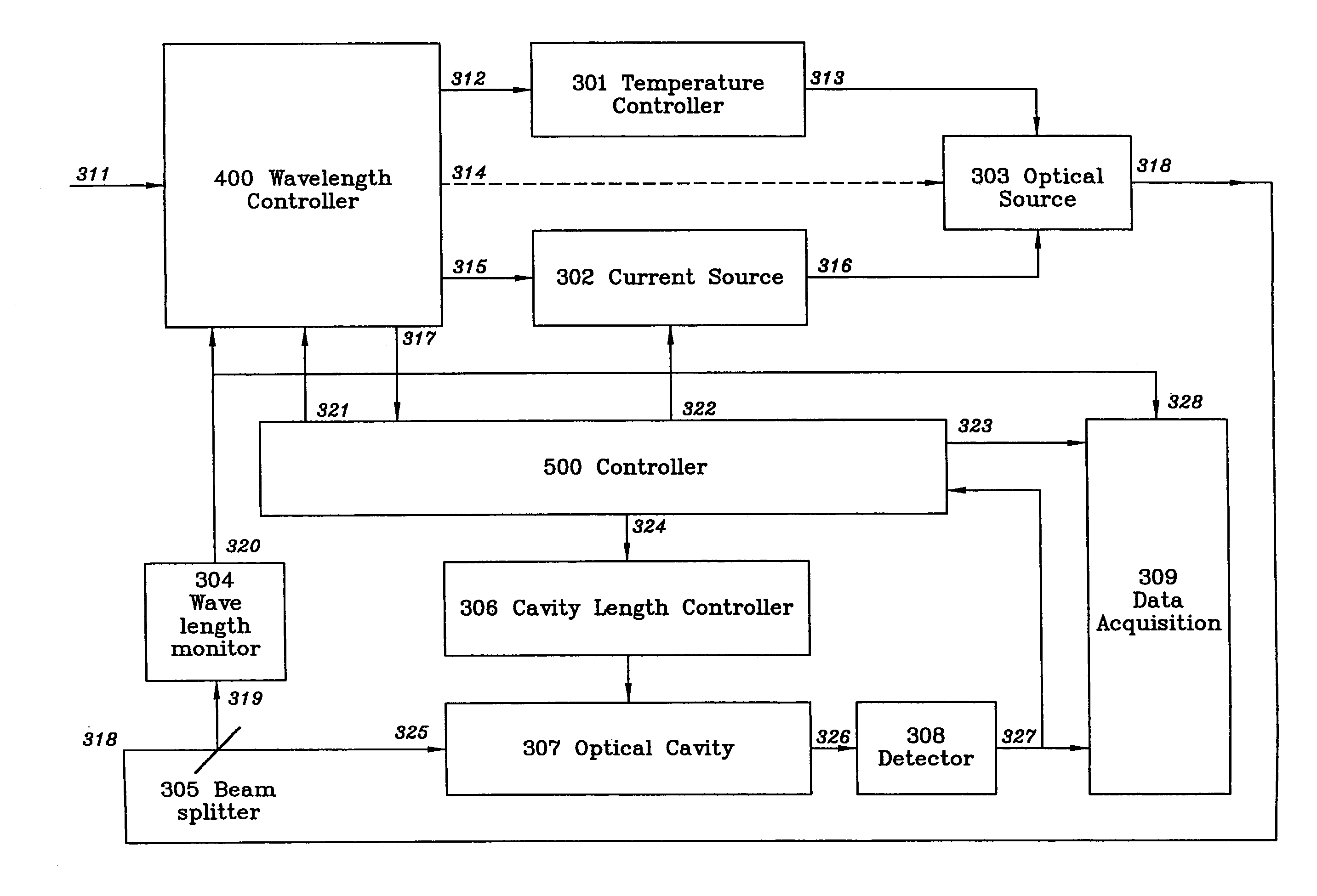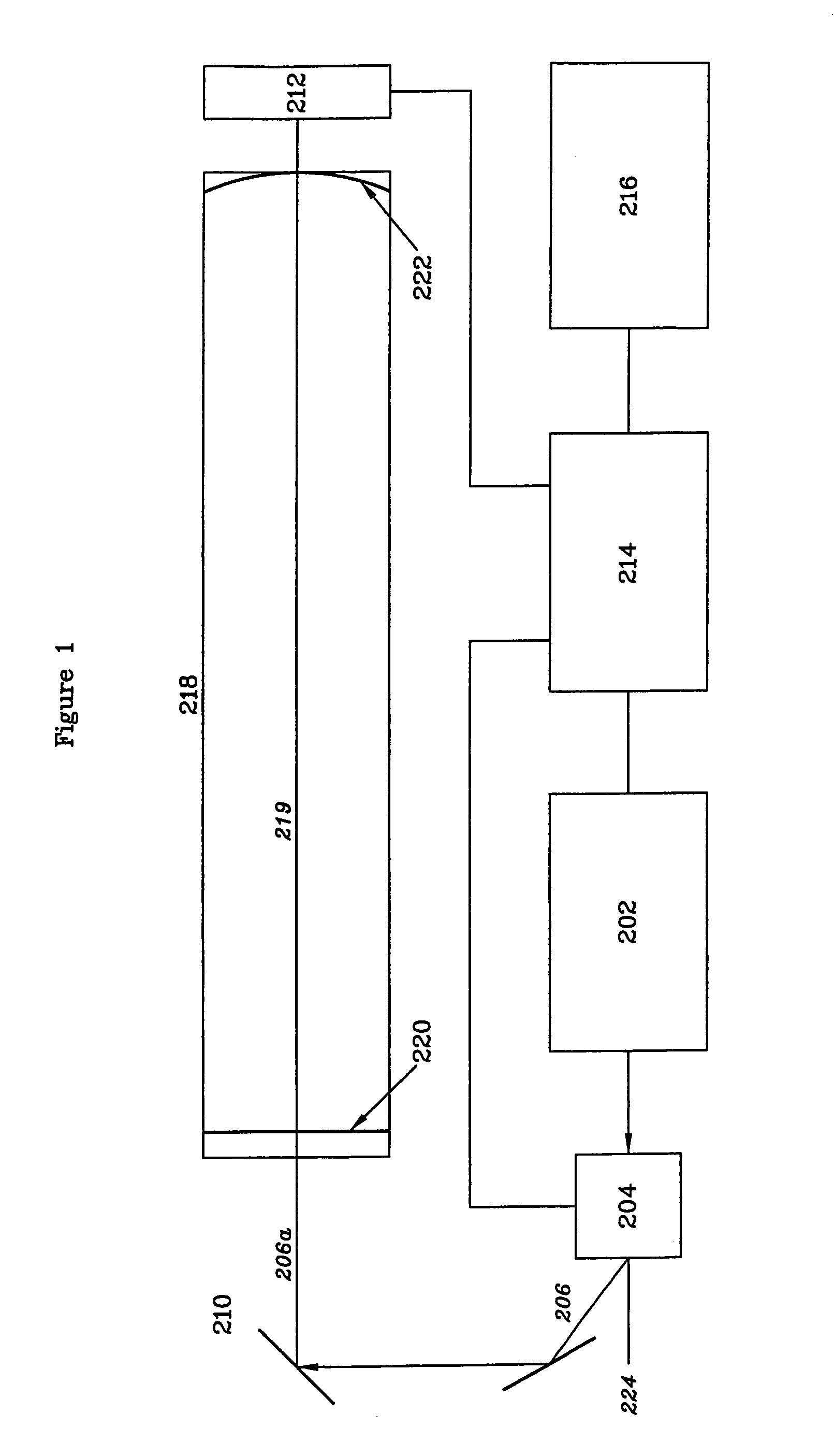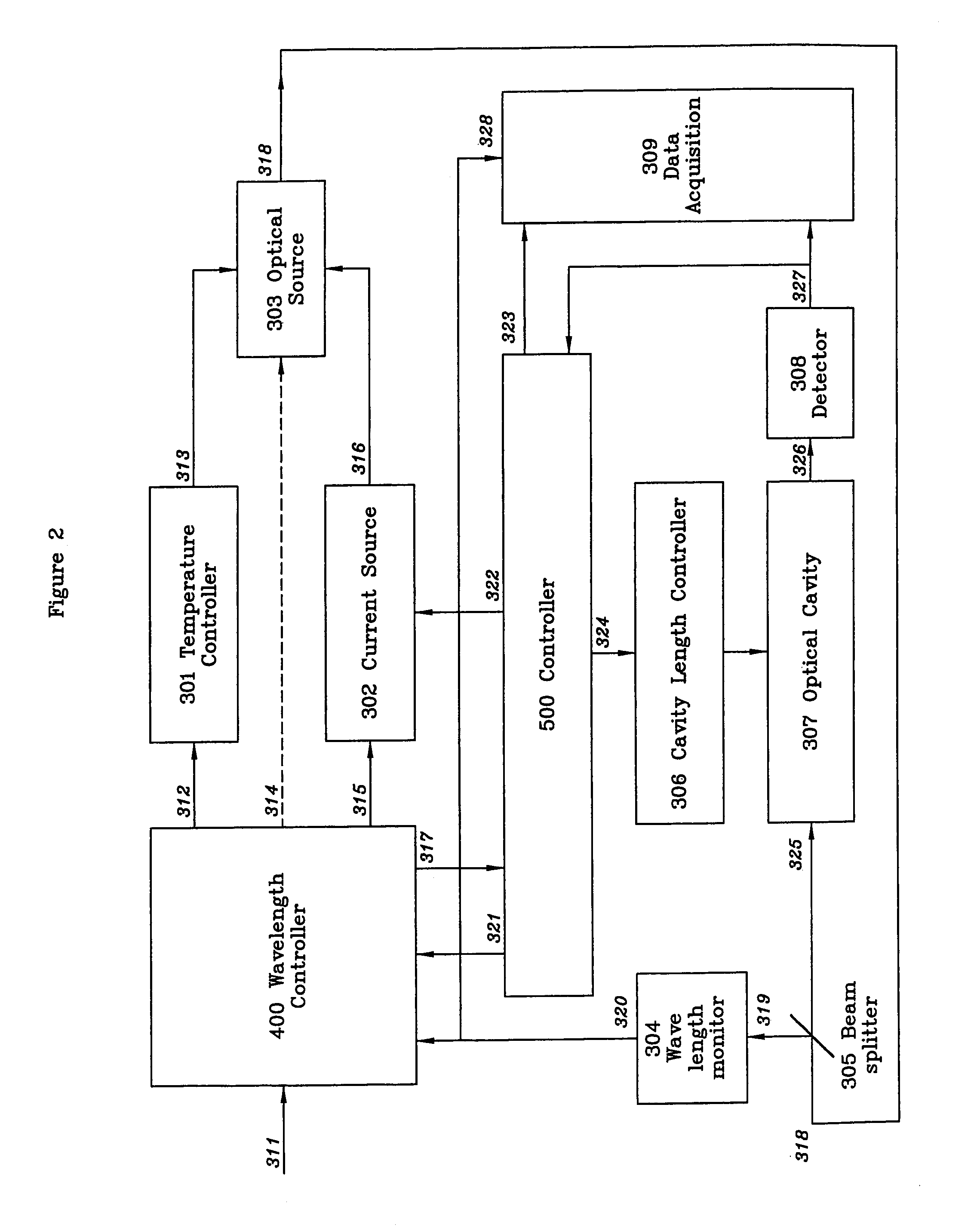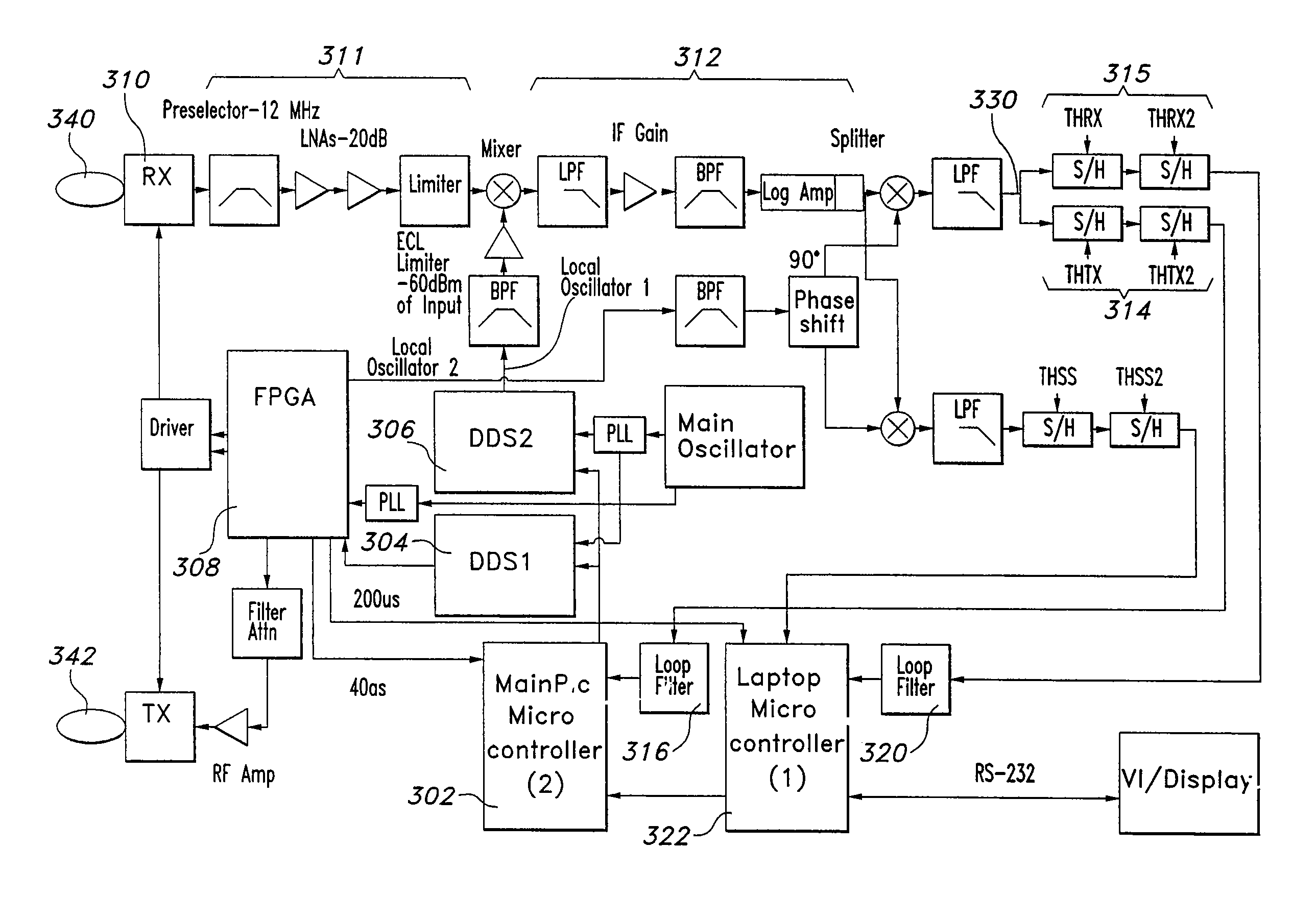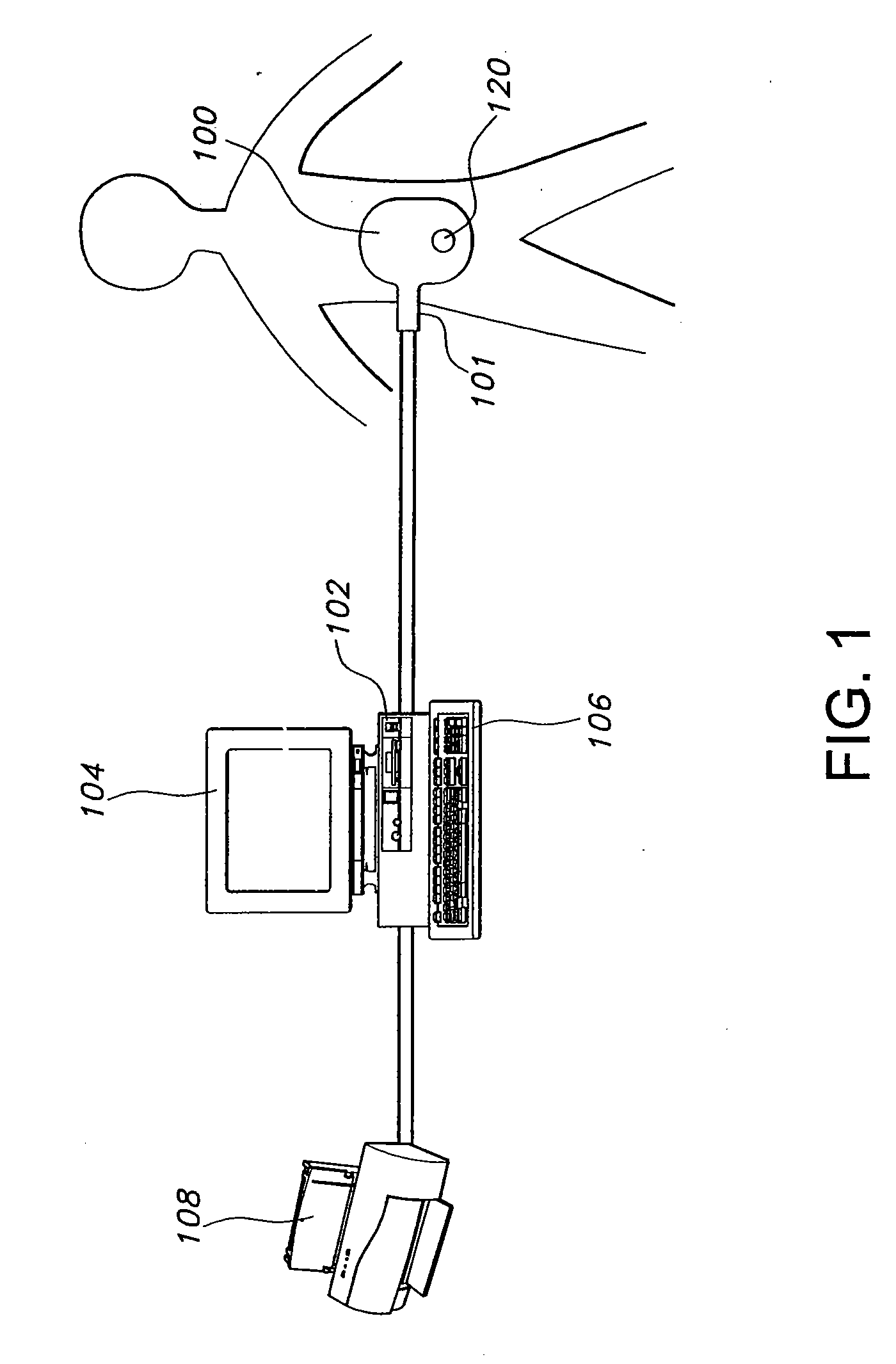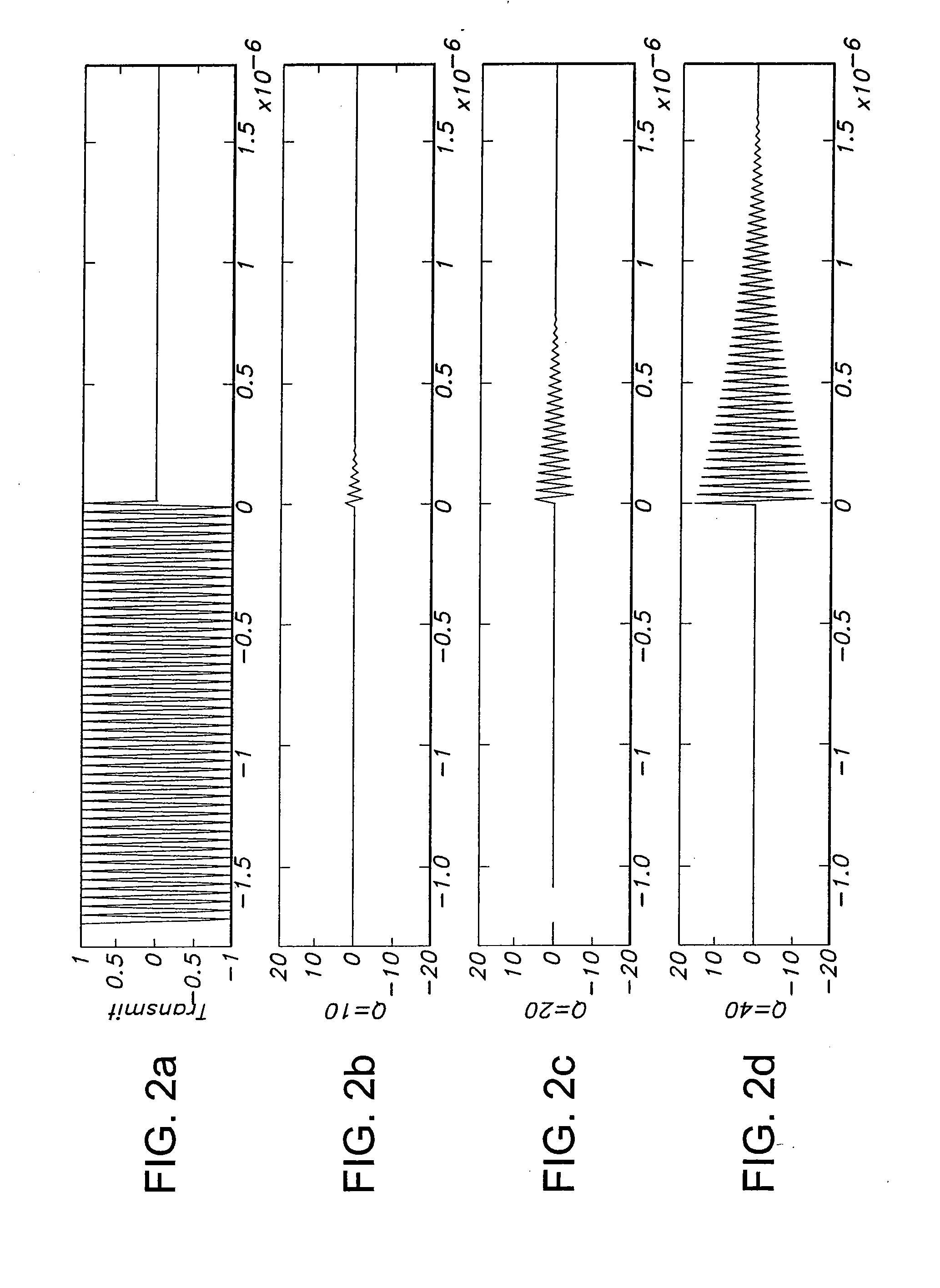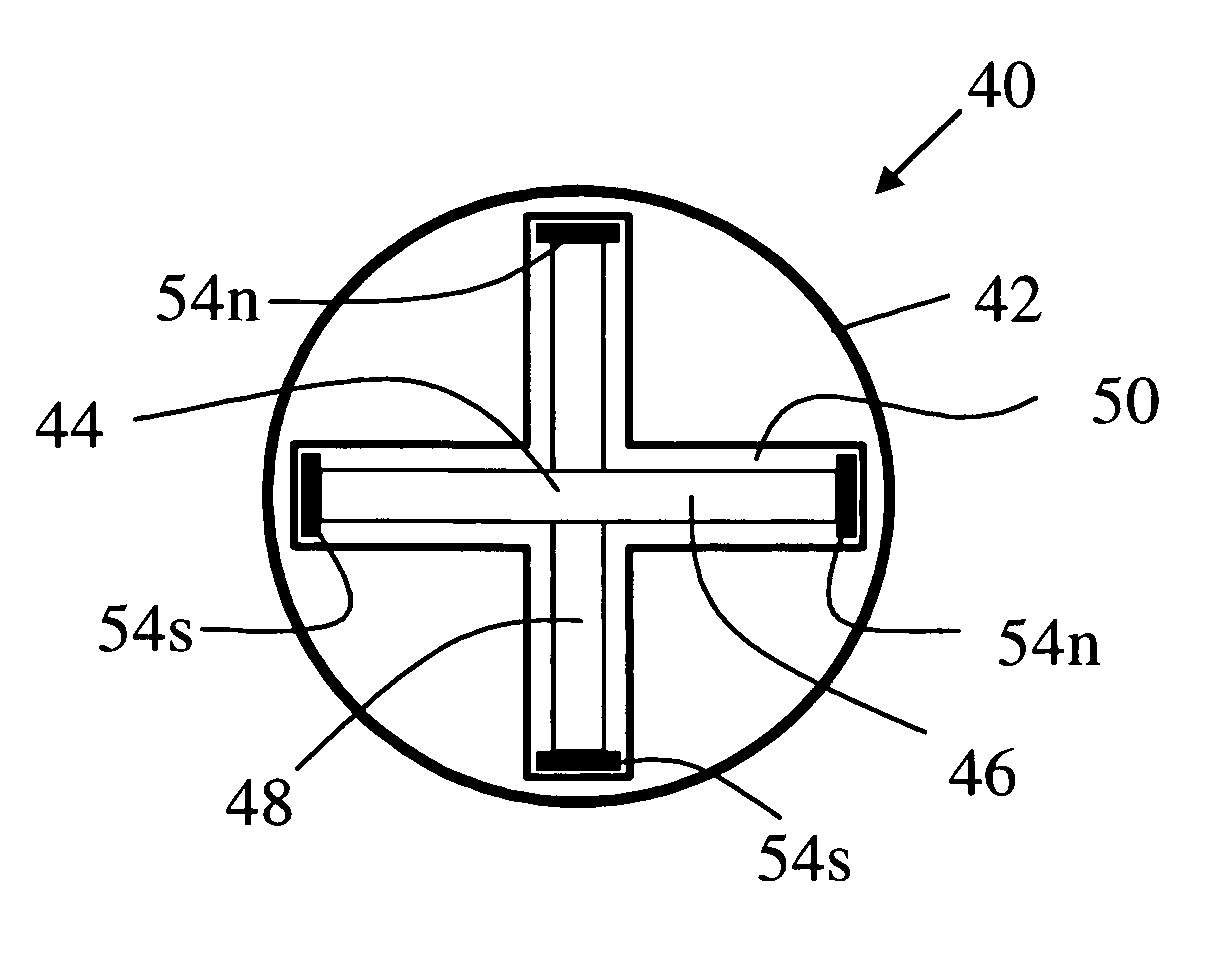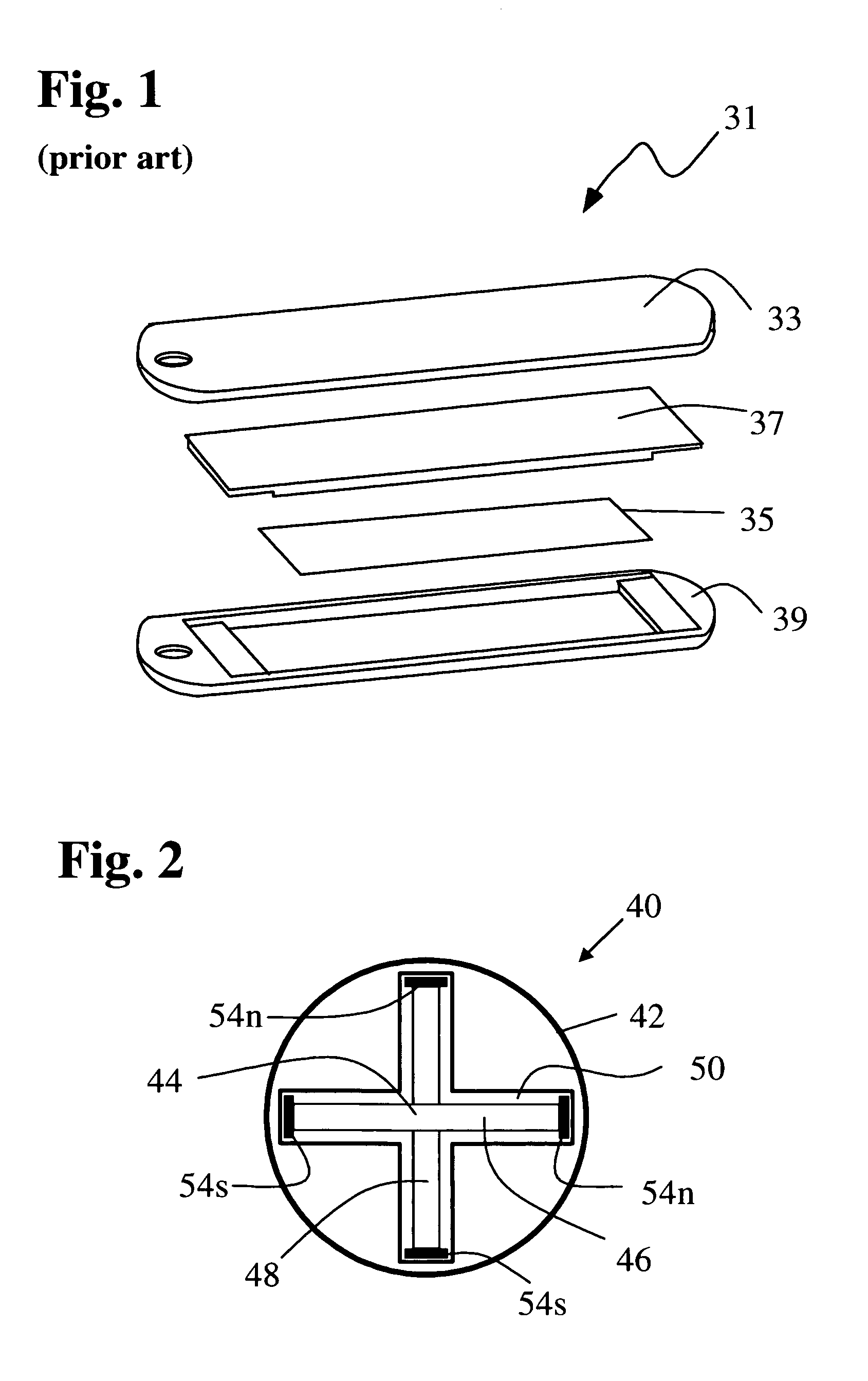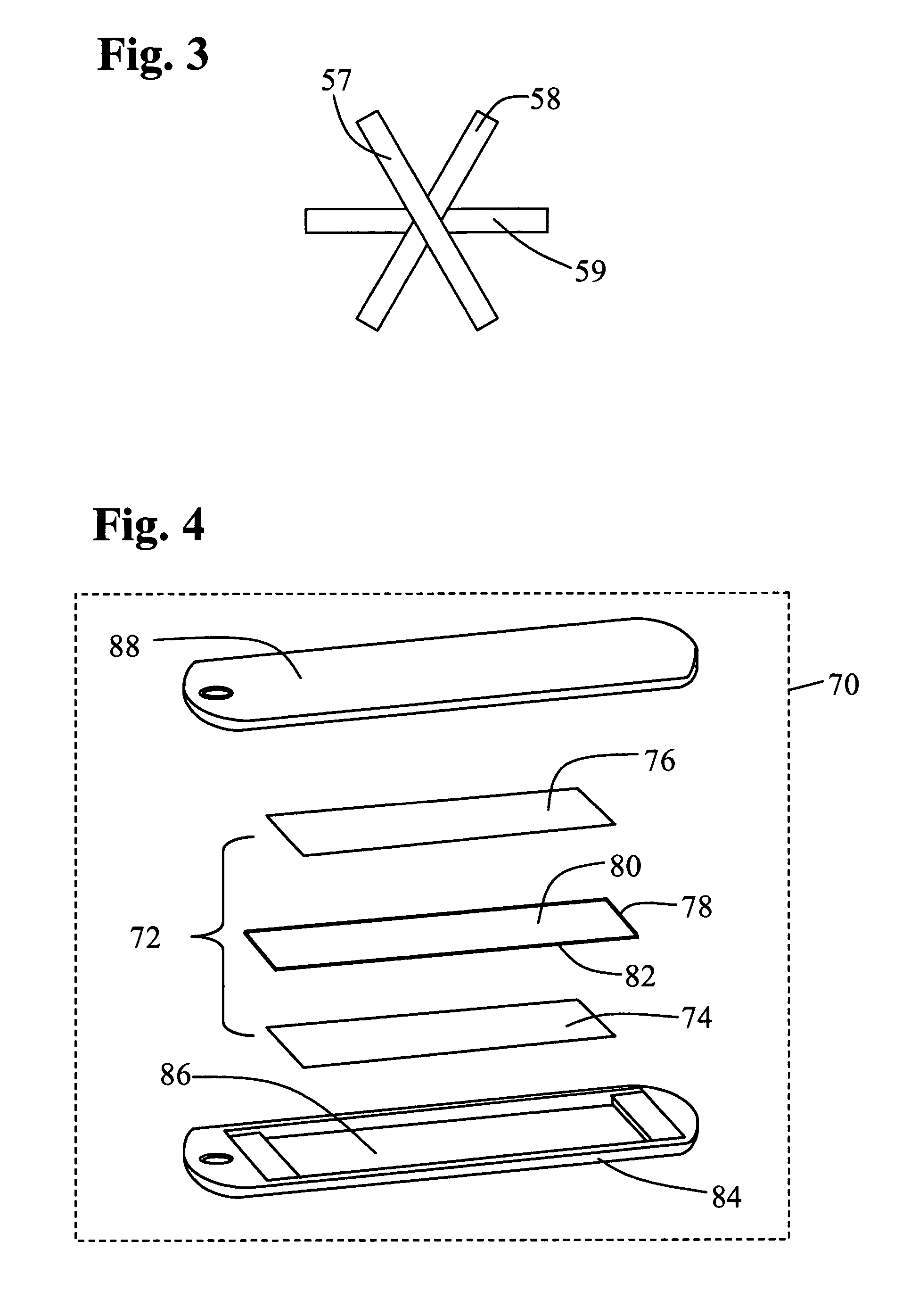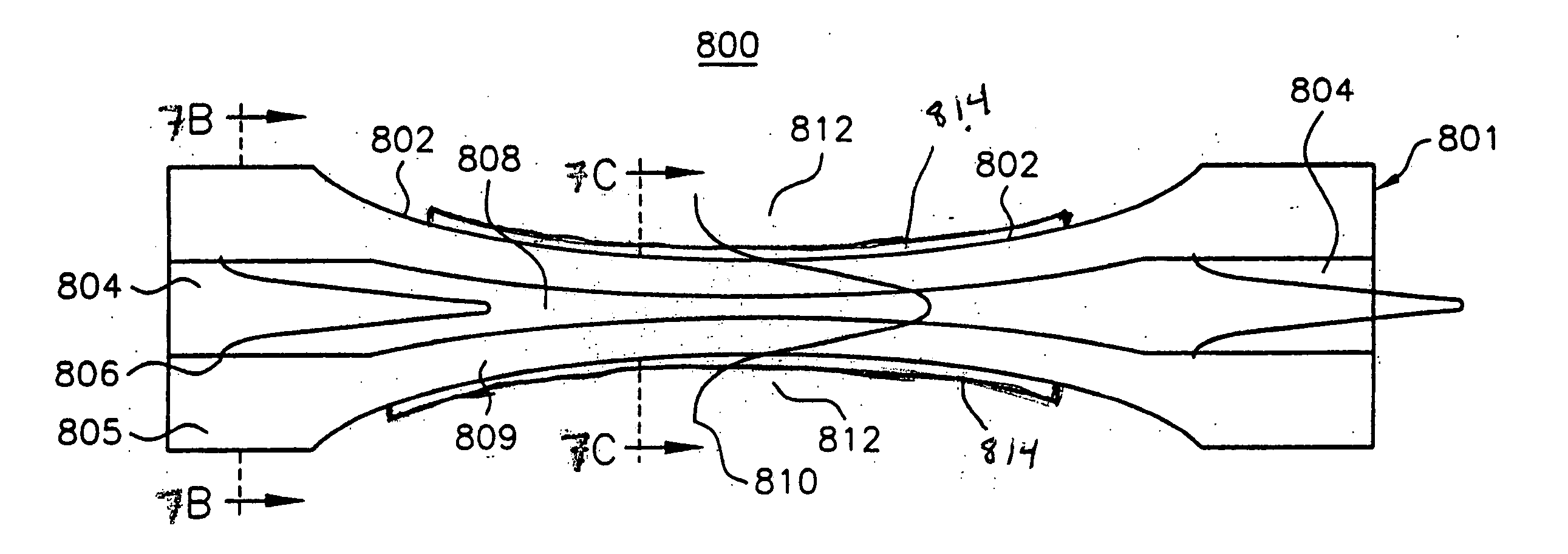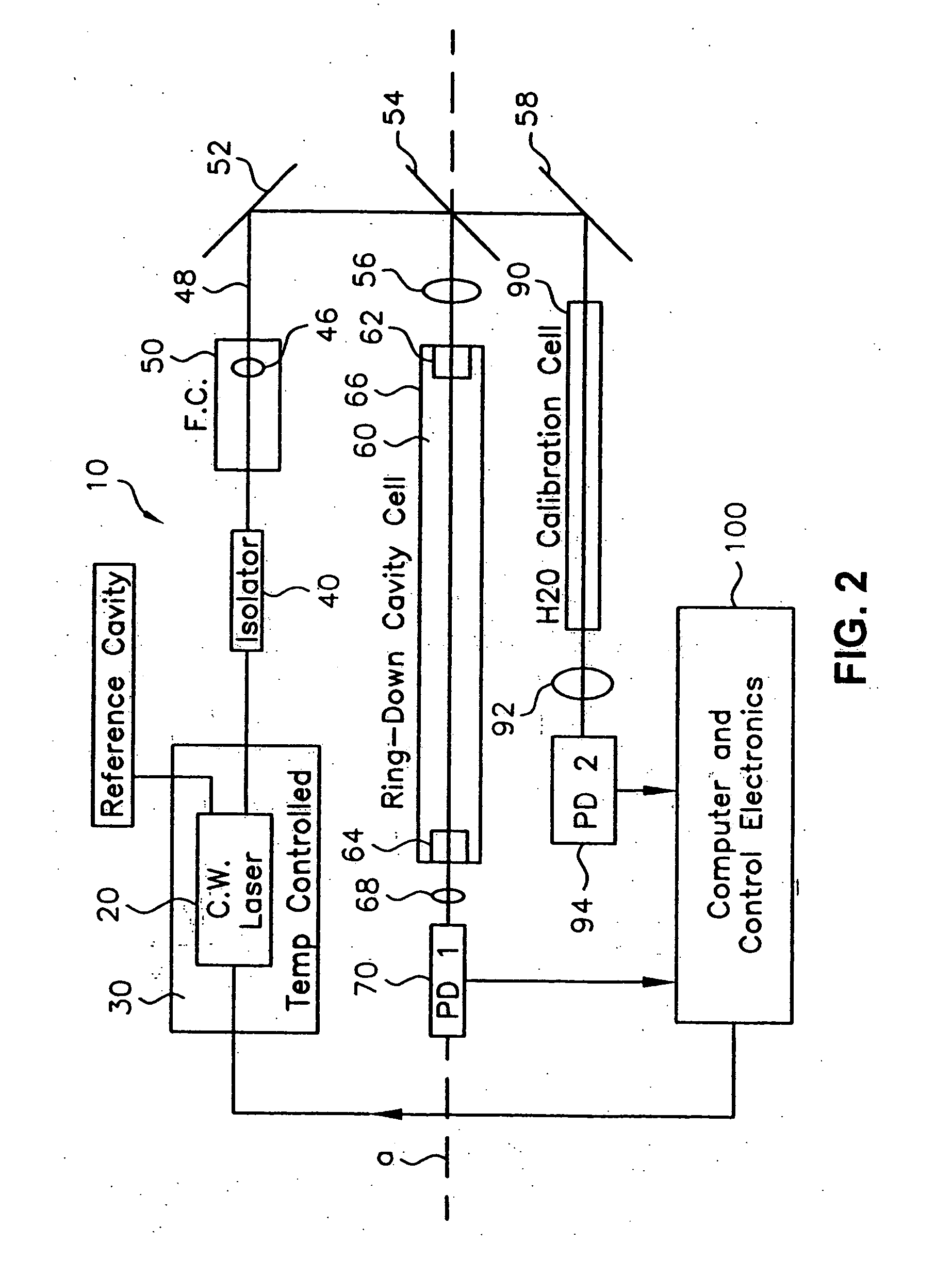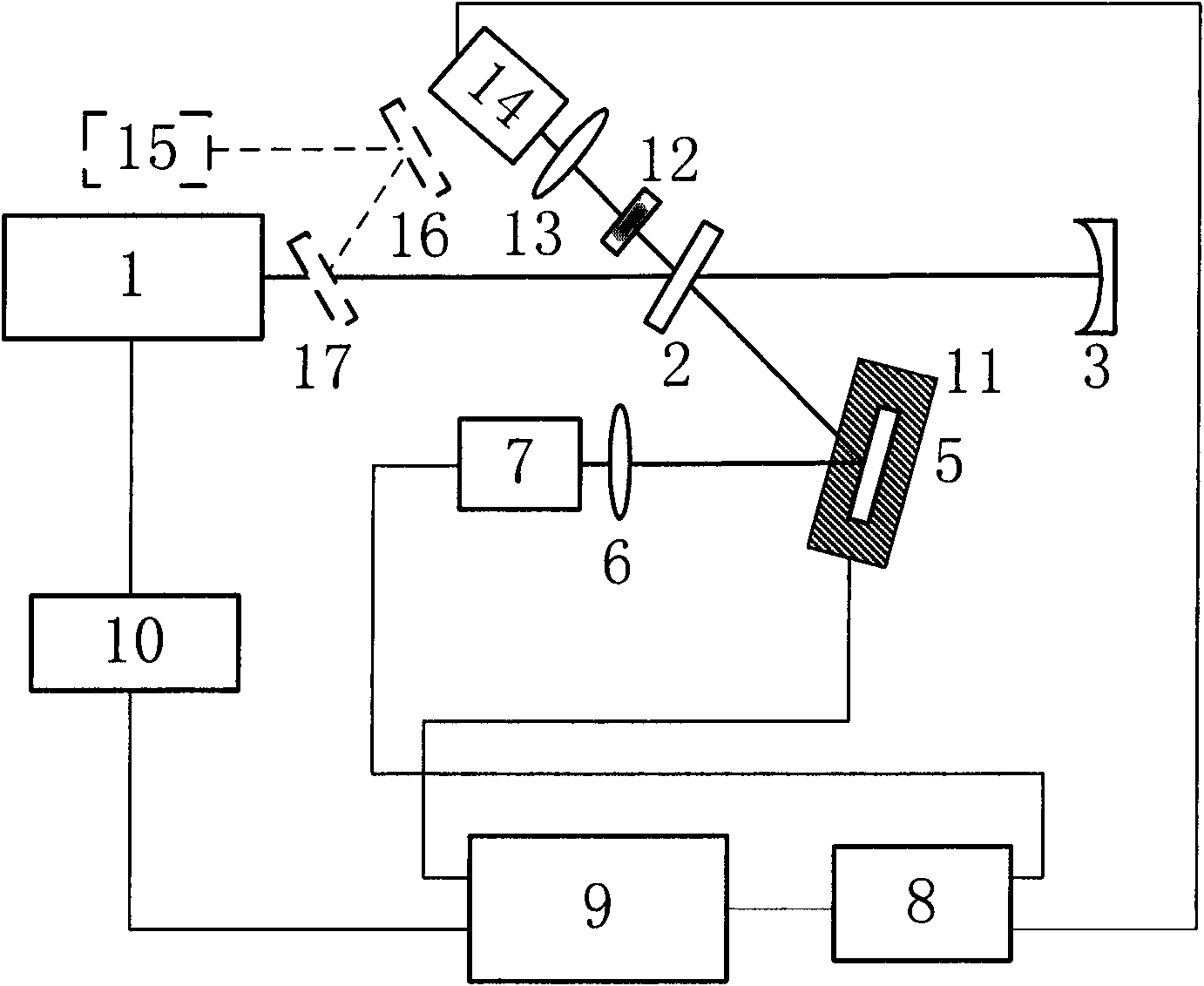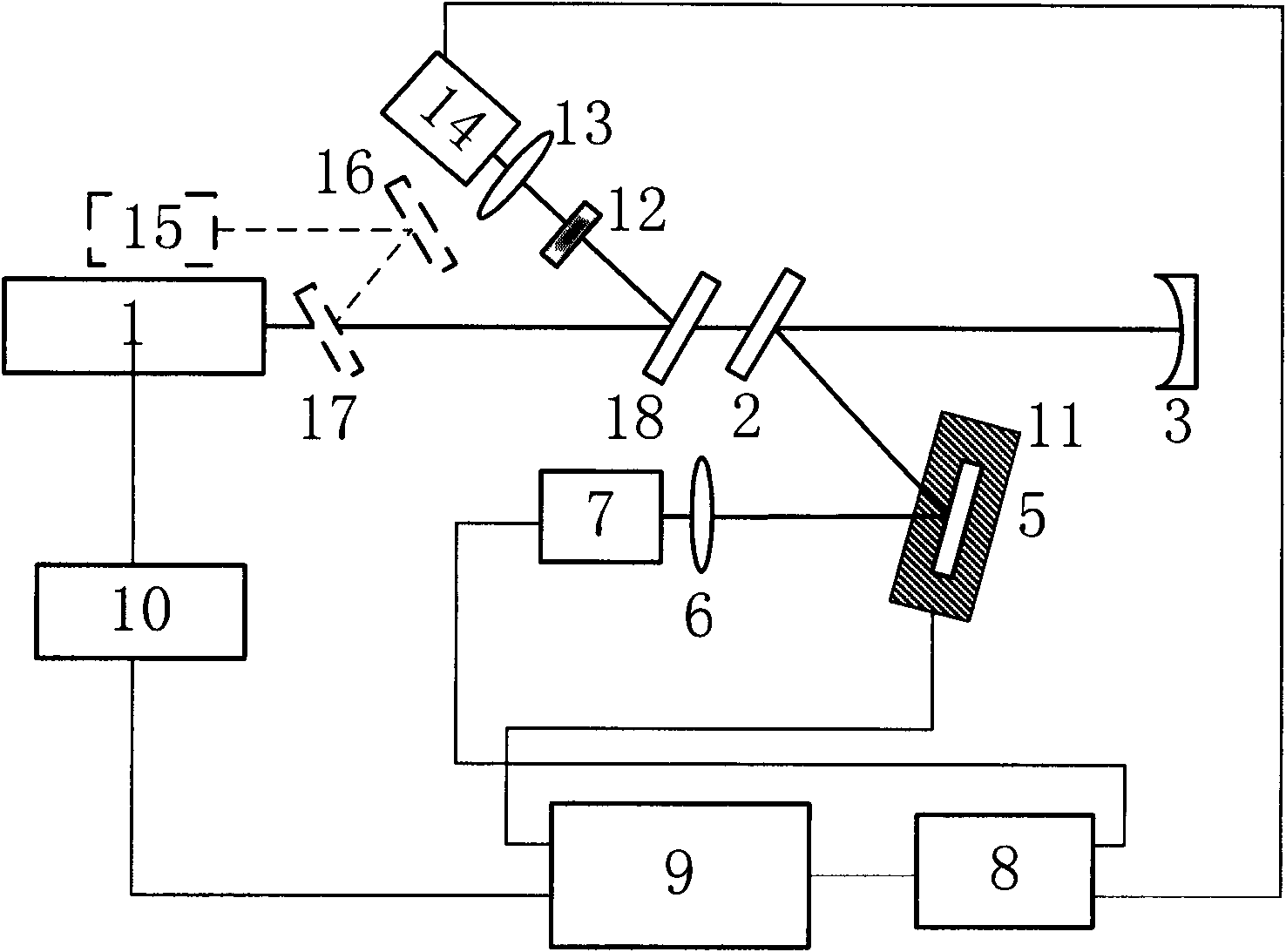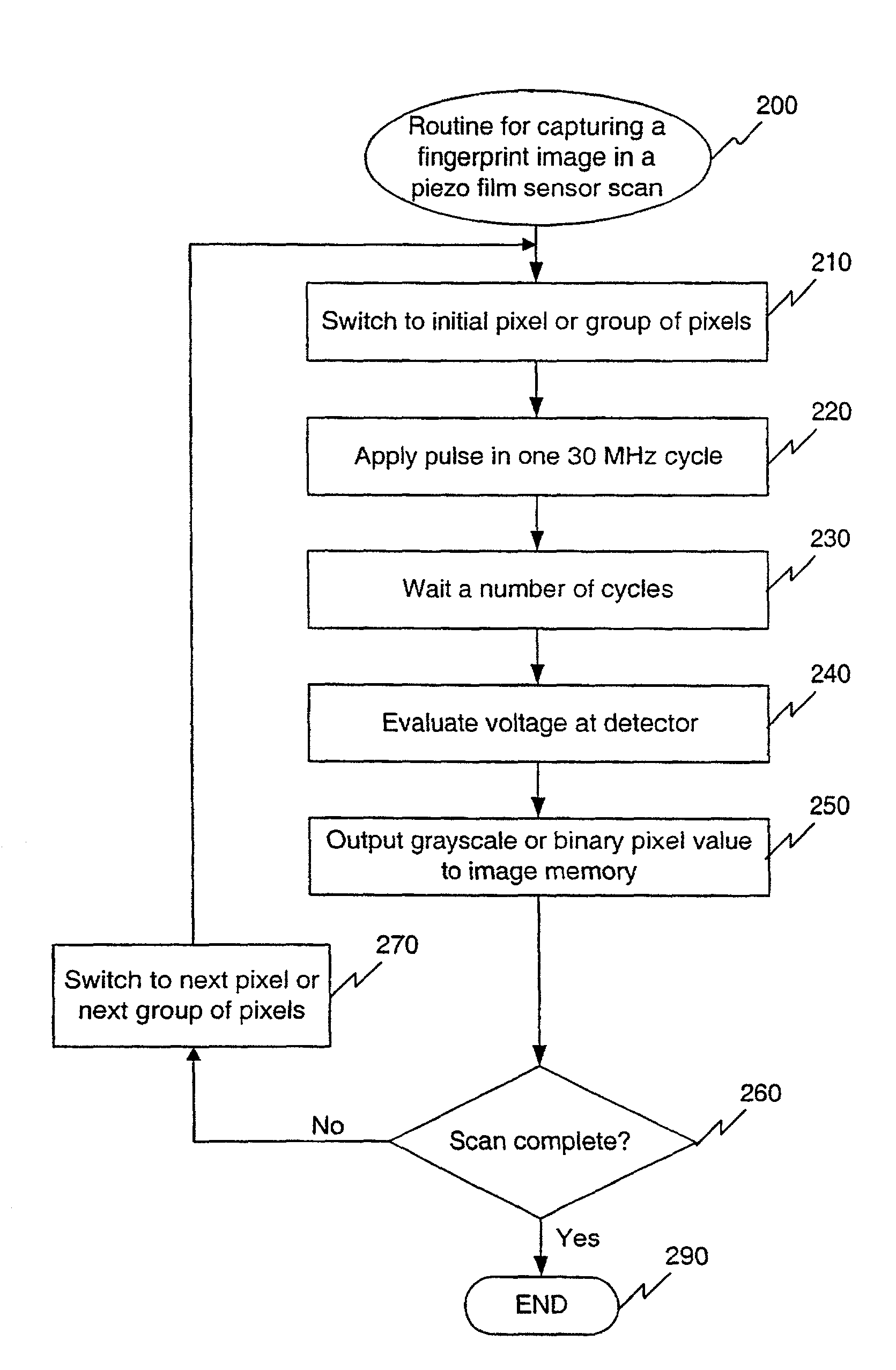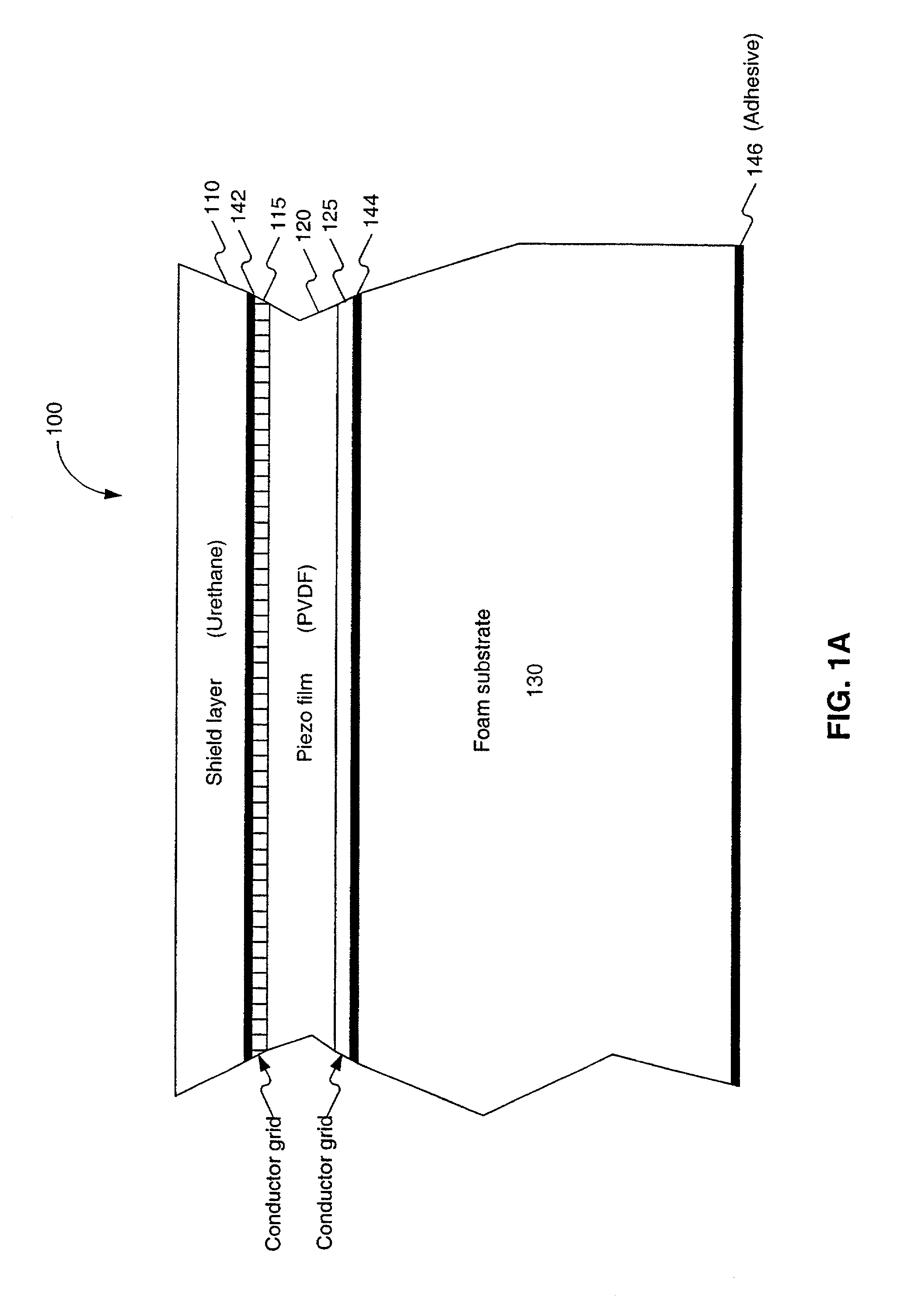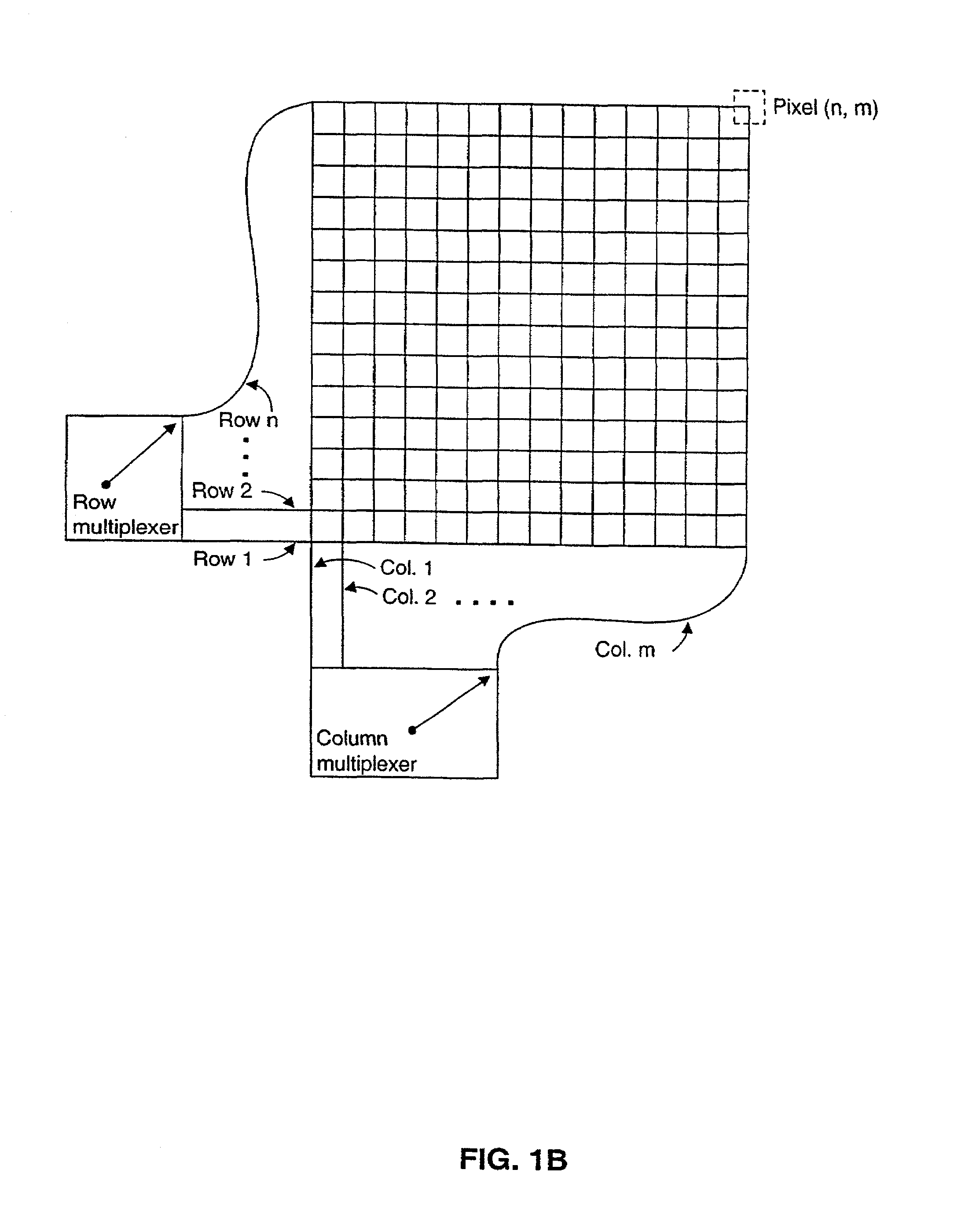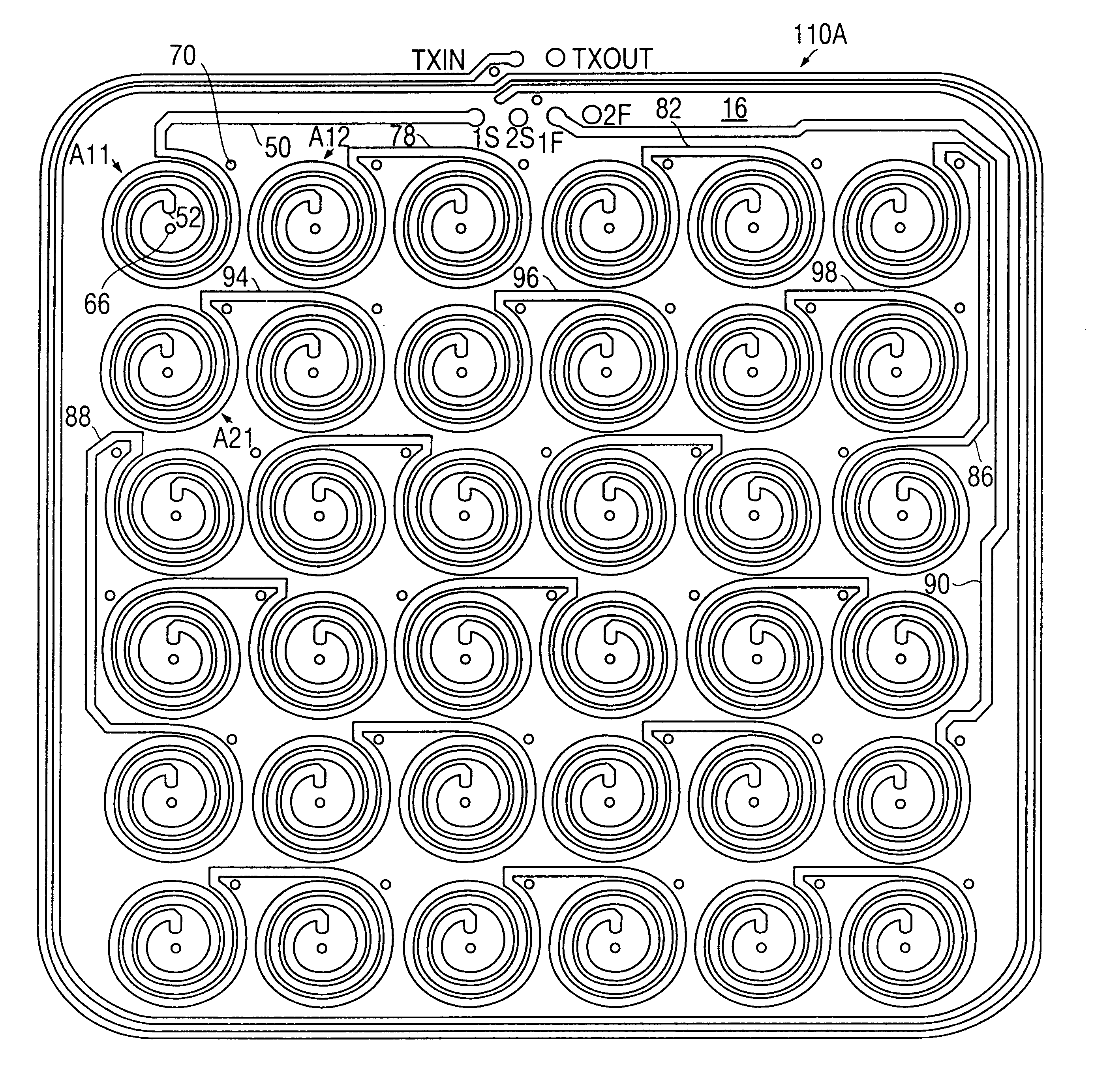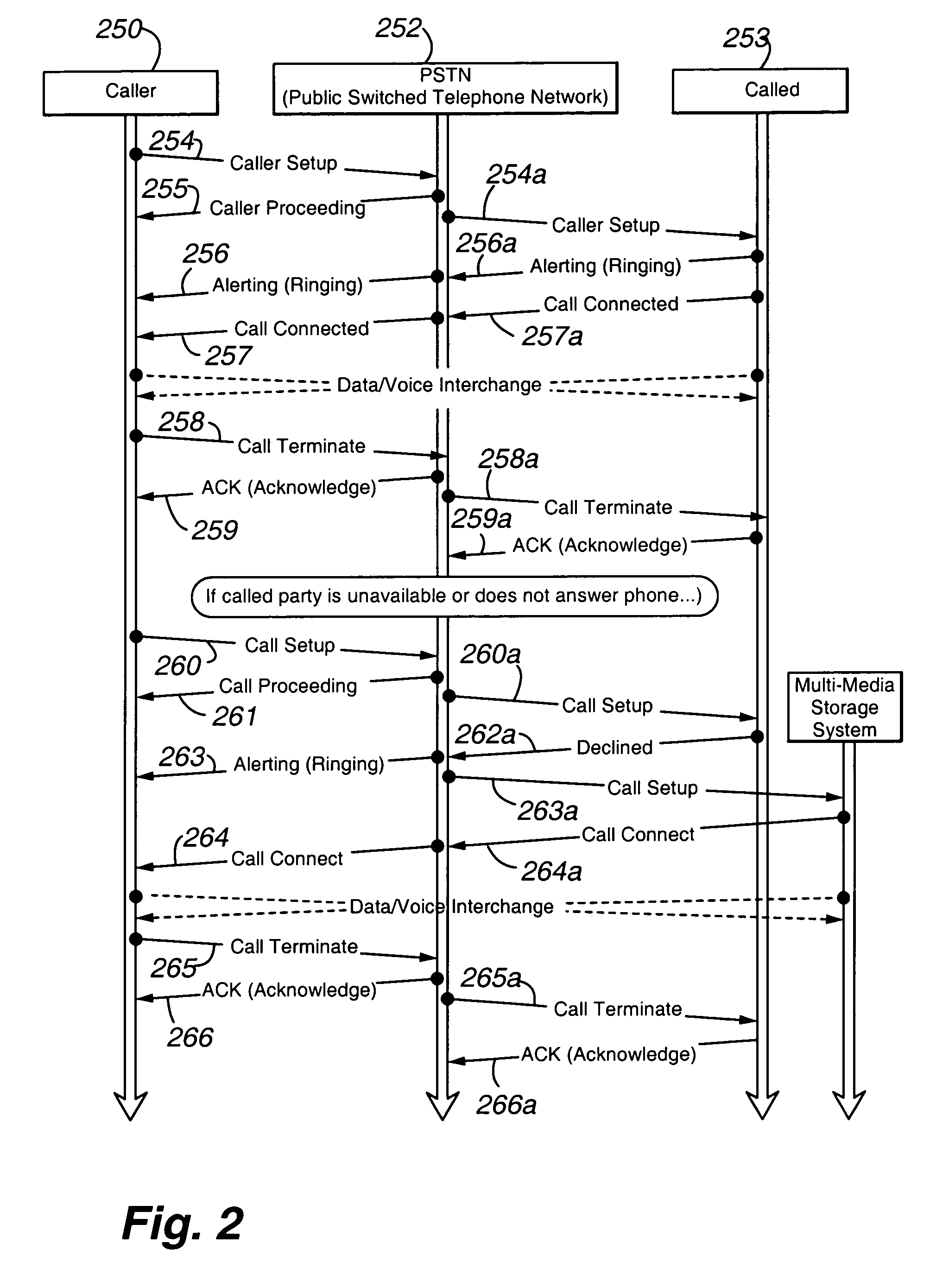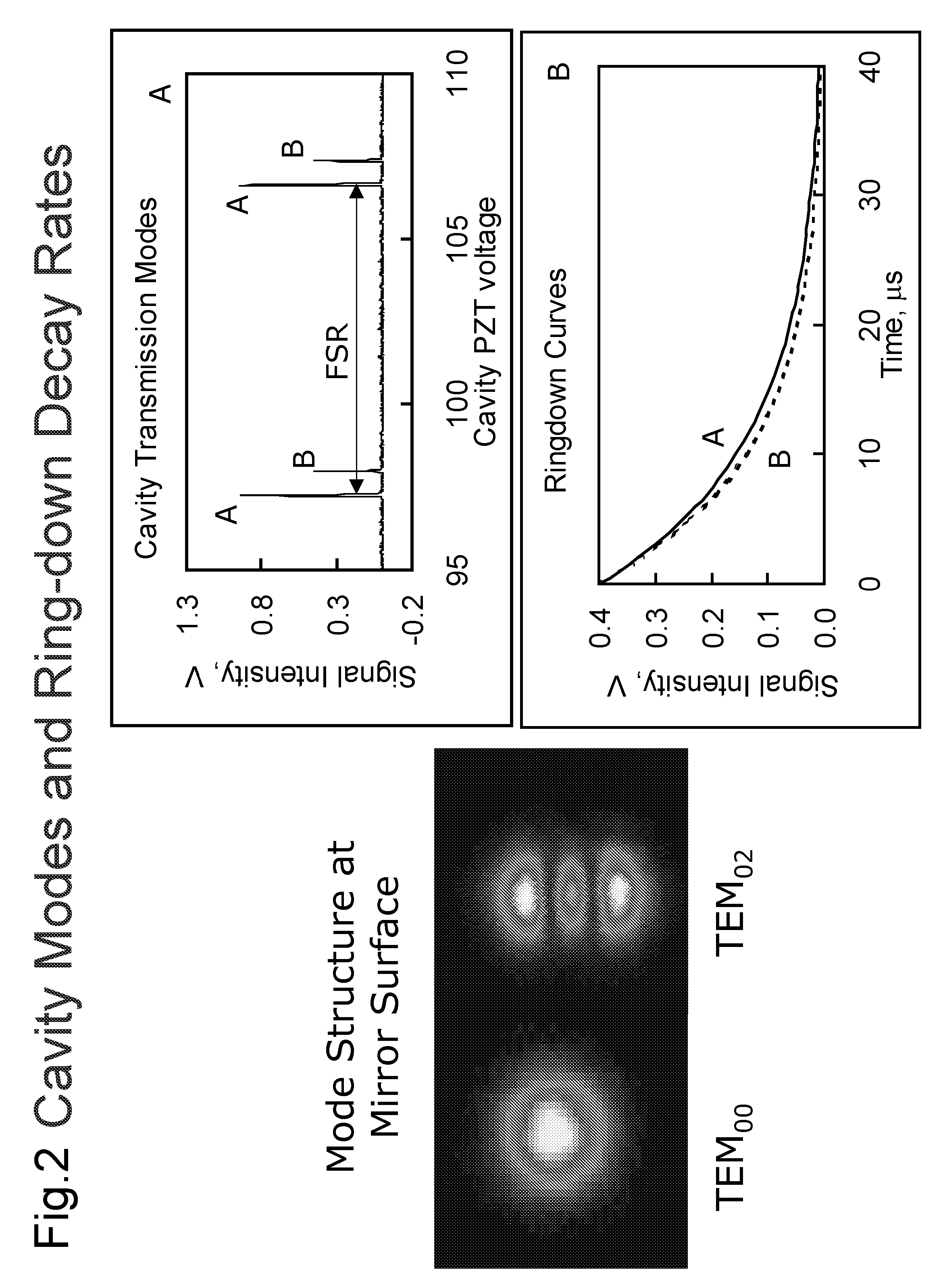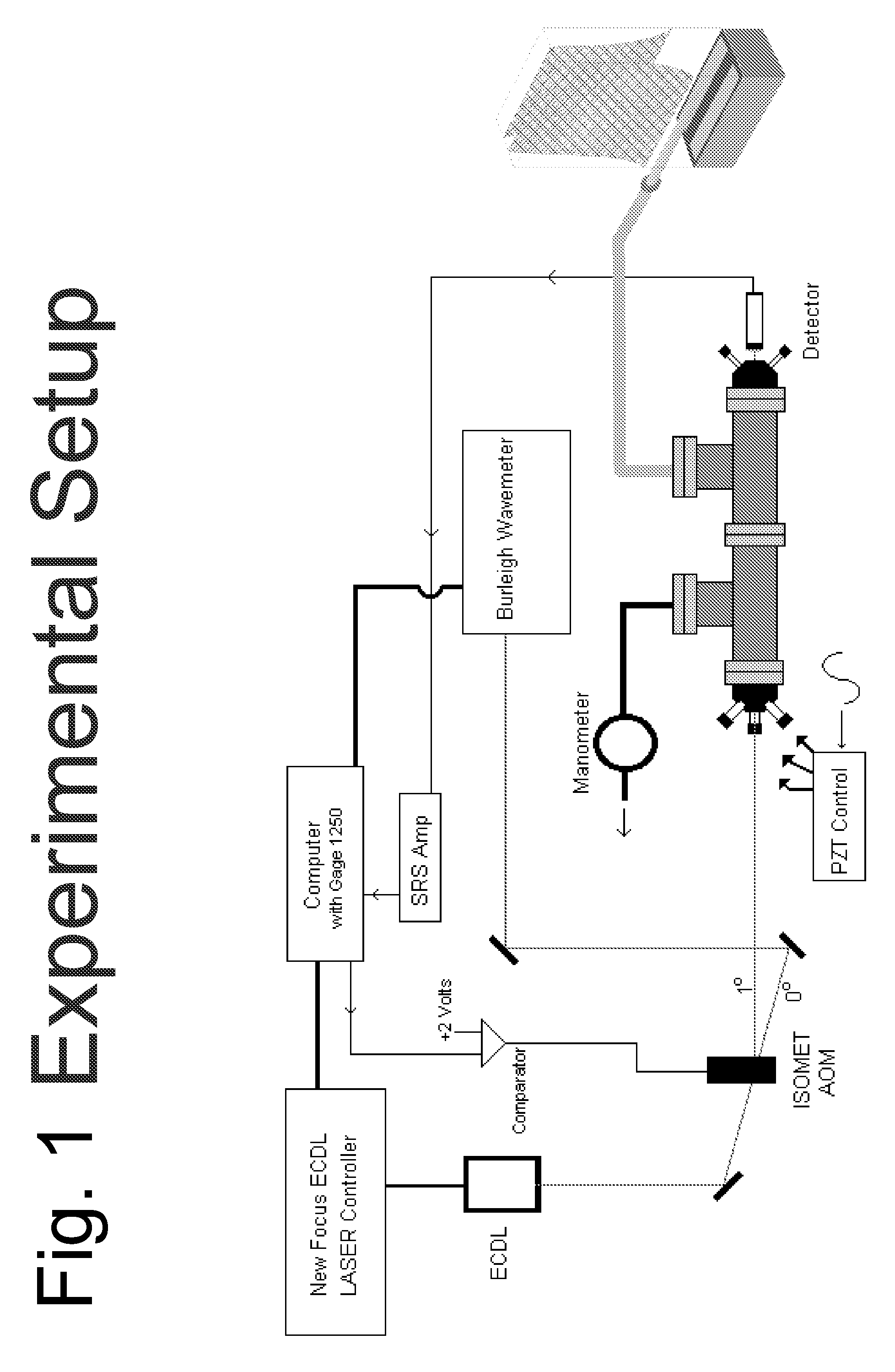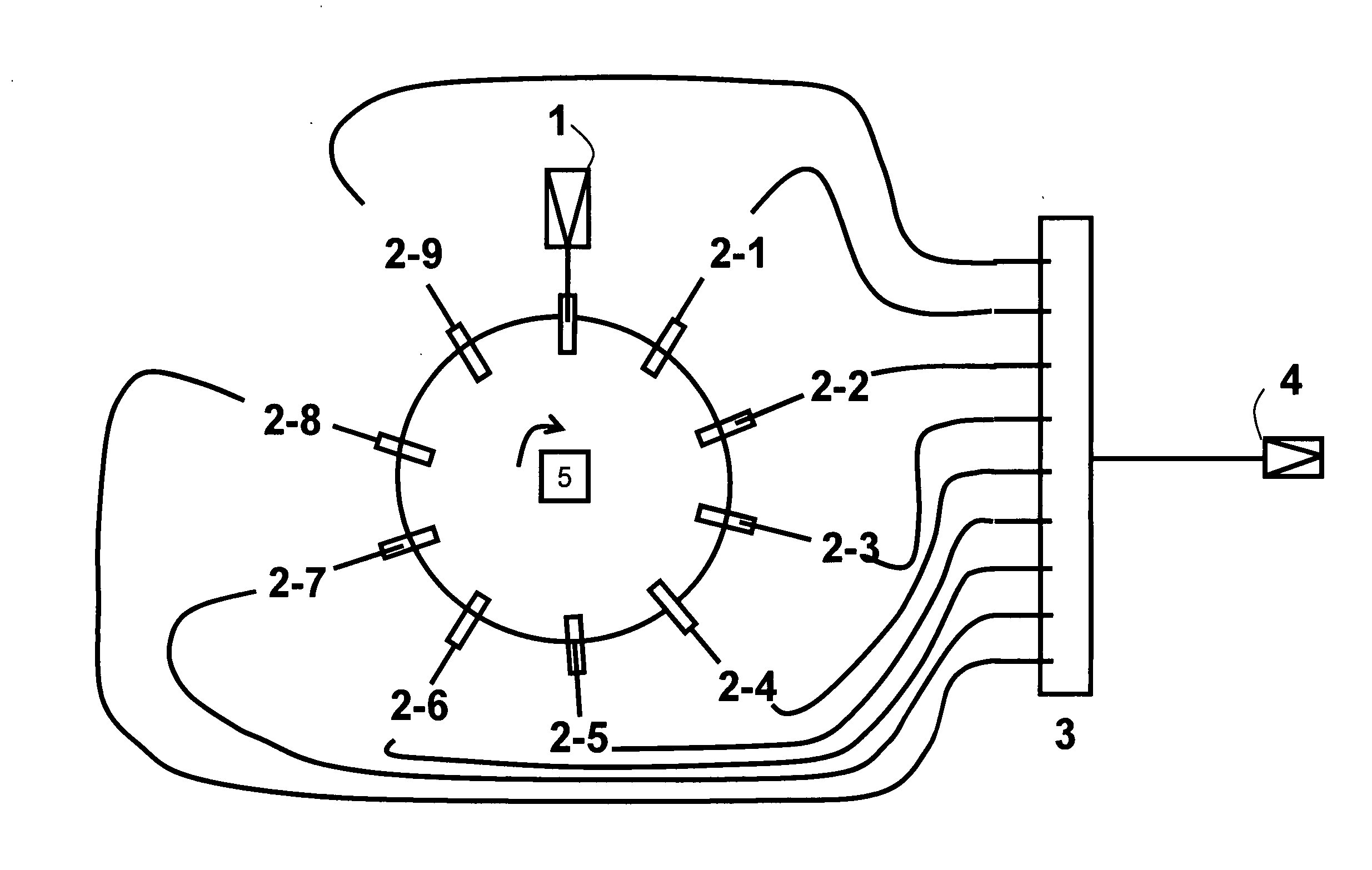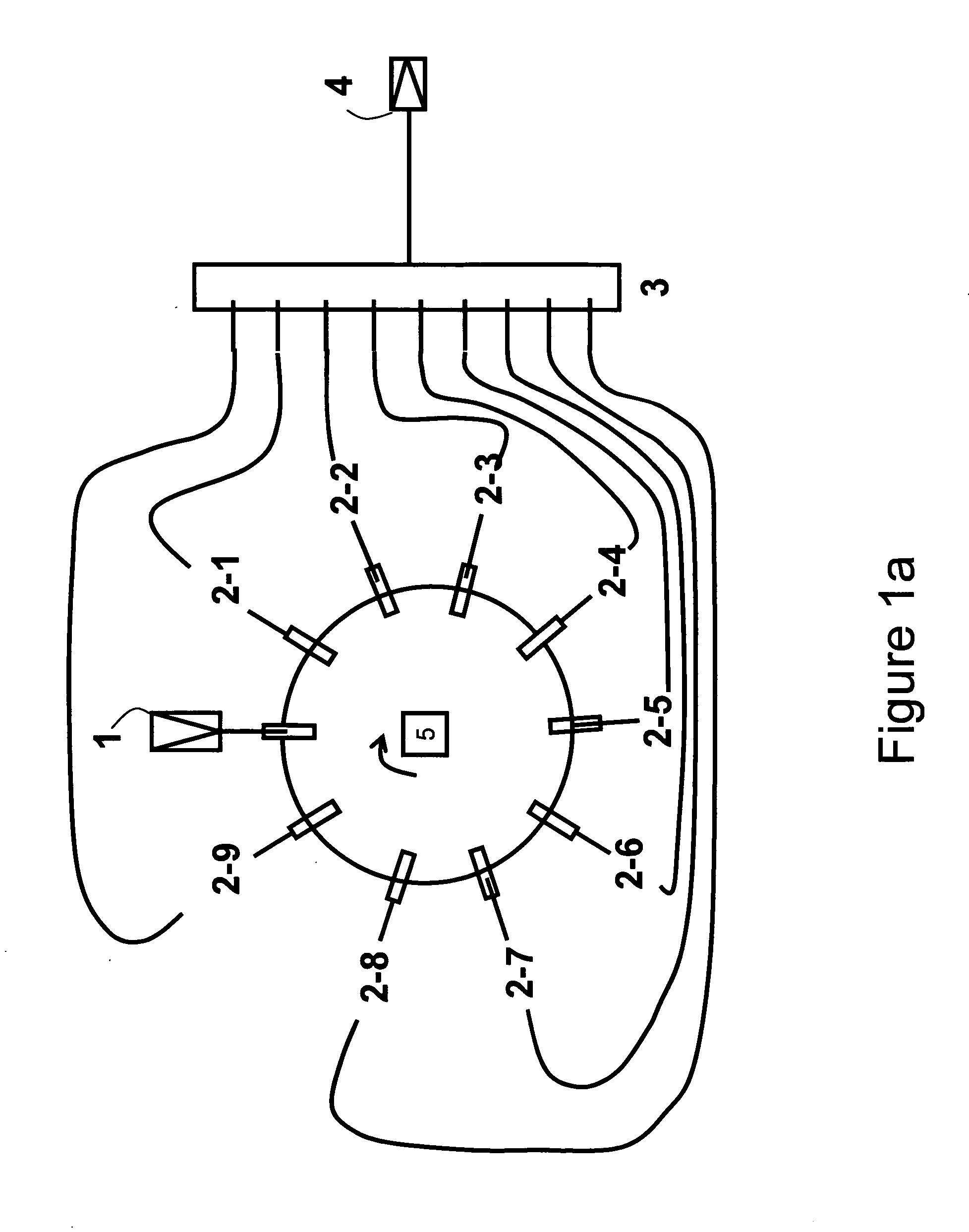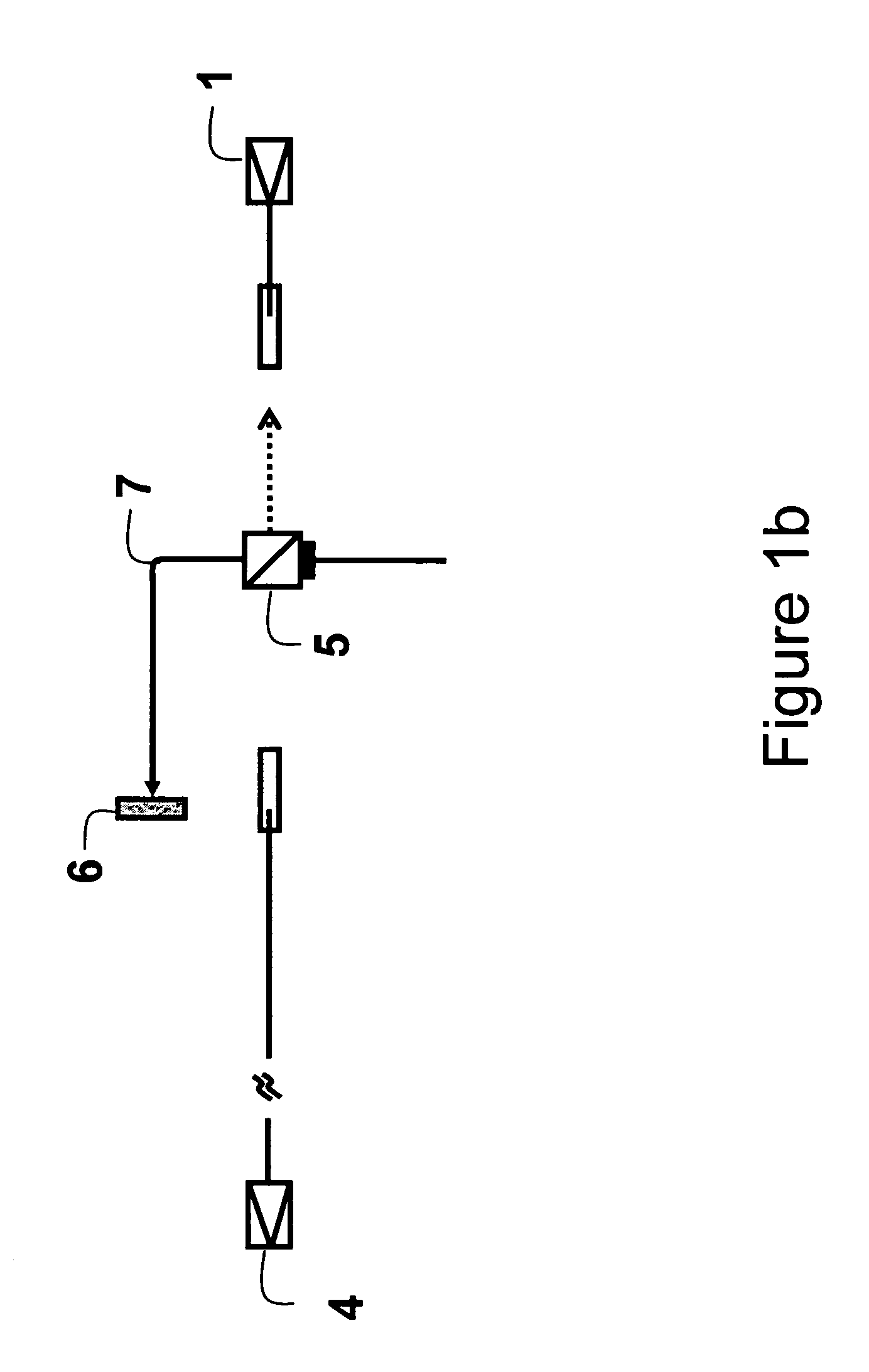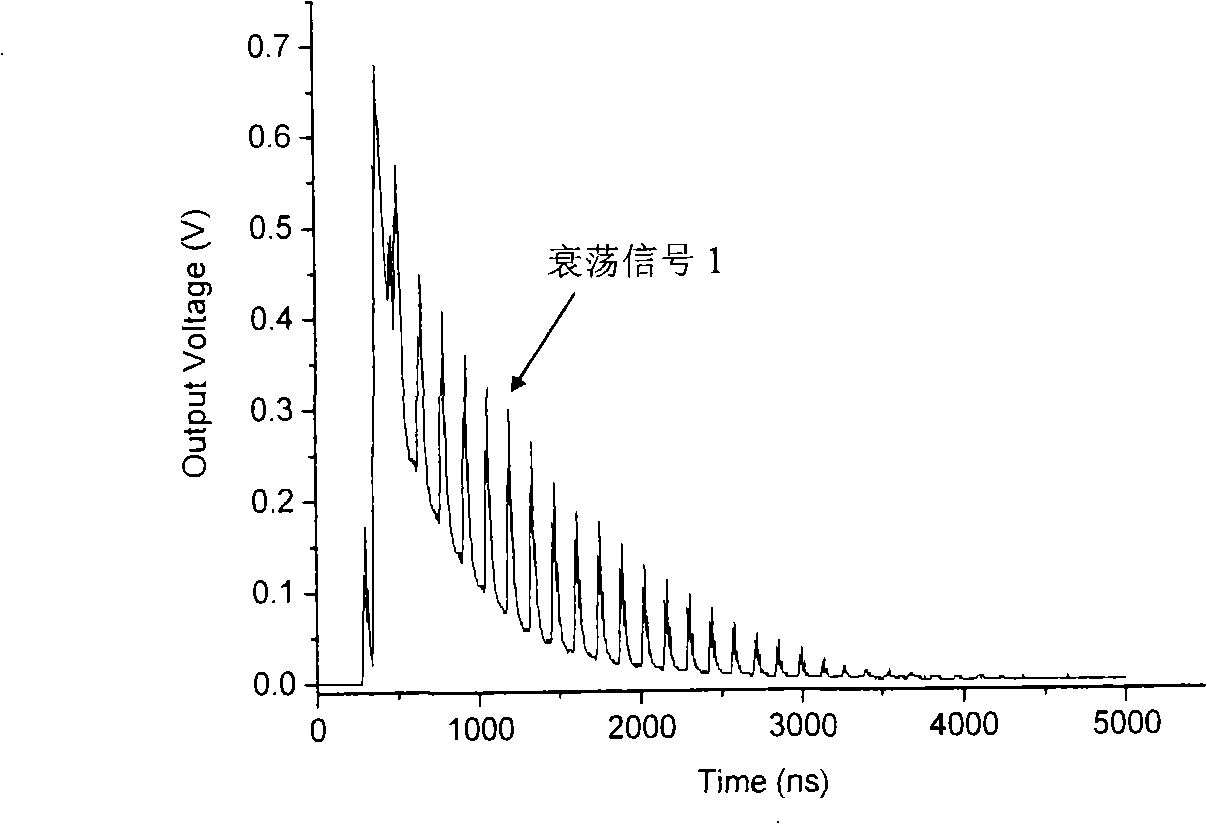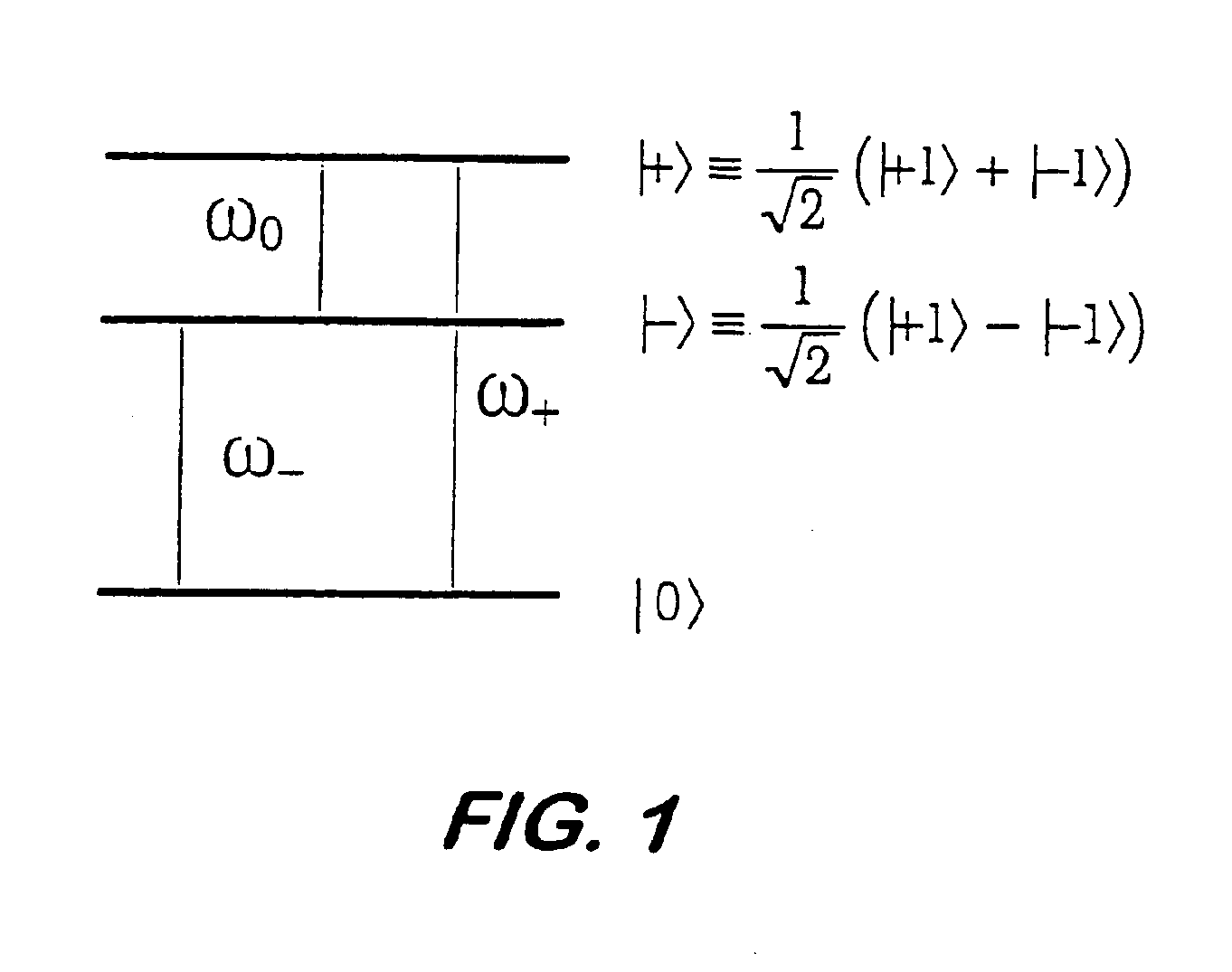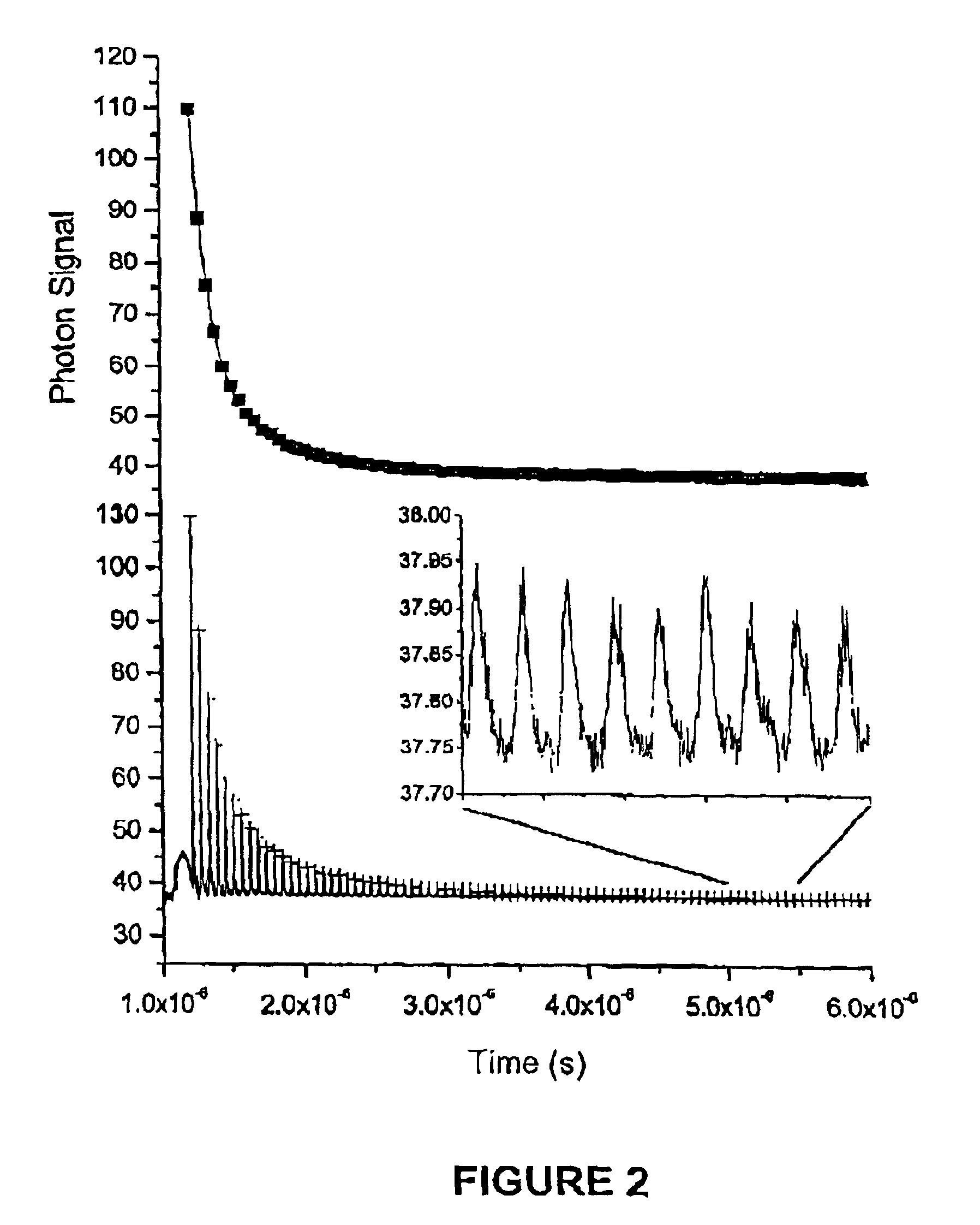Patents
Literature
Hiro is an intelligent assistant for R&D personnel, combined with Patent DNA, to facilitate innovative research.
307 results about "Ring down" patented technology
Efficacy Topic
Property
Owner
Technical Advancement
Application Domain
Technology Topic
Technology Field Word
Patent Country/Region
Patent Type
Patent Status
Application Year
Inventor
Optical heterodyne detection in optical cavity ringdown spectroscopy
The present invention relates to optical heterodyne detection cavity ringdown spectroscopy. In one aspect the invention relates to an optical system (1) comprising a ring-down cavity cell (3) defining a resonant optical cavity, means for directing coherent light selected from the group consisting of continuous or quasi-continuous light into said optical cavity (8, 9, 10, 11, and 12), means for altering the resonant optical cavity so as to generate a frequency shift of the coherent light in the optical cavity (6, 7), means for coupling said coherent light into the optical cavity and means for decoupling the frequency shifted coherent light out of said optical cavity (5, 6, 7), means for optically combining (10, 11, 12) said decoupled frequency shifted coherent light with another portion of coherent light not in optical communication with the optical cavity and means for optical heterodyne detection (13) of the intensity of said combined light. A method for optical detection is also described as well as methods and apparatus for detecting a parameter of a sample.
Owner:MACQUARIE RES
Biometric piezo scanner
InactiveUS20080175450A1Provide informationBlood flow measurement devicesPerson identificationSensor arrayElectrical conductor
A piezoelectric thin film sensor array is used to scan and capture biometric data, for example, a fingerprint image. In one embodiment, a multi-layer structure includes a PVDF layer in between two conductor grids arranged orthogonally to one another. Urethane can be added to one side where a finger is placed. A foam substrate can be used as a support. In one feature, the PVDF, and grids can be peeled off like a label for easy replacement. Multiplexers are switched to scan the sensor. A single pixel or a group of pixels can be detected and output to an image memory. The presence of a fingerprint ridge is detected by virtue of a ring-down oscillation that arises from reflection when an electric field is applied to the piezoelectric thin film sensor array at a pixel in contact with the fingerprint ridge. For example, such a ring-down value associated with a fingerprint ridge can be detected at about 150 ns. (or 5 cycles at 30 MHZ). Other reflections indicative of additional biometrics (e.g. from tissue, blood, bone, fingernail, etc.) can also be detected. A Doppler effect due to reflections from circulating blood can also be detected. Such a Doppler effect can provide further information about direction and speed of blood circulation. An instantaneous pyroelectric effect can also be detected to indicate a live finger presence.
Owner:SONAVATION INC
Preventing False Locks in a System that Communicates With an Implanted Wireless Sensor
ActiveUS20070100215A1Avoid breakingIncrease opportunitiesEndoradiosondesCatheterRing downLine sensor
The present invention determines the resonant frequency of a wireless sensor by adjusting the phase and frequency of an energizing signal until the frequency of the energizing signal matches the resonant frequency of the sensor. The system energizes the sensor with a low duty cycle, gated burst of RF energy having a predetermined frequency. The system receives the ring down response of the sensor and determines the resonant frequency of the sensor, which is used to calculate a physical parameter. The system uses a pair of phase locked loops to adjust the phase and the frequency of the energizing signal. The system identifies false locks by detecting an unwanted beat frequency in the coupled signal, as well as determining whether the coupled signal exhibits pulsatile characteristics that correspond to a periodic physiological characteristic, such as blood pressure.
Owner:ST JUDE MEDICAL LUXEMBOURG HLDG II S A R L SJM LUX II
Communicating with an implanted wireless sensor
ActiveUS7439723B2Increase opportunitiesAvoid breakingModulated-carrier systemsEndoradiosondesLine sensorRing down
Owner:ST JUDE MEDICAL LUXEMBOURG HLDG II S A R L SJM LUX II
Method for the precise measurement of the wavelength of light
ActiveUS20060181710A1Transmissivity measurementsColor/spectral properties measurementsSpectrometerSpectral signature
A process for measuring the absorption spectrum of a target analyte using a cavity ring down spectrometer, comprising the steps of: i) tuning the spectrometer laser so that the light transmitted from the laser into the spectrometer optical cavity is varied over a wavelength interval which encompasses both the absorption wavelength of a spectral feature of the target analyte and a plurality of the free spectral ranges of the optical cavity; ii) triggering a plurality of ringdown events; iii) for each ringdown event, recording the decay time constant and the trigger time at which the light into the cavity is shut off; iv) organizing the decay time constants, light wavelengths and trigger times as a function of trigger time; v) ordering said light wavelengths by increasing value and placing groups of wavelengths into individual bins; vi) computing the average wavelength of each bin group; vii) grouping the decay time constants and trigger times into bins that parallel said wavelength bins, with the decay time constants in each of said parallel bin being arranged by increasing trigger time; viii) computing the average decay time for each decay time bin and using this decay time average, together with the average wavelength from the parallel wavelength bin, to compute the optical loss for the target analyte at said average wavelength.
Owner:PICARRO
Method and apparatus for acoustic logging of fluid density and wet cement plugs in boreholes
A method of determining the acoustic impedance of a fluid in a borehole, by gating a reflected acoustic signal into a plurality of time slots, and comparing received energies of the signal for the time slots to obtain a value indicative of the acoustic impedance of the fluid. The value may be normalized to yield the acoustic impedance of the fluid using the acoustic impedance of, e.g., water as a calibration point. The comparison is performed by comparing a ratio of an integration of a first ring down time slot and a second ring down time slot, to an integration of an internal reflection time slot. The acoustic pulse may be generated using a transducer immersed in an intermediate fluid contained within a chamber defined in part by a plate in contact with the borehole fluid and having a thickness such that a mechanical resonance frequency of the plate in a thickness mode is substantially equal to a resonance frequency of the transducer. The sonic velocity of the fluid is also measured and, when combined with the acoustic impedance, is used to determine the fluid density.
Owner:WEATHERFORD CANADA PARTNERSHIP +1
Communicating with an Implanted Wireless Sensor
ActiveUS20070210786A1Avoid breakingIncrease opportunitiesModulated-carrier systemsEndoradiosondesRing downLine sensor
The present invention determines the resonant frequency of a sensor by adjusting the phase and frequency of an energizing signal until the frequency of the energizing signal matches the resonant frequency of the sensor. The system energizes the sensor with a low duty cycle, gated burst of RF energy having a predetermined frequency or set of frequencies and a predetermined amplitude. The energizing signal is coupled to the sensor via magnetic coupling and induces a current in the sensor which oscillates at the resonant frequency of the sensor. The system receives the ring down response of the sensor via magnetic coupling and determines the resonant frequency of the sensor, which is used to calculate the measured physical parameter. The system uses a pair of phase locked loops to adjust the phase and the frequency of the energizing signal.
Owner:ST JUDE MEDICAL LUXEMBOURG HLDG II S A R L SJM LUX II
Spectroscopy Method and Apparatus for Detecting Low Concentration Gases
InactiveUS20080151248A1Reduce concentrationAbsorption/flicker/reflection spectroscopyColor/spectral properties measurementsRing downOptical cavity
The invention is a method and apparatus capable of detecting constituents of a gas at extremely low concentrations comprising providing a medium that is absorbent of at least a first particular gas under a first environmental condition and desorbent of the particular gas under a second environmental condition, exposing the medium to a sample gas for a first period of time under the first environmental condition, during a second period of time after the first period of time, exposing the medium to the second environmental condition to cause the medium to desorb gas into an optical cavity of a cavity ring down spectrometer and introducing electromagnetic radiation into the cavity, during a third period of time after the second period of time, ceasing introduction of the electromagnetic radiation into the cavity and detecting the decay of the electromagnetic radiation in the cavity, and analyzing the decay of the light in the cavity to obtain a spectral analysis of the sample gas.
Owner:HONEYWELL INT INC
System and method for controlling the light source of a cavity ringdown spectrometer
InactiveUS20050254056A1Reduce repetition rateEasy to controlRadiation pyrometryTransmissivity measurementsHigh reflectivitySpectrometer
A system and method for controlling the light source of a cavity ring-down spectrometer (CRDS). The system comprises a resonant optical cavity having at least two high reflectivity mirrors; a source for providing a continuous wave optical signal into the optical cavity, the source comprising an electrically pumped semiconductor gain medium; and a SOA interposed between the optical signal source and the optical cavity. The SOA receives the optical signal and transmits it to the resonant optical cavity. The system also includes a first detector for monitoring the intensity of radiation emitted from said cavity and generating a first detection signal based thereon; and at least a first controller for deactivating the optical signal based on a comparison of the first detection signal and a predetermined threshold and for thereafter reactivating the optical signal after a delay period in excess of the ring-down time of the optical cavity, the deactivating and reactivating being achieved by respectively turning off and then turning on electrical current to the SOA.
Owner:PICARRO
Communicating with an Implanted Wireless Sensor
The present invention determines the resonant frequency of a sensor by adjusting the phase and frequency of an energizing signal until the frequency of the energizing signal matches the resonant frequency of the sensor. The system energizes the sensor with a low duty cycle, gated burst of RF energy having a predetermined frequency or set of frequencies and a predetermined amplitude. The energizing signal is coupled to the sensor via magnetic coupling and induces a current in the sensor which oscillates at the resonant frequency of the sensor. The system receives the ring down response of the sensor via magnetic coupling and determines the resonant frequency of the sensor, which is used to calculate the measured physical parameter. The system uses a pair of phase locked loops to adjust the phase and the frequency of the energizing signal.
Owner:ST JUDE MEDICAL LUXEMBOURG HLDG II S A R L SJM LUX II
Apparatus for enhanced evanescent field exposure in an optical fiber resonator for spectroscopic detection and measurement of trace species
InactiveUS20060183241A1Increase reduction rateIncrease exposureAnalysis using chemical indicatorsMaterial analysis by observing effect on chemical indicatorFiberRing down
Owner:THE TRUSTEES FOR PRINCETON UNIV
Infrared cavity ring-down spectroscopy trace gas detection method based on quantum cascade laser
InactiveCN101644673AEquivalent absorption lengthGood choiceColor/spectral properties measurementsAction spectrumPeak value
The invention discloses an infrared cavity ring-down spectroscopy trace gas detection method based on quantum cascade laser; comprising the following steps: using a tunable quantum cascade laser as alight source, and selecting measuring waveband and wavelength scan step length aiming at spectrum line characteristic of the gas to be detected; respectively measuring the cavity ring-down time of each wavelength in the cavity with absorption or without absorption by cavity ring-down technique, and calculating the gas absorption coefficient of corresponding wavelength so as to obtain a relation curve that is an absorption spectrogram of the measured gas absorption coefficient and toned laser wavelength. The spectrogram is contrasted with spectrum line characteristic of corresponding gas in HITRAN database, thereby being capable of analyzing and determining weather the measured gas contains the predetermined gas component; the absolute concentration of the gas to be measured can be calculated and obtained and the absolute concentration of the gas to be measured can be measured through scaling measurement by using absorption peak wavelength of the absorption spectrum as the best detection wavelength and the relation among the gas absorption coefficient of the wavelength, the absorption cross section and concentration. The method has high measuring sensitivity and high property of resisting interference so that the fast and exact on-line analysis and detection of multiple trace gases are easily realized.
Owner:INST OF OPTICS & ELECTRONICS - CHINESE ACAD OF SCI
Brewster's angle flow cell for cavity ring-down spectroscopy
InactiveUS7064836B2Absorption/flicker/reflection spectroscopyColor/spectral properties measurementsRing downOptical cavity
A container to be positioned in a ring-down optical cavity for containing a sample includes an outer surface having opposing first and second outer faces and an inner surface forming a void for containing the sample and having opposing first and second inner faces. The container may include a first portion forming the first outer face having a second index of refraction and a second portion forming the second outer face having a third index of refraction. The container may be placed in an optical cavity including a medium. The first and second outer faces of the outer surface and the first and second inner faces of the inner surface are oriented so that the cavity-to-container interfaces and the container-to-sample interfaces of the container transmit and receive a light beam at an incidence angle approximately equal to the Brewster's angle of the respective interface.
Owner:THE BOARD OF TRUSTEES OF THE LELAND STANFORD JUNIOR UNIV
Wavelength control for cavity ringdown spectrometer
ActiveUS7106763B2Easy to controlShort response timeLaser detailsTransmissivity measurementsTarget analysisRing down
A cavity ring-down spectrometer includes:a) multiple detectors for monitoring the intensity of the radiation emitted from the cavity and the wavelength of the radiation injected into the cavity;b) controllers which turn off the radiation into the cavity and precisely adjust the temperature of, and current to, the laser gain medium; andc) means for adjusting the beam path length of the optical cavit to bring the cavity into resonance with the injected radiation. Additionally, disclosed is a method for using the spectrometer to detect a target analyte.
Owner:PICARRO
Communicating with an Implanted Wireless Sensor
ActiveUS20070096715A1Increase opportunitiesAvoid breakingResistance/reactance/impedenceEndoradiosondesLine sensorRing down
The present invention determines the resonant frequency of a sensor by adjusting the phase and frequency of an energizing signal until the frequency of the energizing signal matches the resonant frequency of the sensor. The system energizes the sensor with a low duty cycle, gated burst of RF energy having a predetermined frequency or set of frequencies and a predetermined amplitude. The energizing signal is coupled to the sensor via magnetic coupling and induces a current in the sensor which oscillates at the resonant frequency of the sensor. The system receives the ring down response of the sensor via magnetic coupling and determines the resonant frequency of the sensor, which is used to calculate the measured physical parameter. The system uses a pair of phase locked loops to adjust the phase and the frequency of the energizing signal.
Owner:ST JUDE MEDICAL LUXEMBOURG HLDG II S A R L SJM LUX II
Miniature magnetomechanical tag for detecting surgical sponges and implements
InactiveUS7464713B2Serious consequenceEasy to operateDiagnosticsSurgeryEngineeringMechanical resonance
Externally detectable electronic article surveillance markers are attached to surgical implements, such as sponges and surgical instruments, appointed for use in a surgical wound. The attachment mechanism facilitates detection by an external interrogating field before the wound has been closed and the patient has left the operating table. The markers are responsive to the imposition of an interrogating field produced by an electronic article surveillance system. Markers contain one or more magnetomechanically responsive elements that are urged into mechanical resonance by the interrogating field. The ring-down of the resonance and the associated dipolar electromagnetic field provide a signal-identifying characteristic detected by a detection system. Upon detection, an audible or visible signal is triggered to alert relevant medical personnel to the need for follow-up care and removal of the offending item. The resonance occurs at a frequency ranging from about 70 to 300 kHz. Misadventures during operative procedures—especially those wherein implements remain undiscovered at the time of surgery and are retained indefinitely within the surgical cavity, often entailing dire consequences to the patient—are virtually eliminated. The attachment mechanism and markers assure that surgical implements are reliably detected and removed before completion of the surgical procedure.
Owner:FABIAN CARL E +2
Cavity ring-down detection of surface plasmon resonance in an optical fiber resonator
InactiveUS20050117157A1Simple methodReduce sensitivityRadiation pyrometryMaterial analysis by observing effect on chemical indicatorRing downOptical cavity
An apparatus and method for use with a coherent optical source to detect environmental changes. The apparatus comprises: an optical cavity, including an input coupling port, and an optical fiber section; a detector optically coupled to the optical cavity to monitor radiation in the optical cavity; and a processor electrically coupled to the detector for analyzing the environmental changes adjacent the detection portion of the optical cavity based on a rate of decay of the radiation in the optical cavity monitored by the detector. The optical fiber section of the optical cavity includes a detection portion coated with a conductive layer capable of supporting a surface plasmon to provide cavity loss. The surface plasmon is responsive to the environmental changes adjacent the detection portion. The coherent optical source is optically coupled to the input coupling port of the optical cavity to provide the radiation in the optical cavity.
Owner:THE TRUSTEES FOR PRINCETON UNIV
Method for comprehensively measuring reflectivity
InactiveCN102169050AAchieving Arbitrary ReflectivityEasy to switchScattering properties measurementsReflective surface testingReflectivity measurementLaser beams
The invention relates to a method for comprehensively measuring reflectivity, which comprises the following steps: dividing continuous incident laser beams into a reference beam and a detection beam, wherein the reference beam is focused on a photoelectric detector for direct detection and the detection beam is injected into an optical resonant cavity; using a cavity ring-down technology to measure an optical element with reflectivity more than 99%, respectively measuring a ring-down time tau 0 of an original optical resonant cavity output signal and a ring-down time tau 1 of the measured optical resonant cavity output signal after an optical element to be measured is added, and calculating the reflectivity R of the optical element to be measured; using the spectrophotometry to measure the reflectivity of the optical element to be measured when the R value is less than 99%; moving away an output cavity mirror; focusing detecting light reflected by a measuring mirror on the photoelectric detector for detecting while recording a light intensity signal ratio of the detection beam to the reference beam; and calibrating to further obtain the reflectivity R of the optical element to be measured. The device for measuring reflectivity can be used for measuring optical elements with any reflectivity and also can be used for realizing the high-resolution two-dimensional imaging of the reflectivity distribution of a large-aperture optical element.
Owner:INST OF OPTICS & ELECTRONICS - CHINESE ACAD OF SCI
Biometric piezo scanner
InactiveUS7236616B1Doppler effectProvide informationBlood flow measurement devicesPerson identificationSensor arrayElectrical conductor
A piezoelectric thin film sensor array is used to scan and capture biometric data, for example, a fingerprint image. In one embodiment, a multi-layer structure includes a PVDF layer in between two conductor grids arranged orthogonally to one another. Urethane can be added to one side where a finger is placed. A foam substrate can be used as a support. In one feature, the PVDF, and grids can be peeled off like a label for easy replacement. Multiplexers are switched to scan the sensor. A single pixel or a group of pixels can be detected and output to an image memory. The presence of a fingerprint ridge is detected by virtue of a ring-down oscillation that arises from reflection when an electric field is applied to the piezoelectric thin film sensor array at a pixel in contact with the fingerprint ridge. For example, such a ring-down value associated with a fingerprint ridge can be detected at about 150 ns. (or 5 cycles at 30 MHZ). Other reflections indicative of additional biometrics (e.g. from tissue, blood, bone, fingernail, etc.) can also be detected. A Doppler effect due to reflections from circulating blood can also be detected. Such a Doppler effect can provide further information about direction and speed of blood circulation. An instantaneous pyroelectric effect can also be detected to indicate a live finger presence.
Owner:SONAVATION INC
Spectroscopy method and apparatus for detecting low concentration gases
InactiveUS7612885B2Absorption/flicker/reflection spectroscopyColor/spectral properties measurementsRing downOptical cavity
The invention is a method and apparatus capable of detecting constituents of a gas at extremely low concentrations comprising providing a medium that is absorbent of at least a first particular gas under a first environmental condition and desorbent of the particular gas under a second environmental condition, exposing the medium to a sample gas for a first period of time under the first environmental condition, during a second period of time after the first period of time, exposing the medium to the second environmental condition to cause the medium to desorb gas into an optical cavity of a cavity ring down spectrometer and introducing electromagnetic radiation into the cavity, during a third period of time after the second period of time, ceasing introduction of the electromagnetic radiation into the cavity and detecting the decay of the electromagnetic radiation in the cavity, and analyzing the decay of the light in the cavity to obtain a spectral analysis of the sample gas.
Owner:HONEYWELL INT INC
Coil driving circuit for EAS marker deactivation device
InactiveUS6181249B1Easy to useBurglar alarm by hand-portable articles removalBurglar alarm electric actuationRing downCoil array
A device for deactivating a magnetomechanical electronic article surveillance (EAS) marker includes a deactivation coil array and a coil driving circuit. The coil driving circuit repetitively energizes the deactivation coil array according to a predetermined timing to generate a magnetic field for deactivating the EAS marker. The driving circuit includes at least one storage capacitor, circuitry for charging the at least one storage capacitor and a switching circuit for selectively forming a resonant circuit which includes the storage capacitor and at least some of the coils of the coil array to generate a ring-down signal in the coils. A timing circuit controls the switching circuit to generate the ring-down signal repetitively at the predetermined timing.
Owner:SENSORMATIC ELECTRONICS CORP
Method for simultaneously measuring multicomponent gas based on cavity ring-down spectroscopy
ActiveCN105911020AImprove signal-to-noise ratioImprove anti-interference abilityColor/spectral properties measurementsRing downLight beam
The invention discloses a method for simultaneously measuring multicomponent gas based on cavity ring-down spectroscopy. A broadly tunable light source outputs a light beam, and the light beam enters a gas cell with two ends provided with plano-concave high-reflectance endoscopes. The gas cell is filled with a multicomponent gas mixture having absorption spectrum within laser tuning range. Output wavelengths of the laser undergo tuning, ring-down signals are detected under different wavelengths, ring-down time under different wavelengths is obtained through single exponential fitting, and a relation curve of absorption coefficient and wavelength is further obtained. A spectral line of the measured gas mixture and a standard absorption line of each single gas in the database undergo fitting treatment, and concentrations of different gases in the gas mixture can be simultaneously calculated. By the utilization of the broadly tunable laser light source, a gas absorption spectrum with richer contents can be obtained, and multiple gases can be measured at real time. Macromolecules with wide spectrum absorption undergo concentration detection, and the detection result is not influenced by light source fluctuation.
Owner:INST OF OPTICS & ELECTRONICS - CHINESE ACAD OF SCI
Ring-tone messaging service
ActiveUS8644886B1Raise the possibilityIncurring cost of callSpecial service for subscribersSubstation equipmentLive voiceRing down
An improved system and method to provide important information either, as voice, text, picture, holographic image or video from the calling party to a called party before the called party answers a telephone. The information may be a live or recorded voice, text, image or video message. The calling party may send a voice message, for example, and send it along with a call set-up message. The voice message may be recorded beforehand, recorded as part of the dialing process, or sent live before the call is answered. Instead of the called party's telephone ringing, the recorded voice message is played or the real-time data / bearer stream is heard. The called party hears the voice message instead of the ring tone normally heard when there is an incoming telephone call. If the telephone is not answered, the calling party is sent to voicemail or mms-storage system, where the calling party is given the option to record a voice message which may or may not include the original recorded or live voice message sent along with the call set-up message. Alternatively if the called party has a follow me service, the other contact numbers are attempted as directed in the user preferences before sending the calling party to voicemail. If the calling and called party have telephones, such as mobile phones, IP phones, IP softphones, PDA with telephony capabilities, etc., which allow for multimedia messages such as text, images and video messages, the calling party's recorded voice message may include text, images or video.
Owner:AVAYA INC
Compact near-ir and mid-ir cavity ring down spectroscopy device
ActiveUS20080111993A1Reduce power consumptionSmall and portableRadiation pyrometryColor/spectral properties measurementsRing downInterquartile range
This invention relates to a compact cavity ring down spectrometer for detection and measurement of trace species in a sample gas using a tunable solid-state continuous-wave mid-infrared PPLN OPO laser or a tunable low-power solid-state continuous wave near-infrared diode laser with an algorithm for reducing the periodic noise in the voltage decay signal which subjects the data to cluster analysis or by averaging of the interquartile range of the data.
Owner:GEORGE WASHINGTON UNIVERSITY
Cavity ring-down apparatus and method for measuring reflectivity of highly reflective mirrors
ActiveUS7679750B2Enhancement of coupling coefficientScattering properties measurementsReflective surface testingOpto electronicLaser beams
A cavity ring-down apparatus and method is provided for measuring the reflectivity of highly reflective mirrors. The apparatus comprises an optical ring-down cavity including three highly-reflective mirrors whose frequency-selective optical transmission is retro-reflected into the oscillator cavity of a continuous-wave semiconductor laser, creating a change of output spectrum of said laser and enhancing the coupling coefficient of the laser power into the optical ring-down cavity. The drive current / voltage of the semiconductor laser is modulated by a square-wave function output by a function generation card. Thus the laser beam is suddenly switched off at the negative step of the square-wave signal periodically. Immediately after switching off the laser beam, an exponential decay signal of the ring-down cavity is measured by a photo detector and used to determine the decay time of the cavity and the reflectivity of highly reflective mirrors.
Owner:INST OF OPTICS & ELECTRONICS - CHINESE ACAD OF SCI
Compact near-IR and mid-IR cavity ring down spectroscopy device
ActiveUS7569823B2Reduce noiseOptimizationRadiation pyrometryColor/spectral properties measurementsRing downInterquartile range
This invention relates to a compact cavity ring down spectrometer for detection and measurement of trace species in a sample gas using a tunable solid-state continuous-wave mid-infrared PPLN OPO laser or a tunable low-power solid-state continuous wave near-infrared diode laser with an algorithm for reducing the periodic noise in the voltage decay signal which subjects the data to cluster analysis or by averaging of the interquartile range of the data.
Owner:GEORGE WASHINGTON UNIVERSITY
Time-Resolved Spectroscopy System and Methods for Multiple-Species Analysis in Fluorescence and Cavity-Ringdown Applications
InactiveUS20100165338A1Raman/scattering spectroscopyRadiation pyrometryLinear regressionTime-division multiplexing
A time-resolved spectroscopy system employing a time-division multiplexing optical device with no dispersive optical elements to perform lifetime and concentration measurements in multi-species samples, is disclosed. Some examples include fluorescence and cavity ring-down spectroscopy. The system is unique in its compactness and simplicity of operation. In one embodiment, the system makes use of only one photo-detector and an efficient linear regression algorithm. The system offers a measurement time for multiple species measurements of less than 1 s. The system can also be used to perform fluorescence correlation spectroscopy and fluorescence cross-correlation spectroscopy. Four methods to de-convolve a multi-component, exponentially decaying optical signal such as obtained with the system disclosed here, are presented. These methods may be applied to the measurement of fluorescence decay lifetimes and cavity ring-down times, the latter used extensively for the measurement of gas and trace-gas concentrations in complex mixtures, via absorption spectroscopy.
Owner:CLAPS RICARDO
Distributed type fiber optic sensor based on optical fiber cavity attenuation and vibration technique
InactiveCN101298992AEasy to expandIncrease the number ofCoupling light guidesConverting sensor output opticallyPhotodetectorOpto electronic
The invention relates to a distributing optical fiber sensor based on the fiber cavity ring-down technology, characterized in that, a laser outical source is connected with an optical fiber spliter connected with a plurality of adjustable optical attenuators; a first optical fiber ring is connected with an adjustable optical attenuator, and the other optical fiber rings are connected with the corresponding adjustable optical attenuators through the revelent optical fiber delay line; a plurality of output ends of the optical fiber ring are connected with the optical fiber combiner which is connected with a high speed photodetector, a high speed A / D conversion and signal process module in turn; the optical fiber ring is respectively connected with an optical fiber coupler at the upper and lower two ends of the ring optical fiber, while the left side and he right side are respectively connected with a single-mode fiber optical fiber and an optical fiber sensing elements. The invention has the beneficial effect that, the measurement of the intensity or the wavelength is converted to that of the optical fiber ring ring-down time, which realizes the one time of measurement is just the millisecond magnitude with simple demodulation method, and easily realizes the distributing optical fiber sensor to measure a plurality of physical quantity at the same time.
Owner:NORTHWESTERN POLYTECHNICAL UNIV
Substance detection by nuclear quardrupole resonance using at least two different excitation frequencies
InactiveUS6900633B2Avoid interferenceReduce dead timeElectric/magnetic detectionMeasurements using NMRRing downFrequency measurements
This invention involves an apparatus to measure the nuclear quadrupole (NQR) response of a specimen using three frequencies. Three-frequency NQR involves excitation of at least two transitions that causes an observed signal at a third transition frequency. Thus, the transition excited and detected is not irradiated at all. This reduces undesirable interfering signals due to the excitation, for example as a result of acoustic ringing and / or tank circuit ring-down, since the excitation is not applied at the frequency that is detected. This invention will be particularly useful to detect substances selected from the group consisting of explosives and narcotics using nitrogen NQR.
Owner:THE UNITED STATES OF AMERICA AS REPRESENTED BY THE SECRETARY OF THE NAVY
Optical loop ring-down
InactiveUS6842548B2Phase-affecting property measurementsColor/spectral properties measurementsRing downOptical property
The invention provides a method and apparatus for measuring one or more optical properties of a test medium, comprising providing an optical waveguide loop comprising a test medium, illuminating the optical waveguide loop with a plurality of light pulses, and detecting roundtrips of the light pulses at one or more locations along the loop, wherein the detected light pulses are indicative of one or more optical properties of the test medium. Preferably, ring-down time of said light pulses is determined. The invention provides measures of optical properties such as absorbance and refractive index of a test medium such as a gas, a liquid, and a solid material.
Owner:QUEENS UNIV OF KINGSTON
Features
- R&D
- Intellectual Property
- Life Sciences
- Materials
- Tech Scout
Why Patsnap Eureka
- Unparalleled Data Quality
- Higher Quality Content
- 60% Fewer Hallucinations
Social media
Patsnap Eureka Blog
Learn More Browse by: Latest US Patents, China's latest patents, Technical Efficacy Thesaurus, Application Domain, Technology Topic, Popular Technical Reports.
© 2025 PatSnap. All rights reserved.Legal|Privacy policy|Modern Slavery Act Transparency Statement|Sitemap|About US| Contact US: help@patsnap.com
